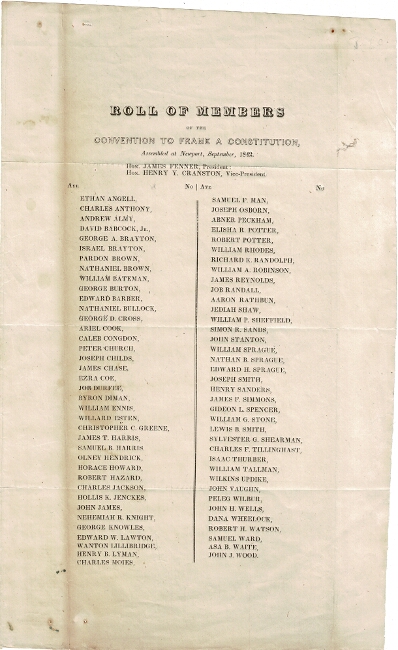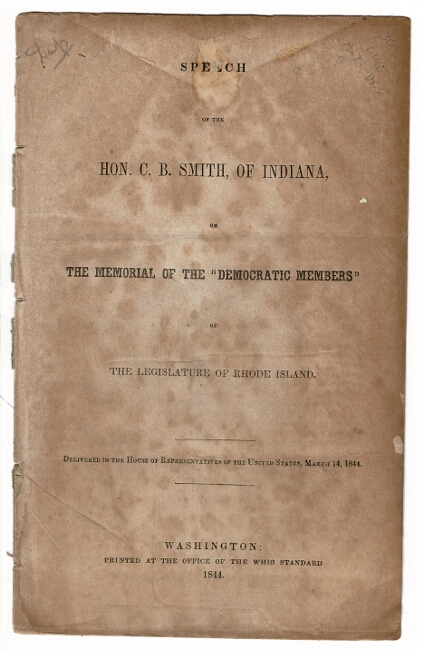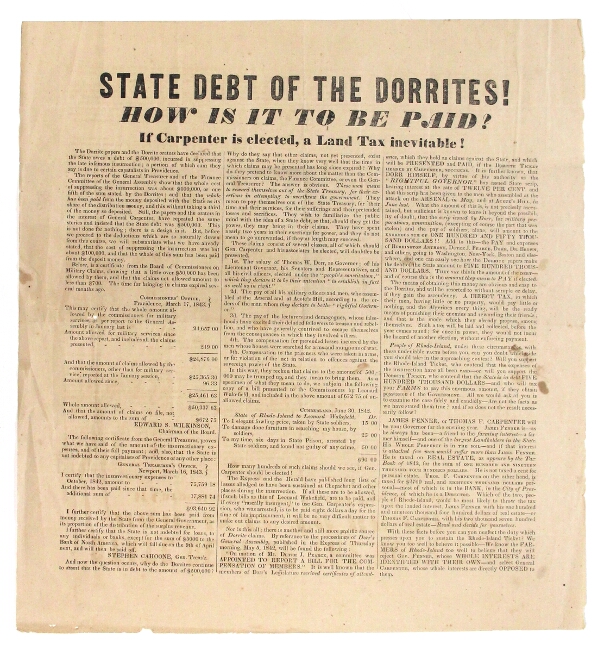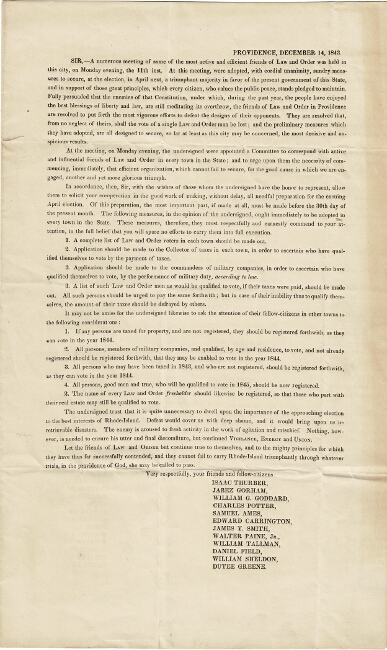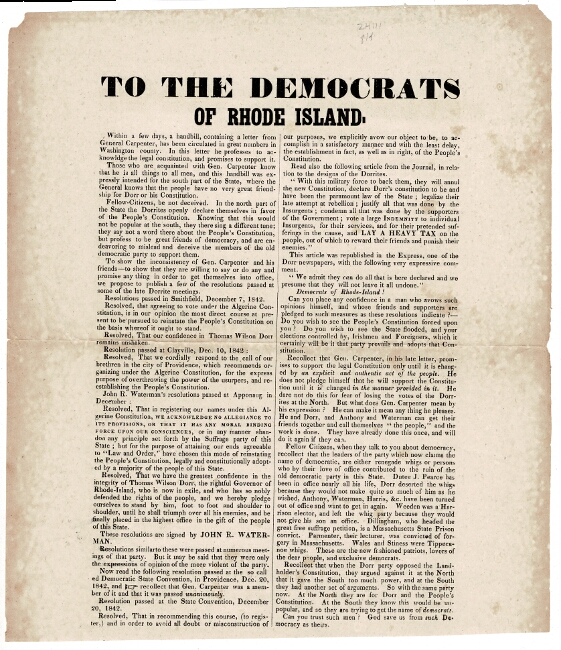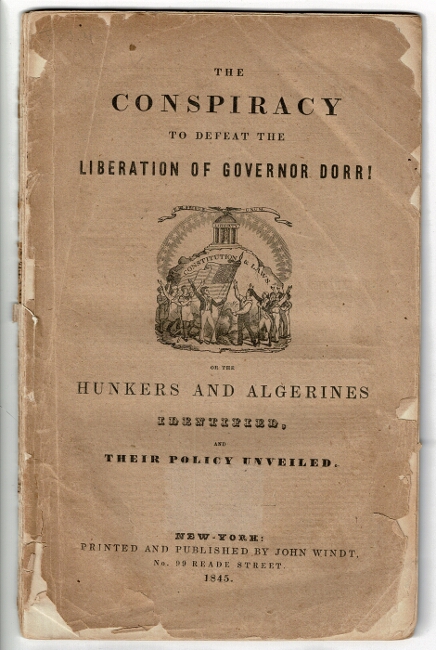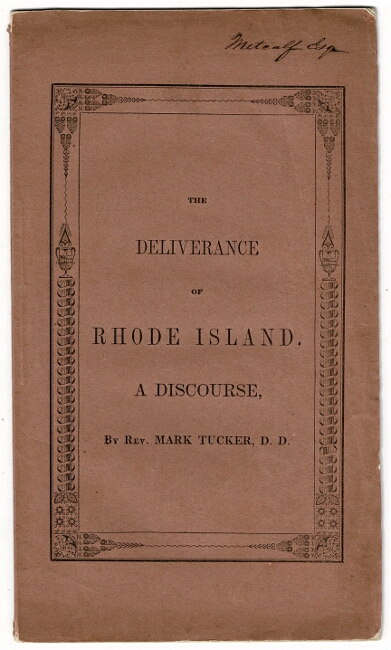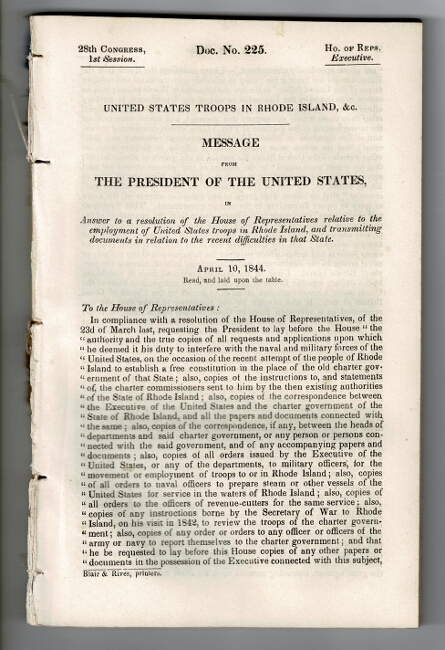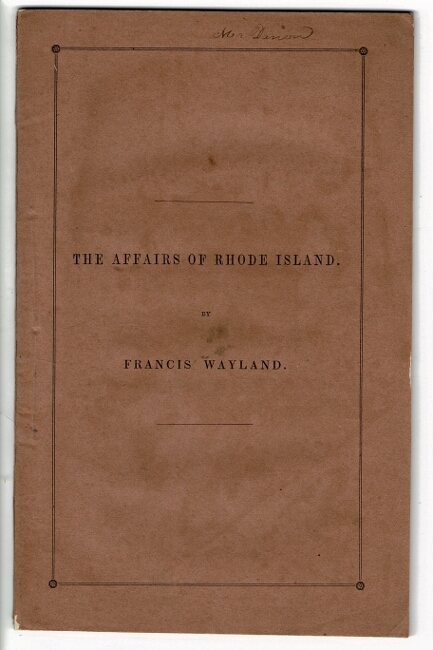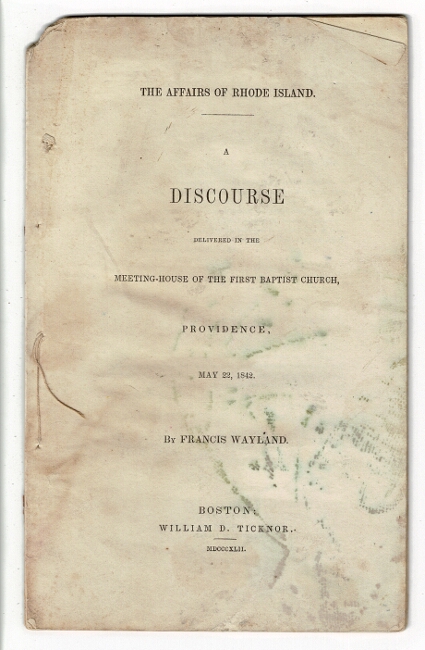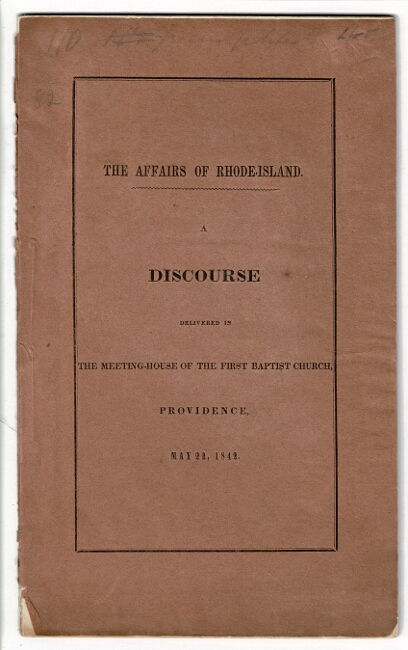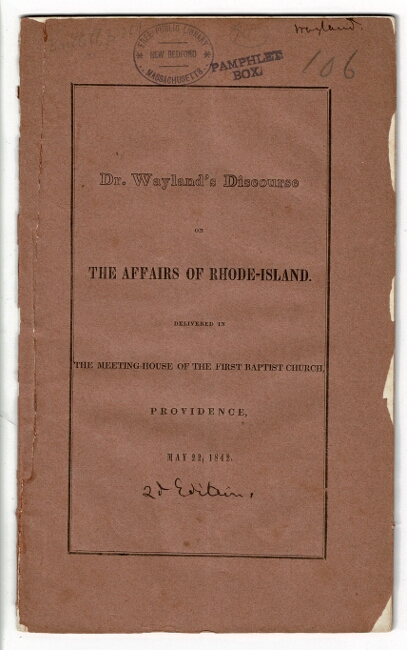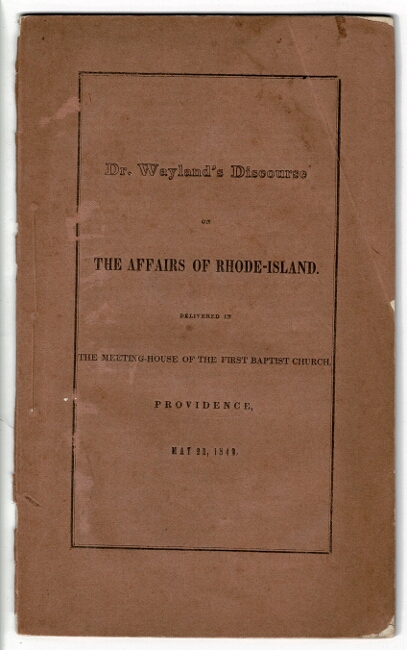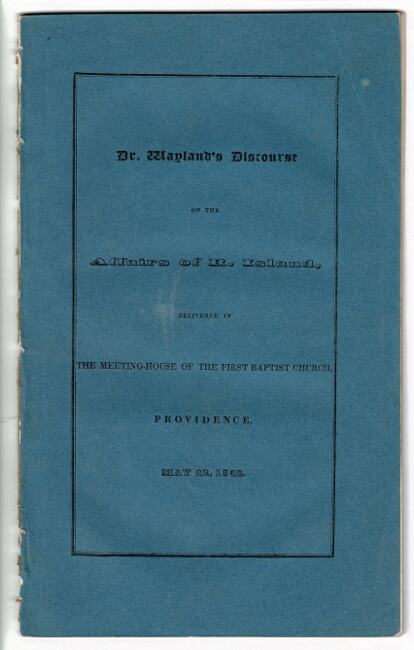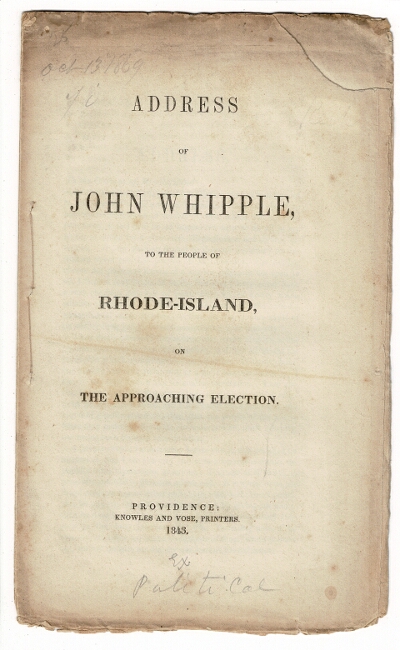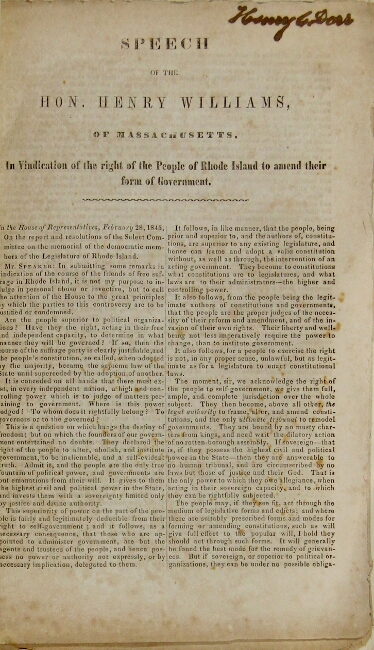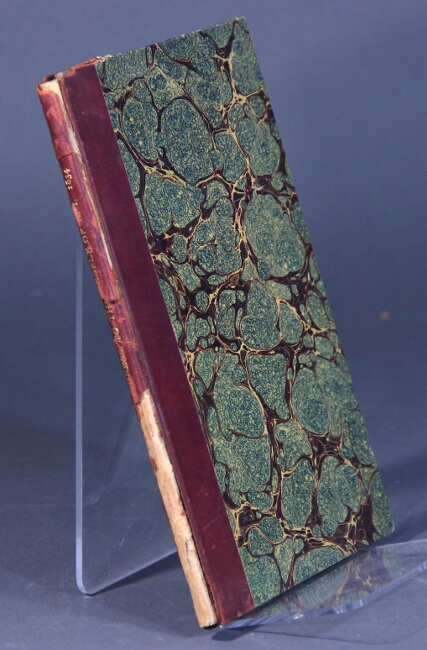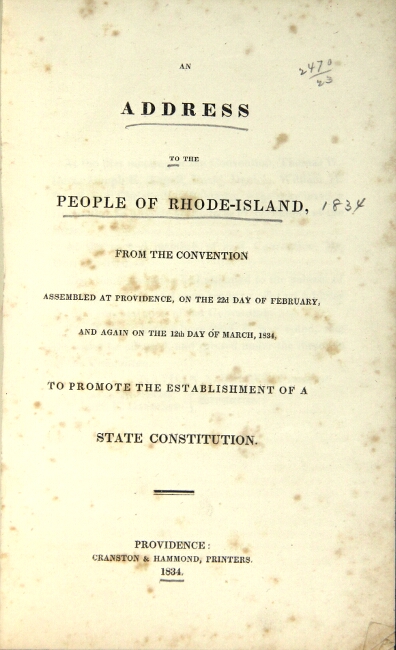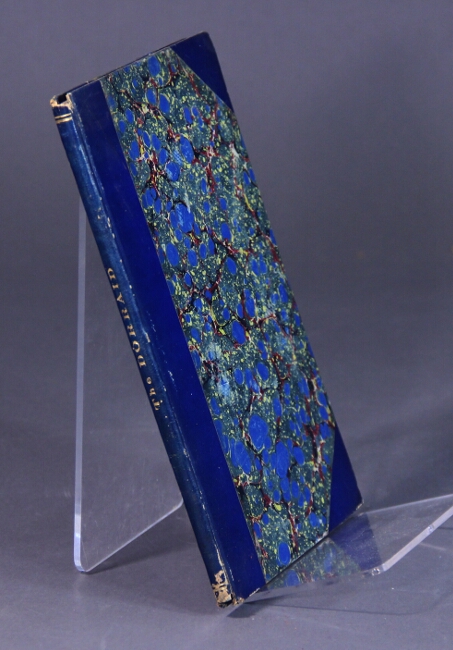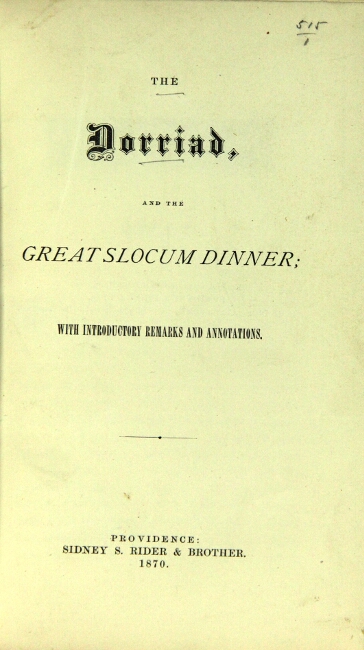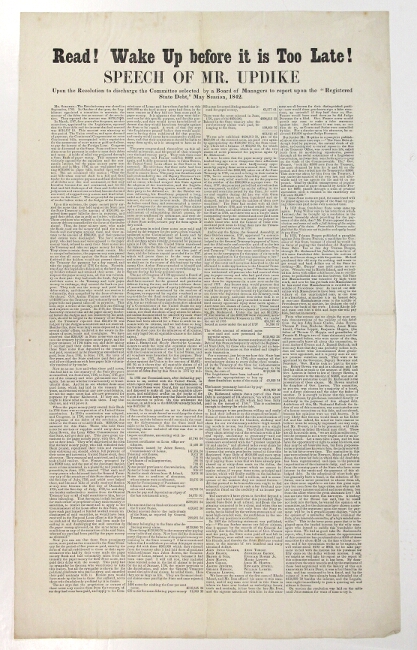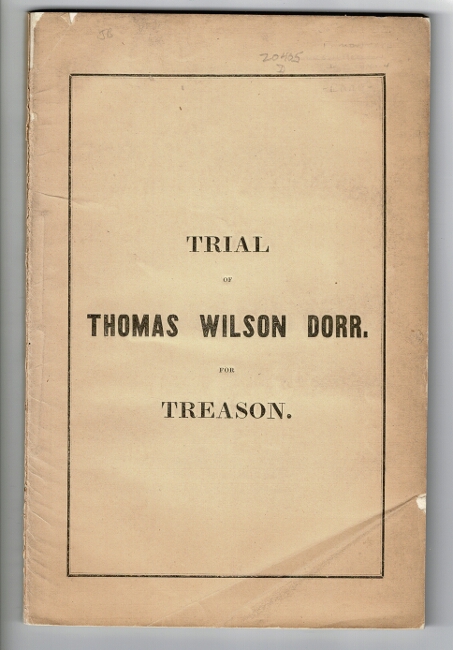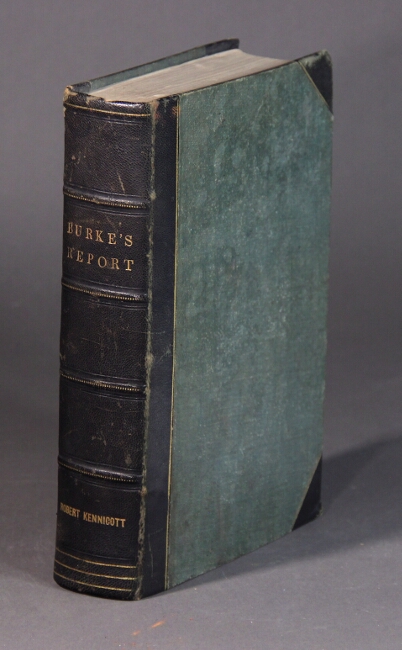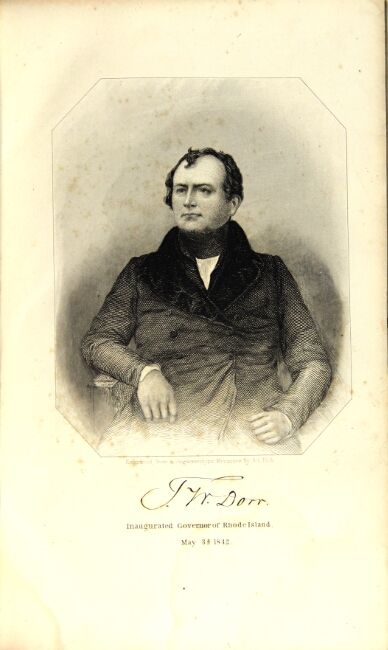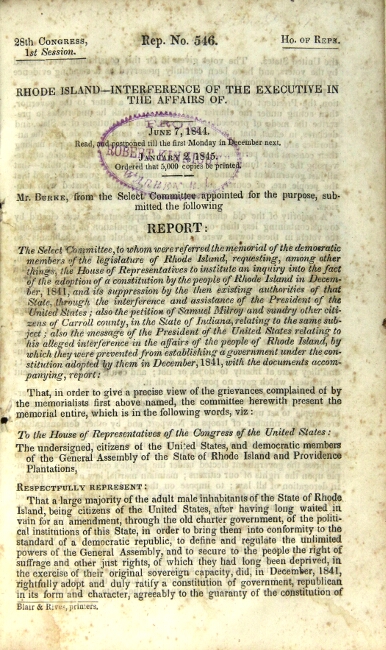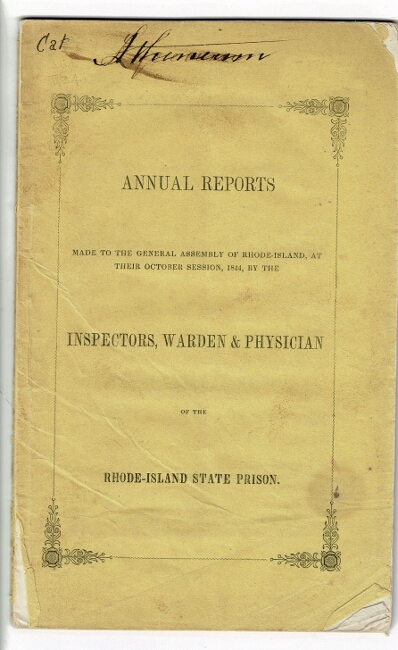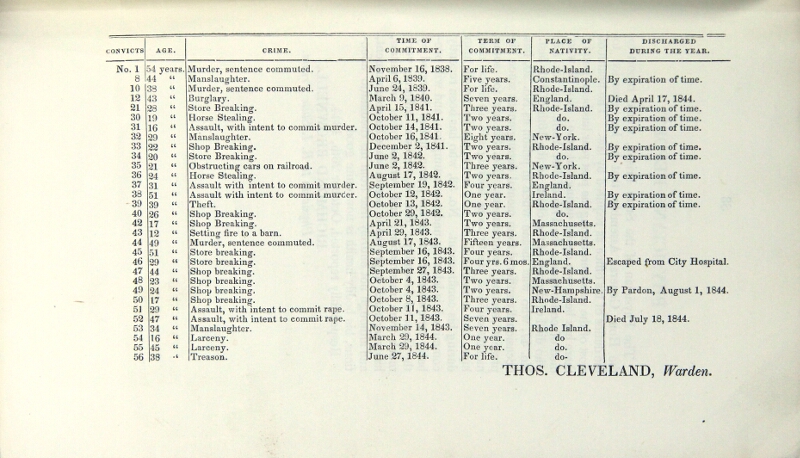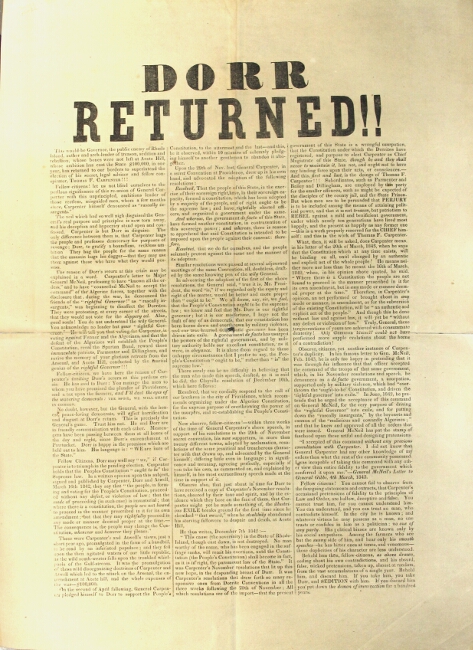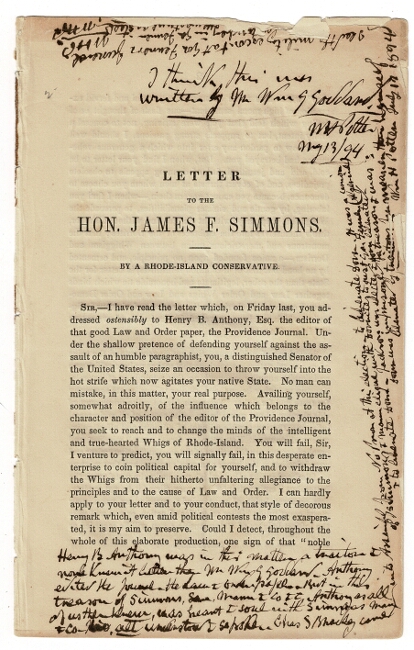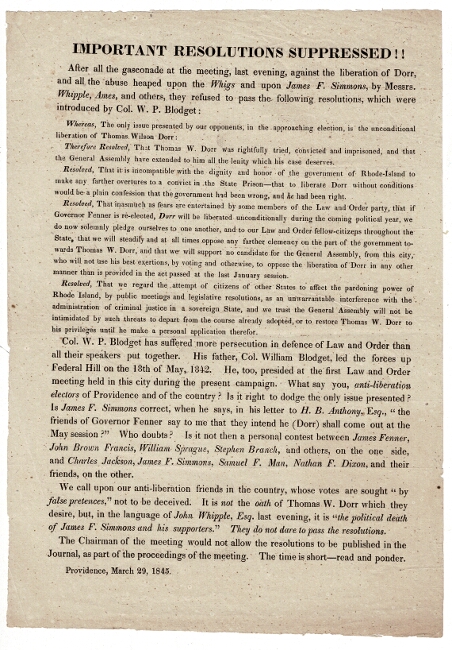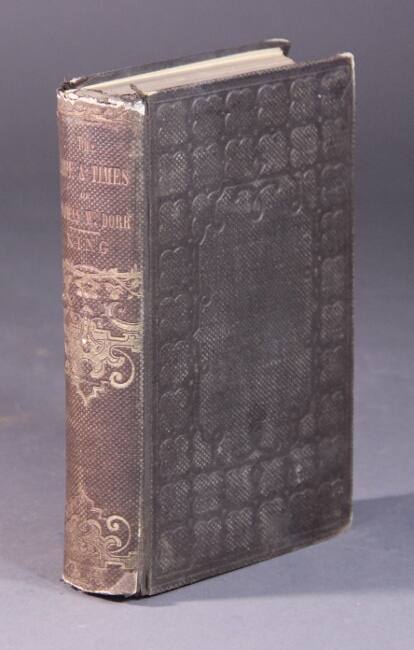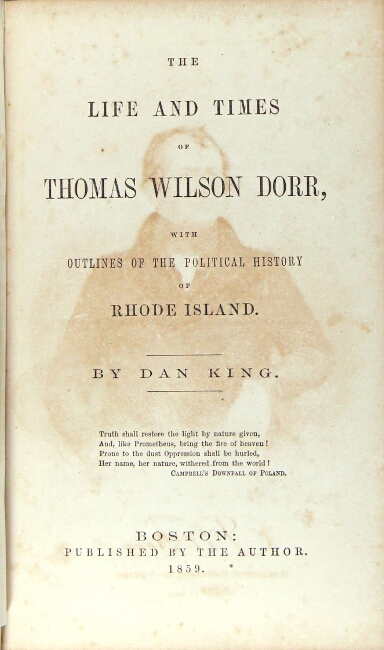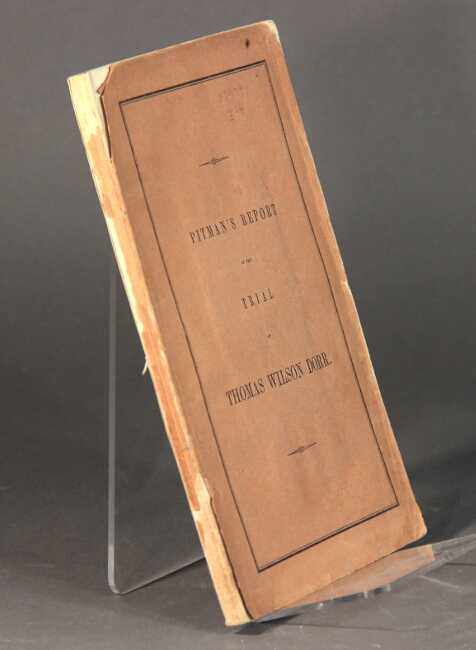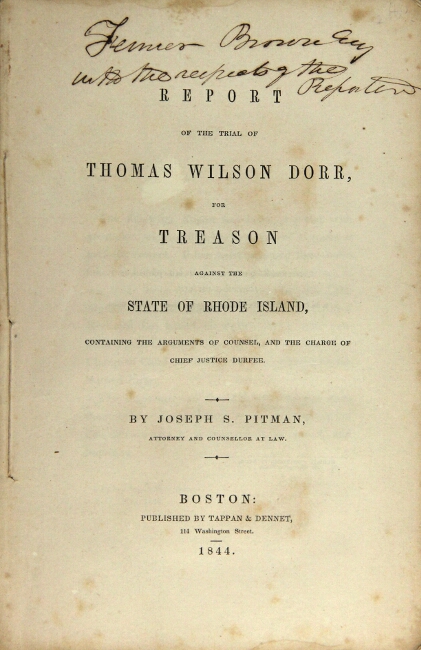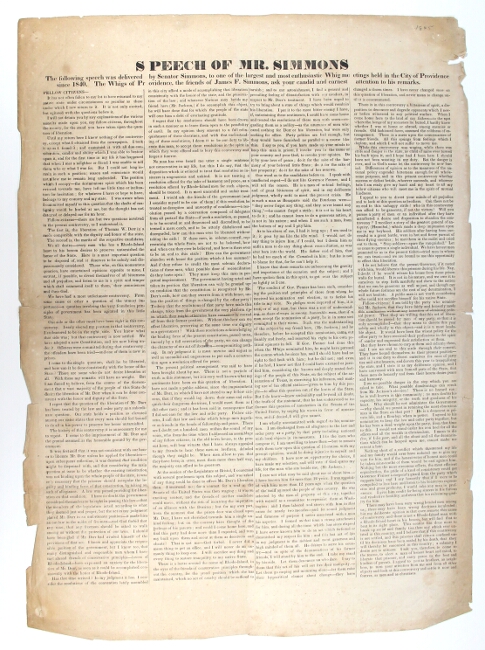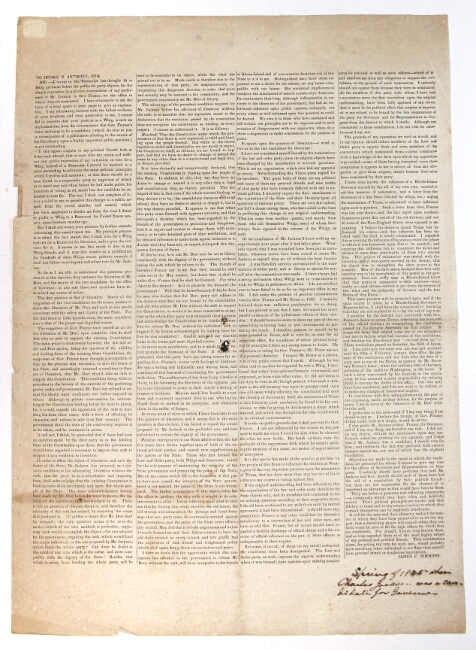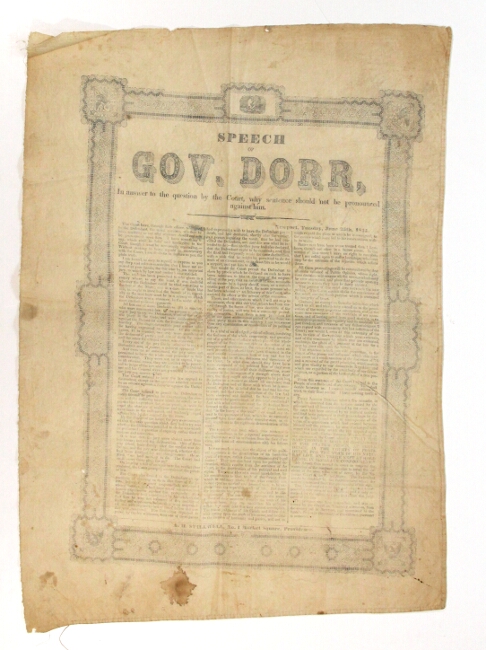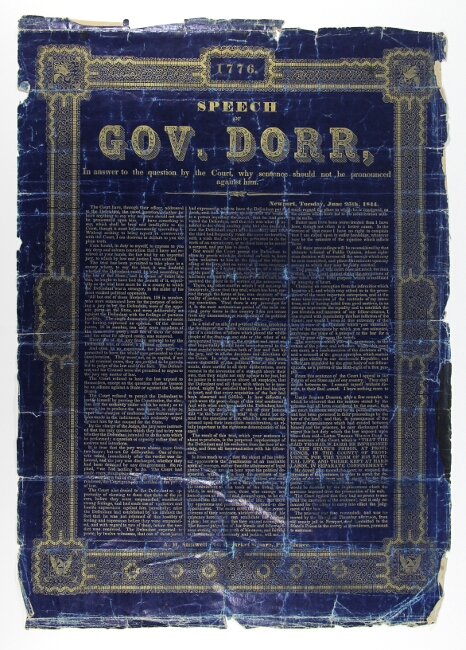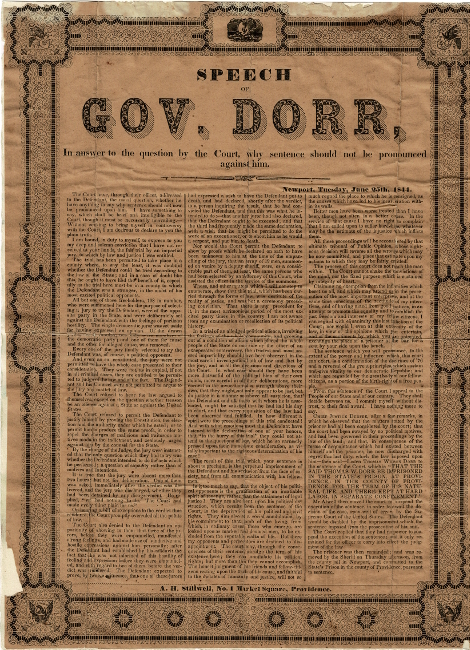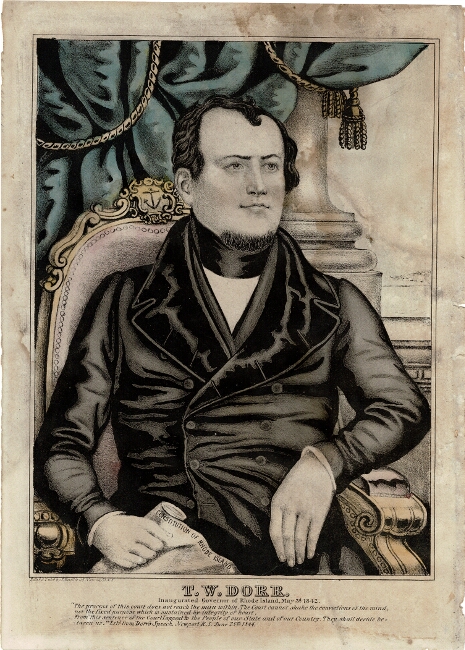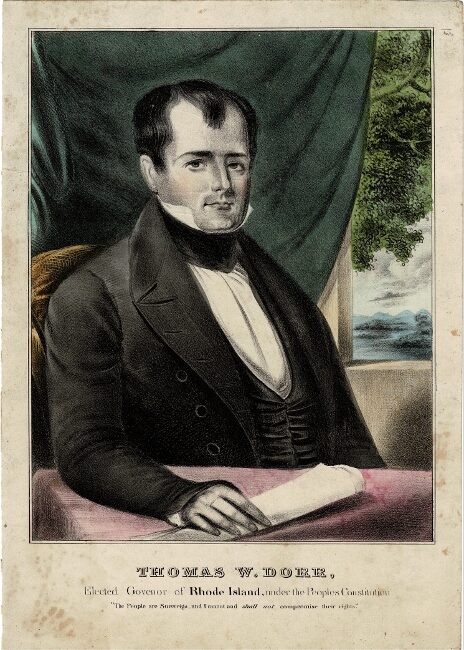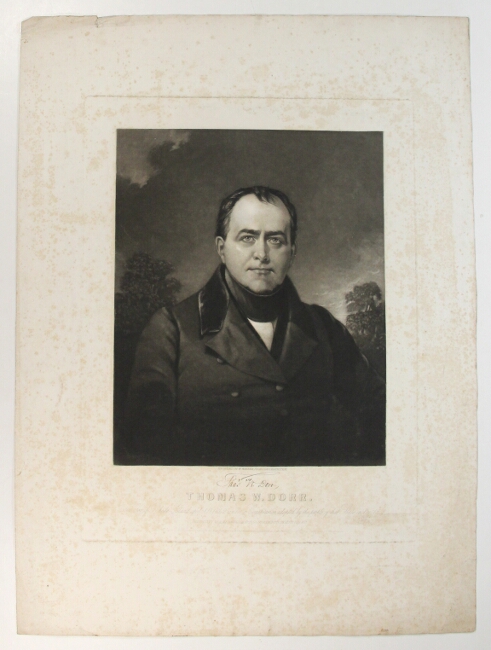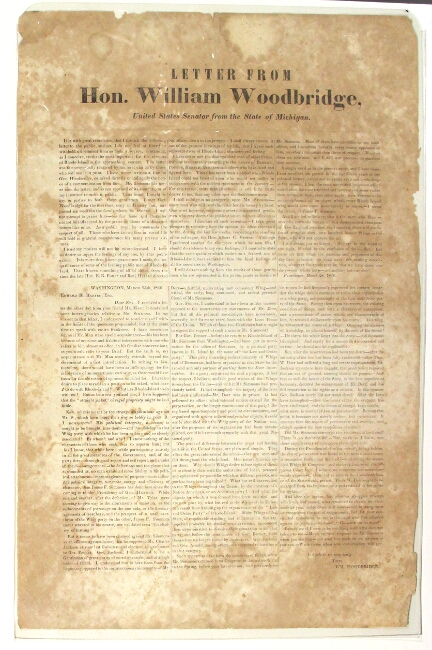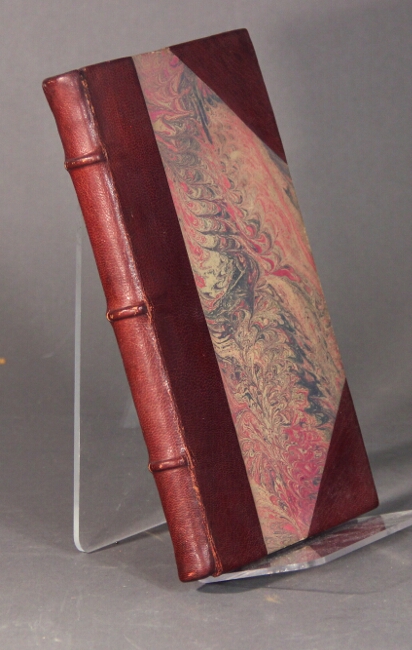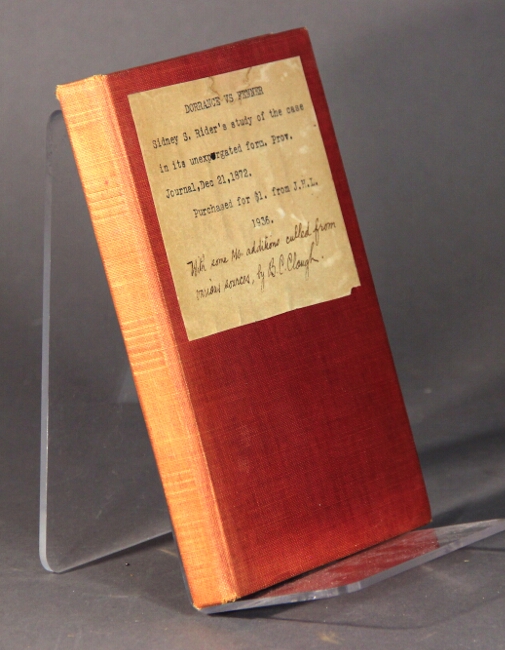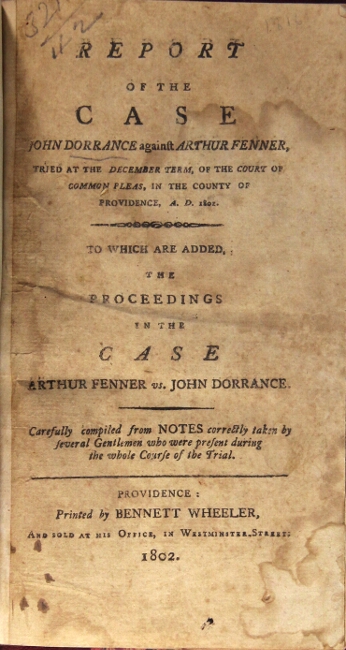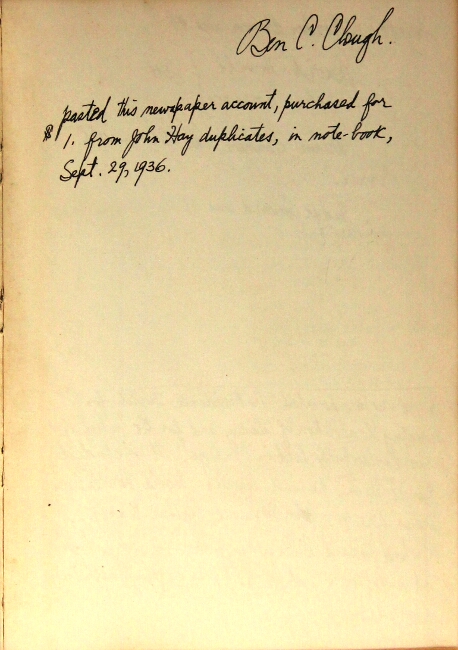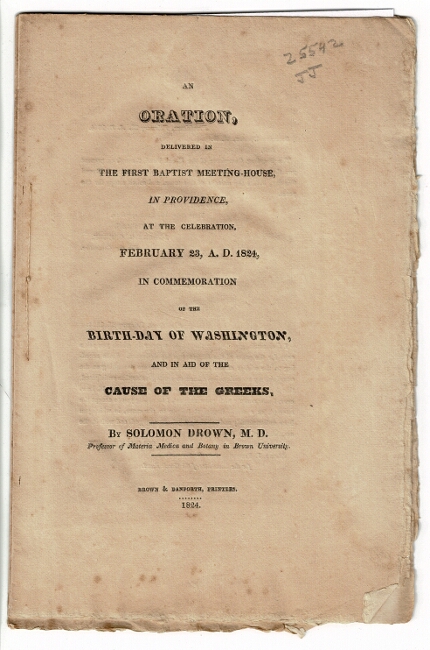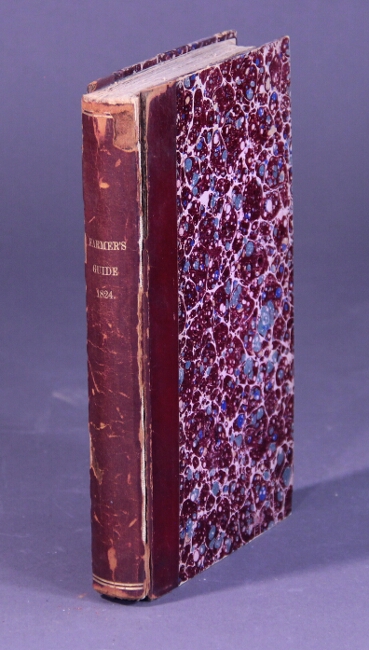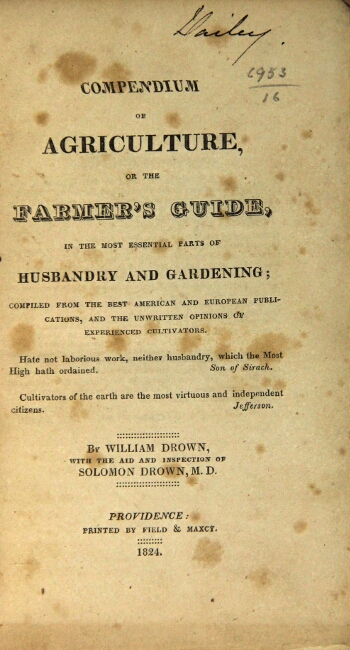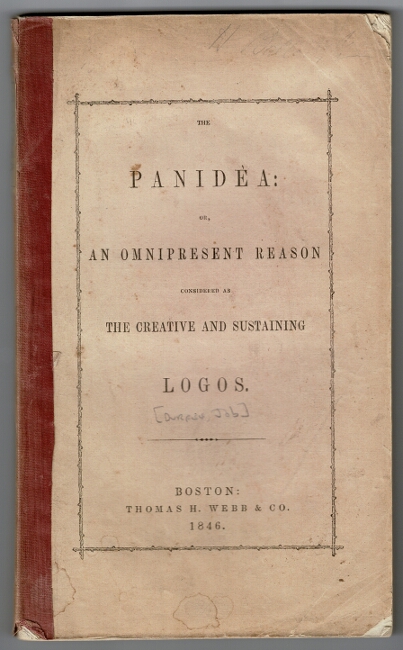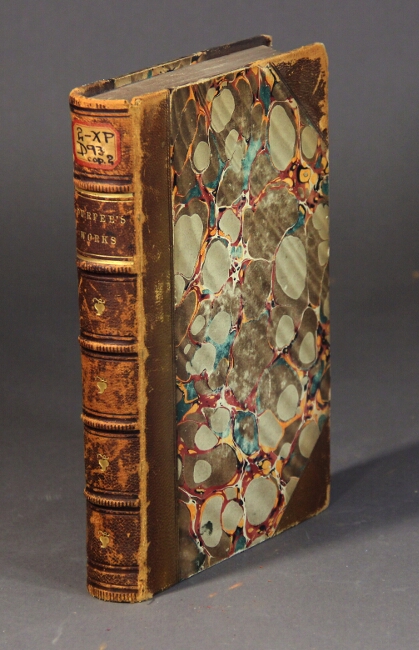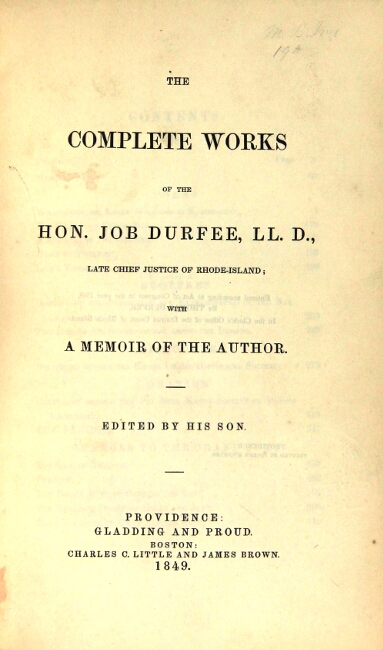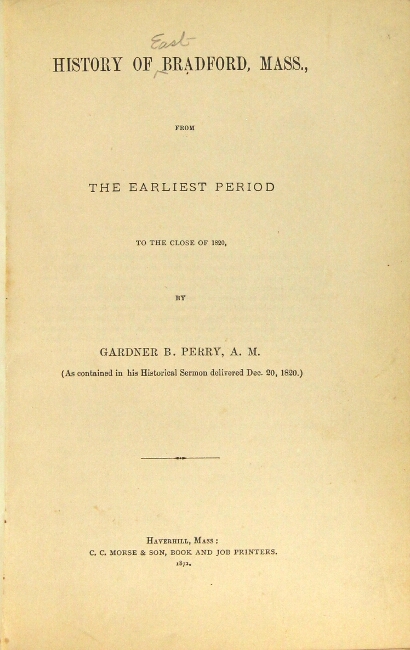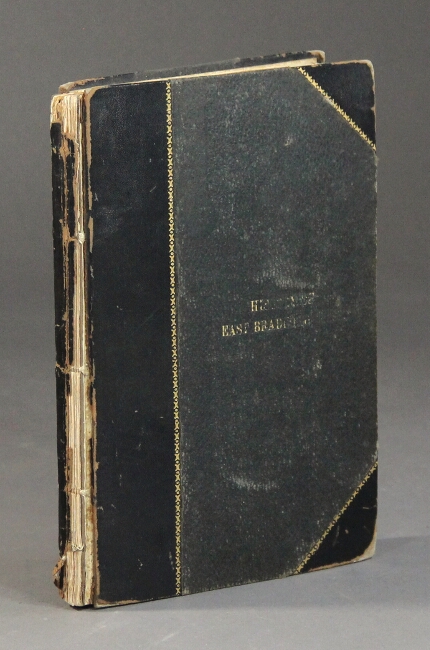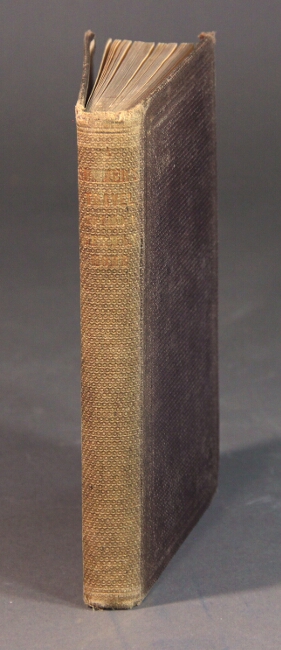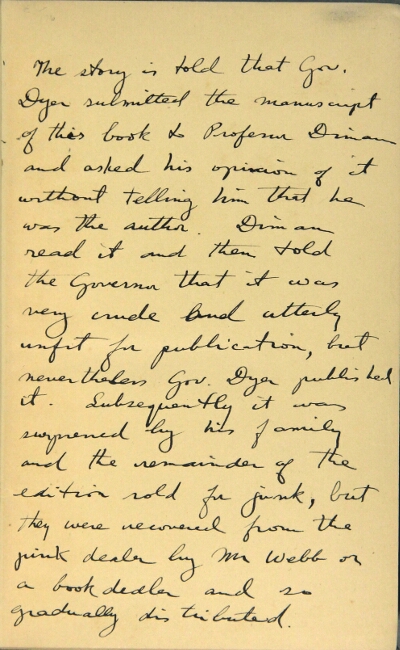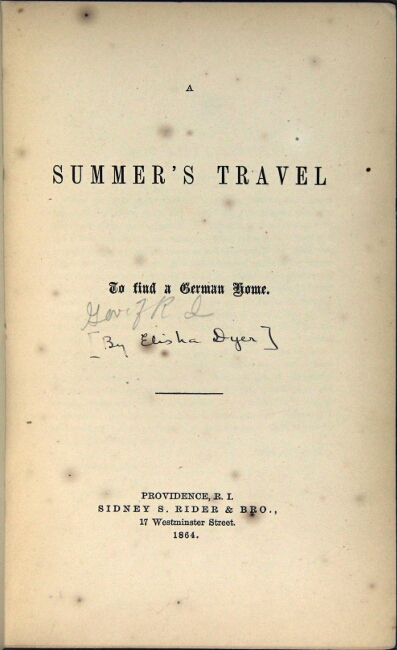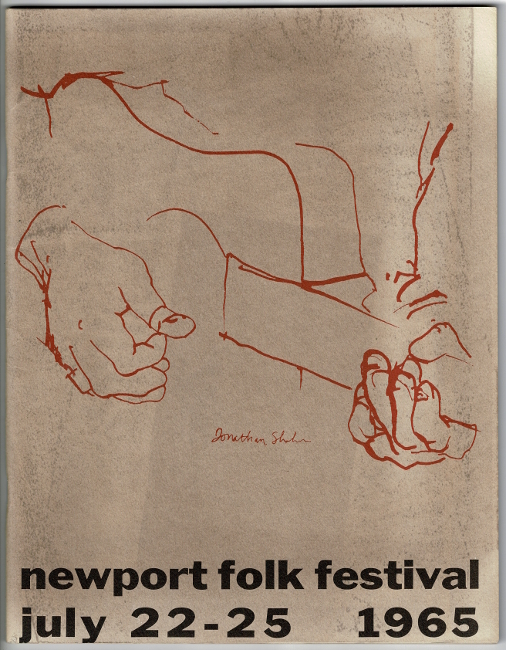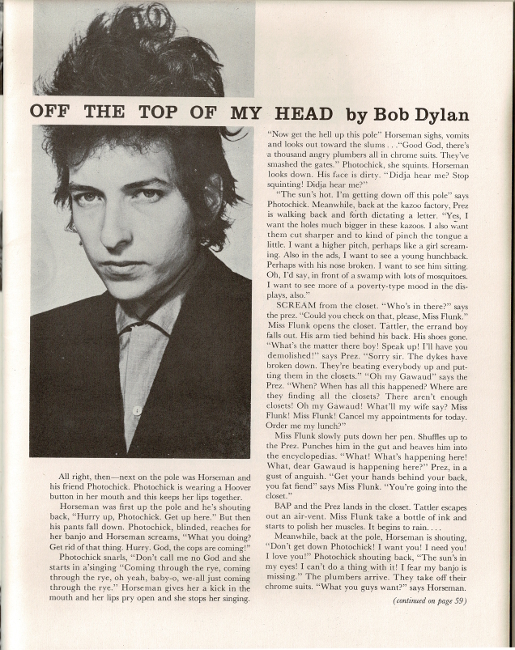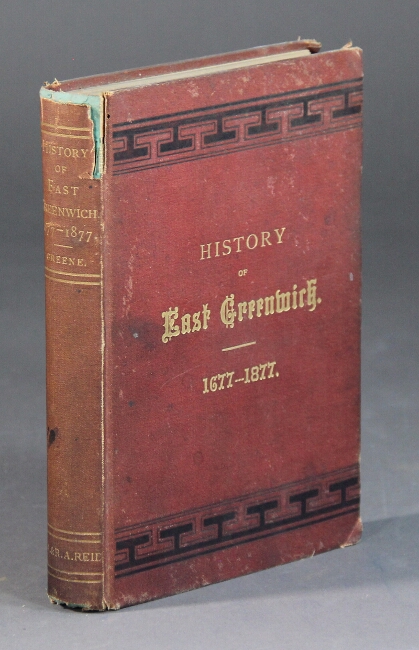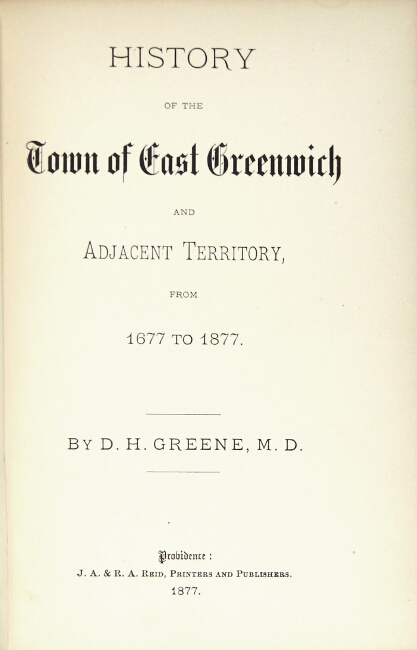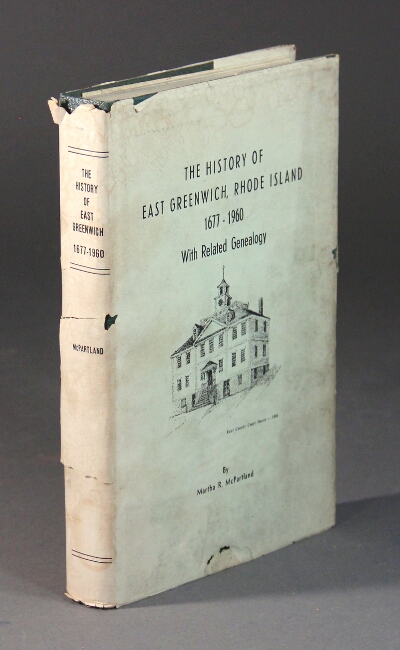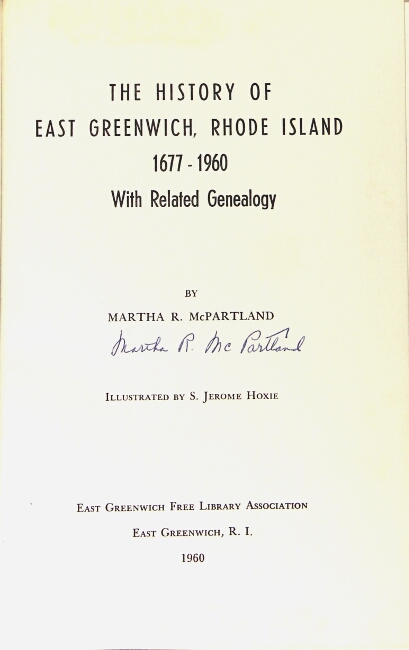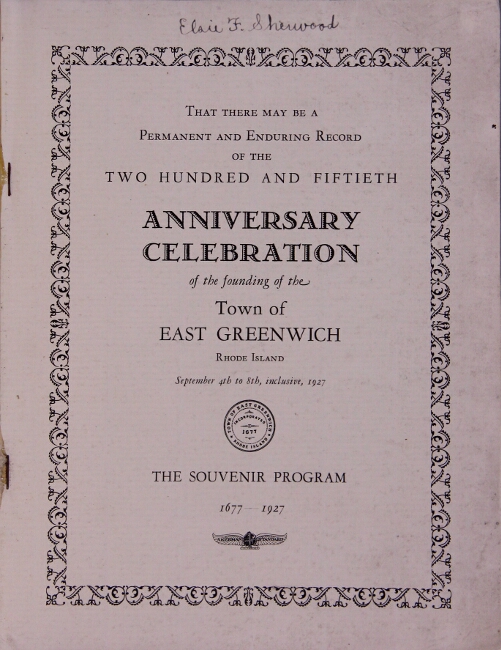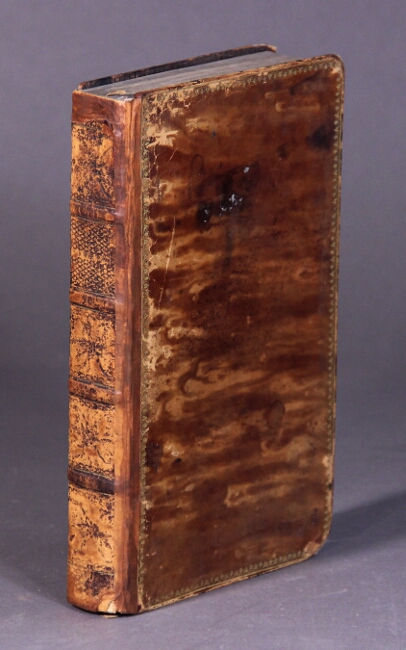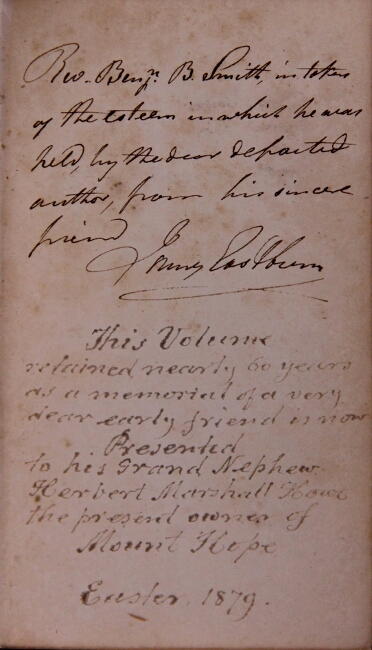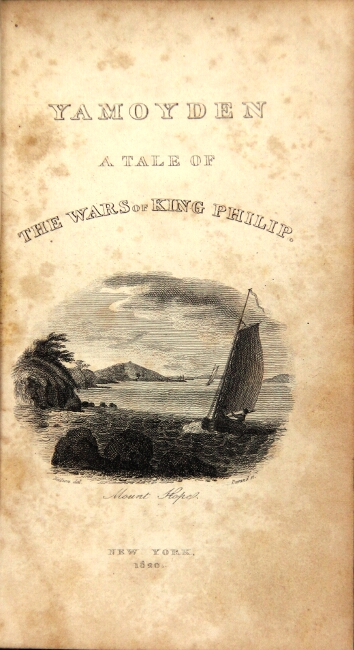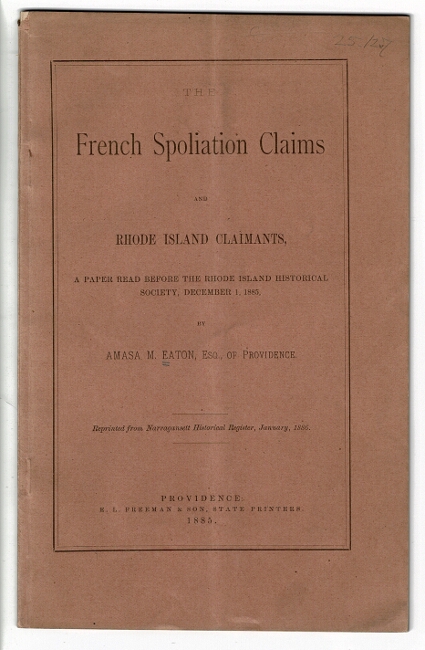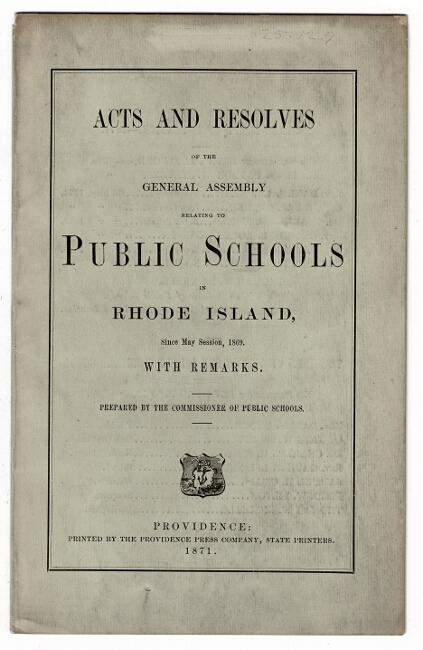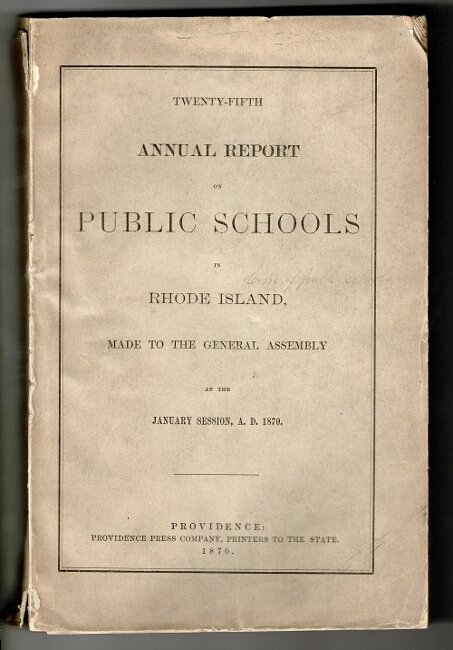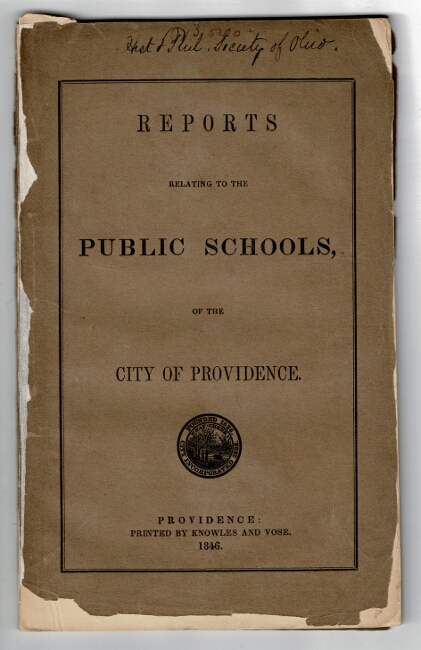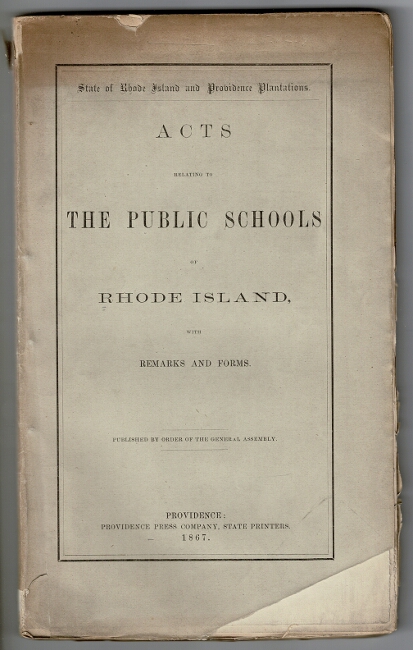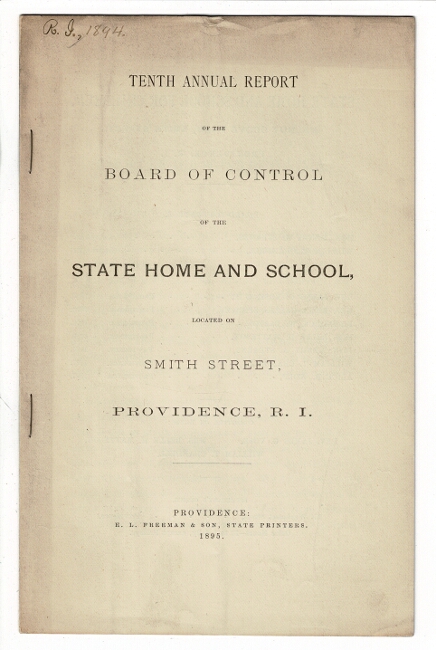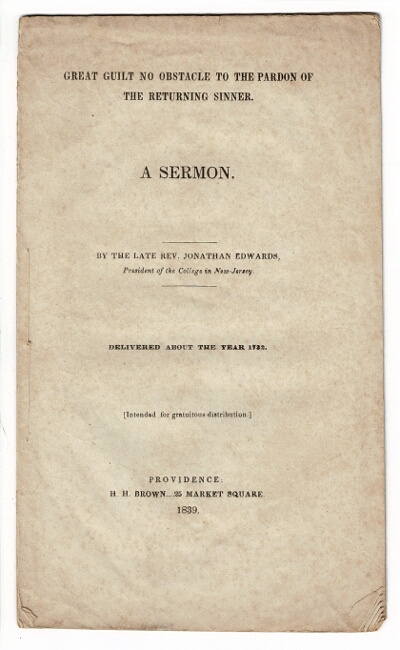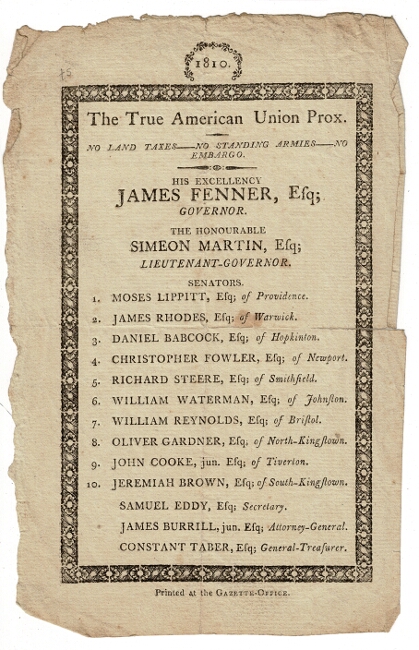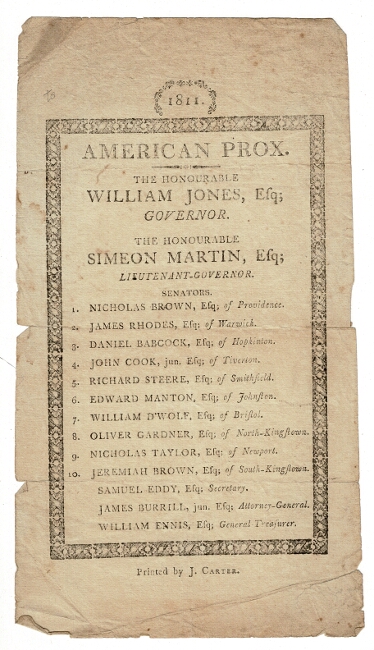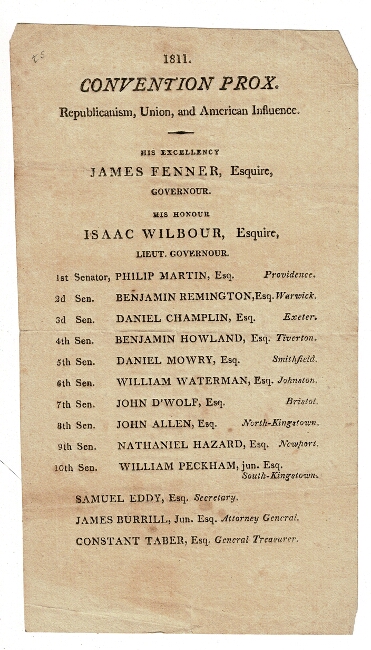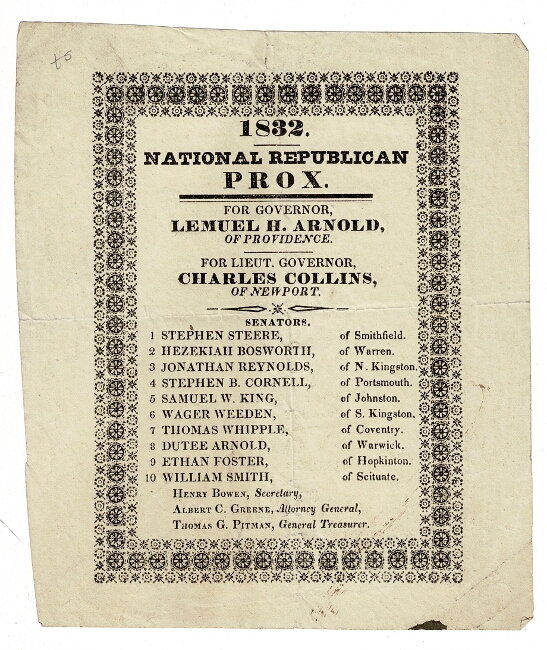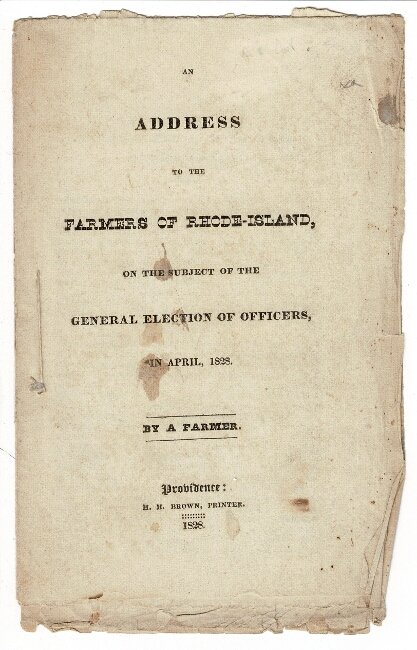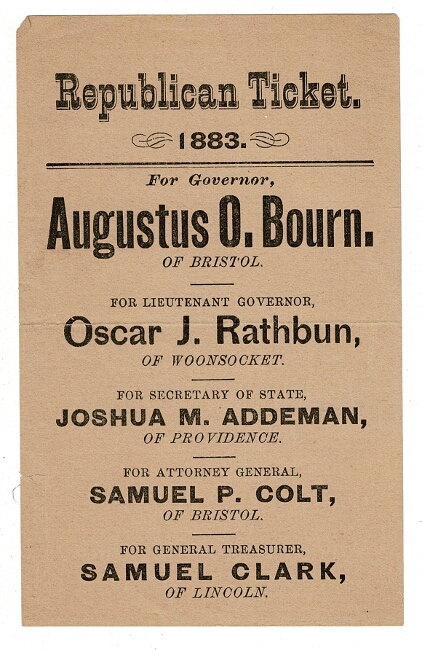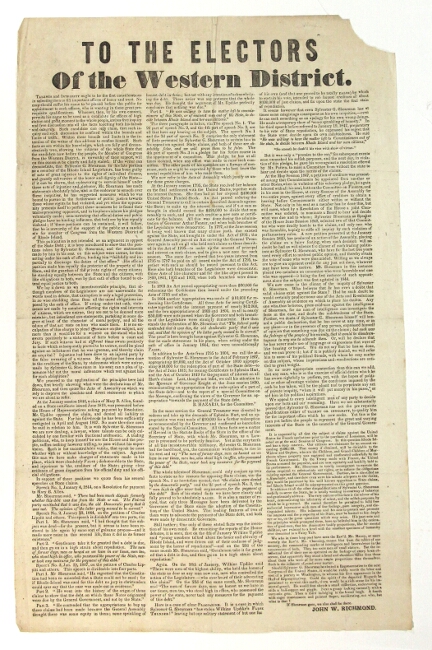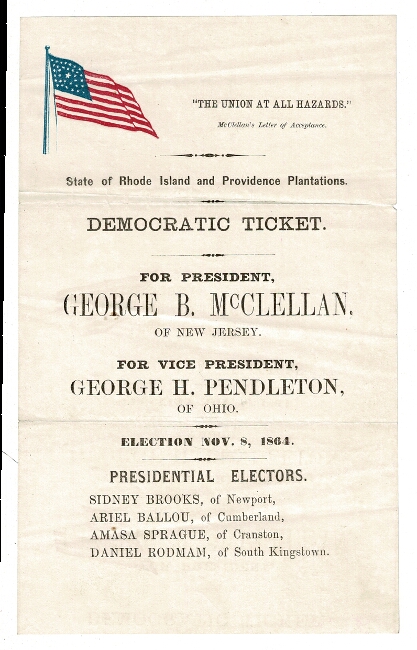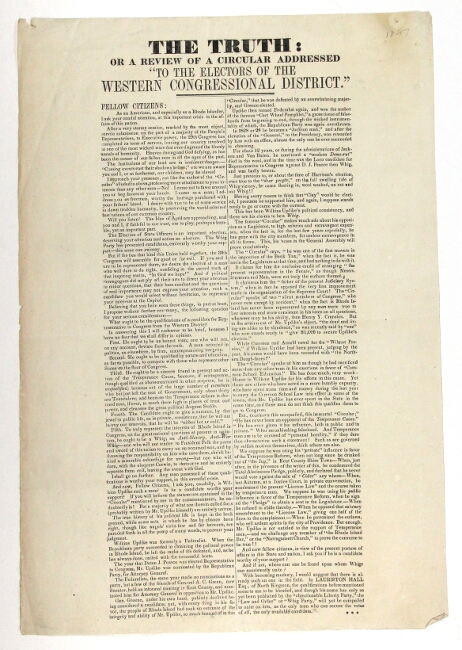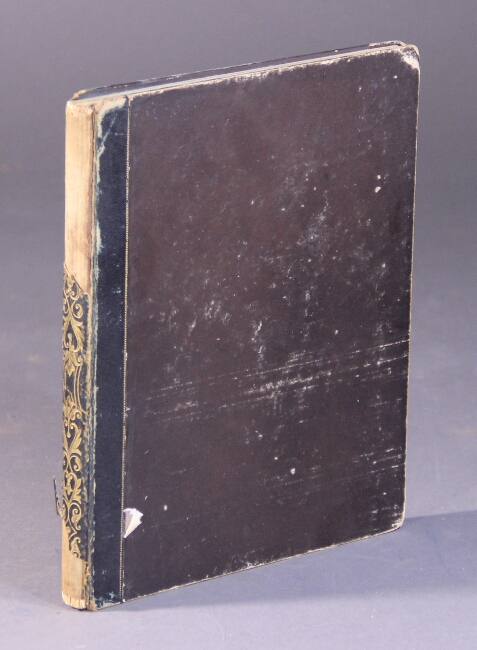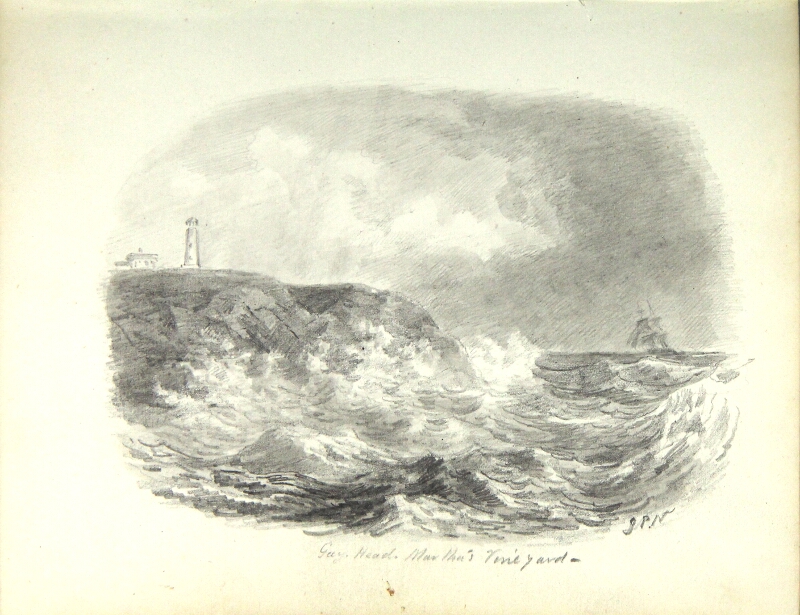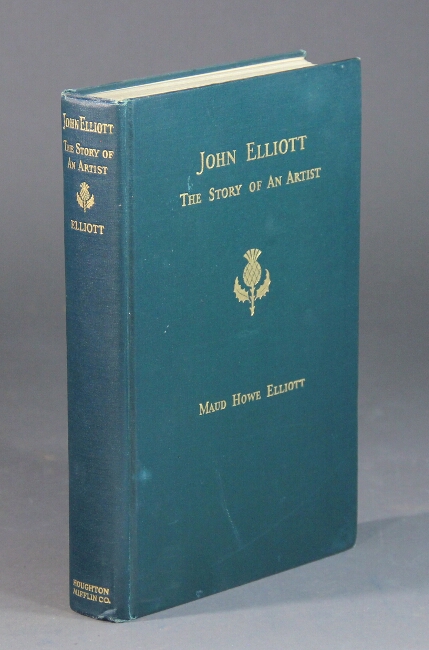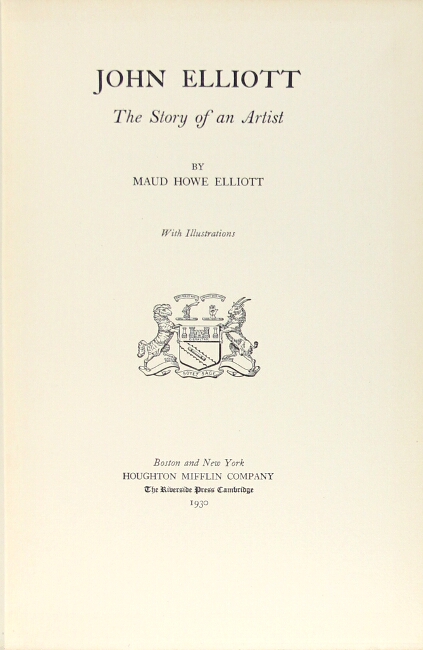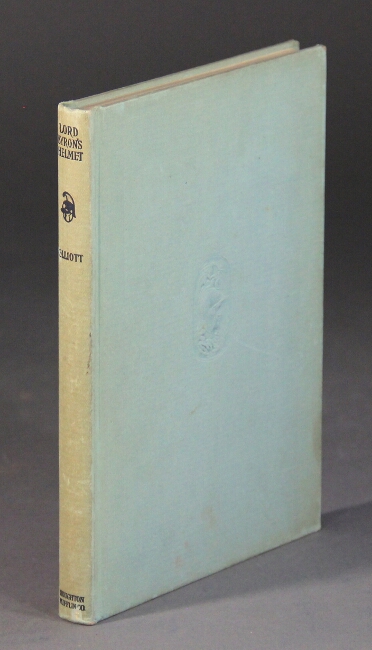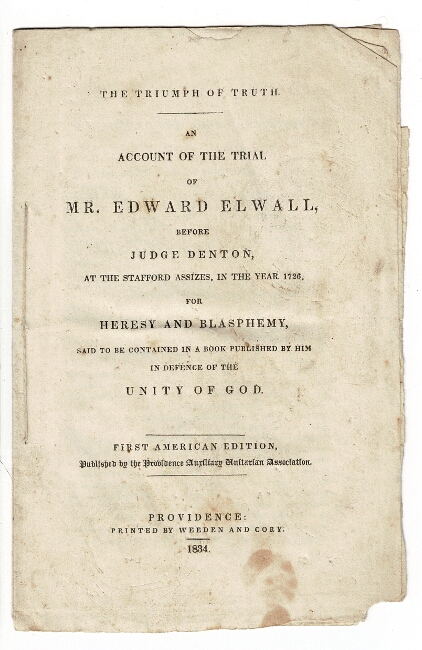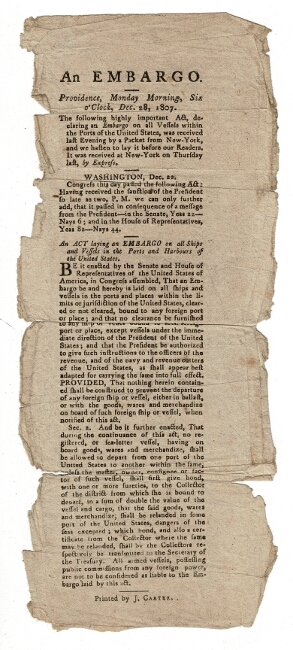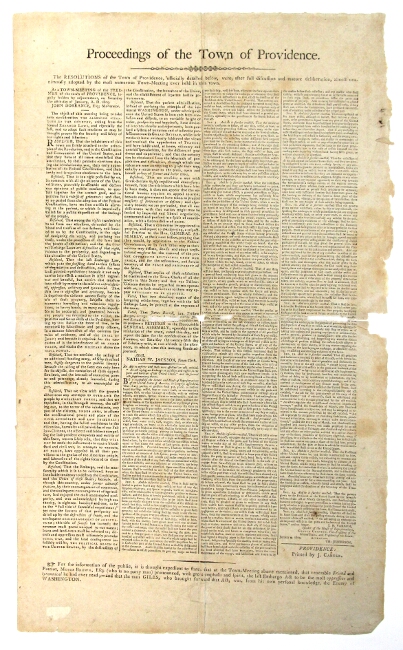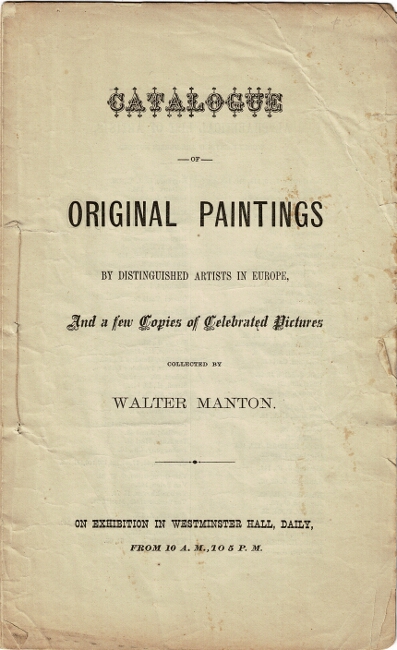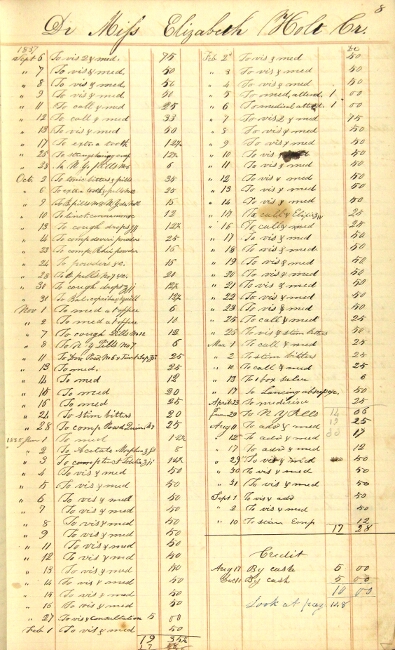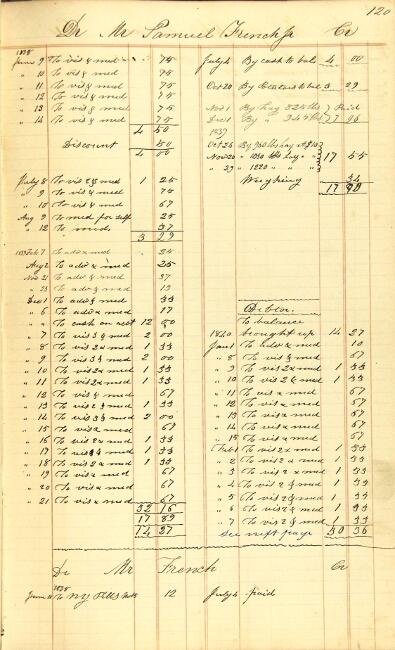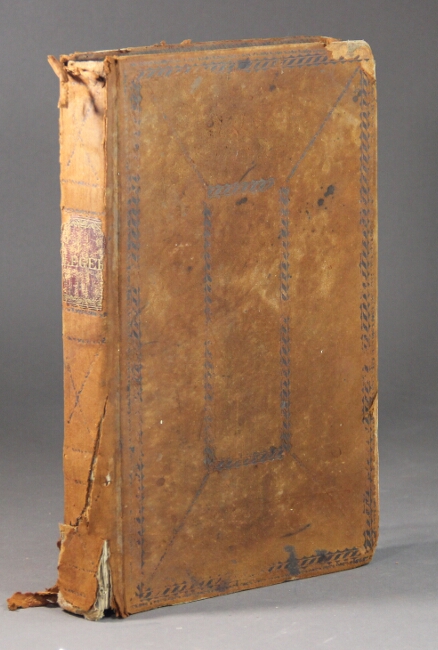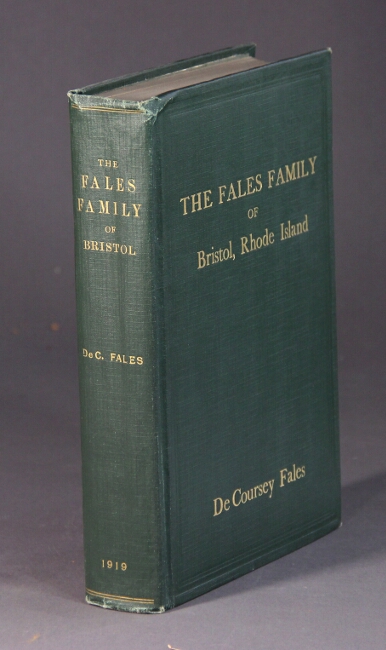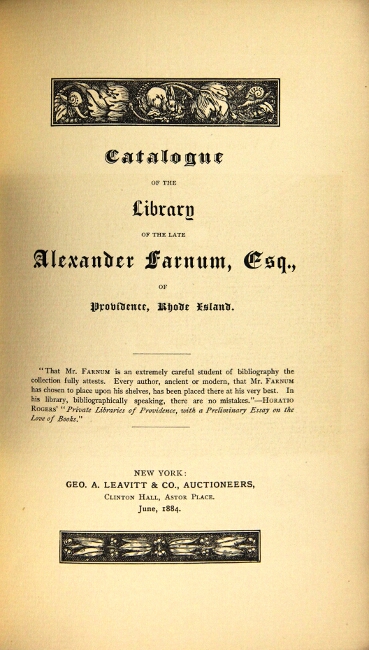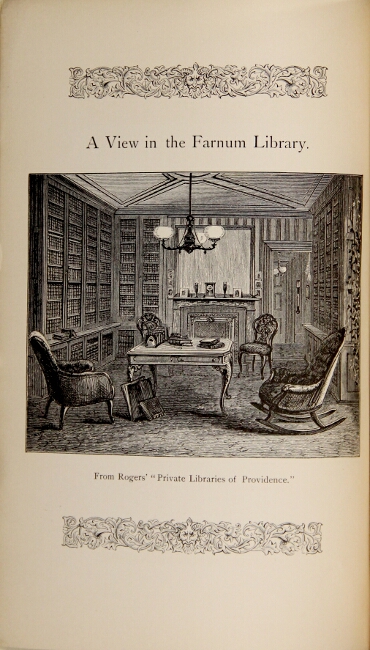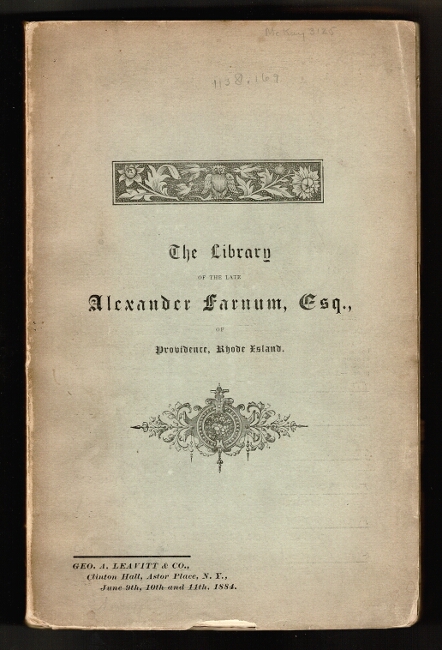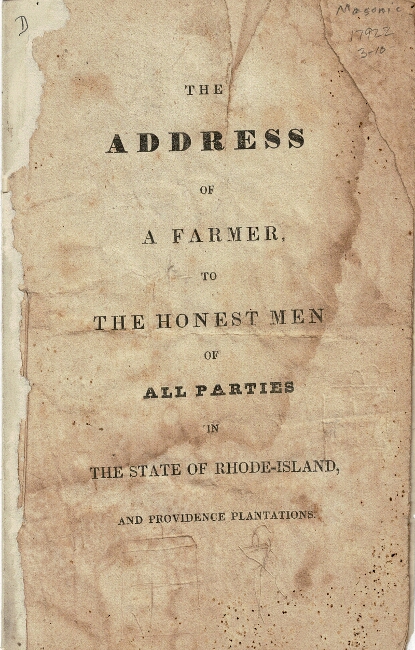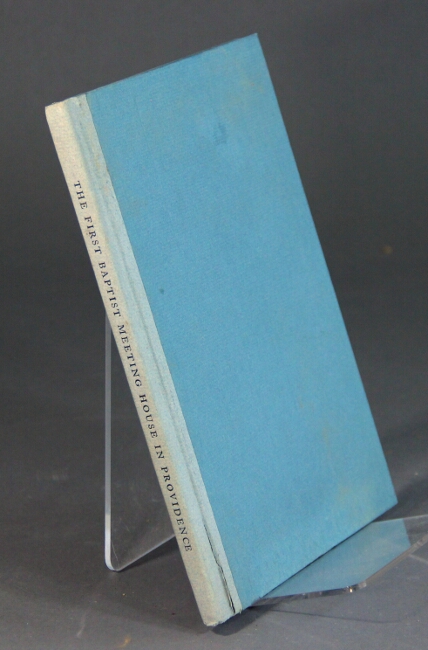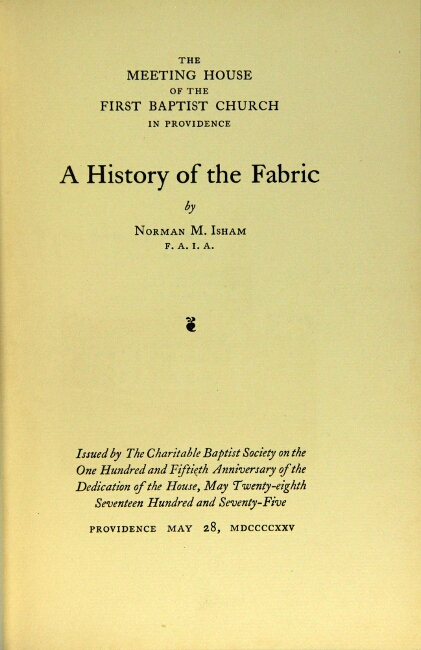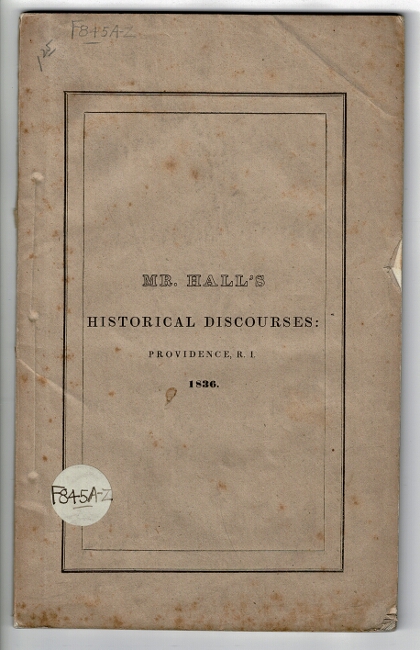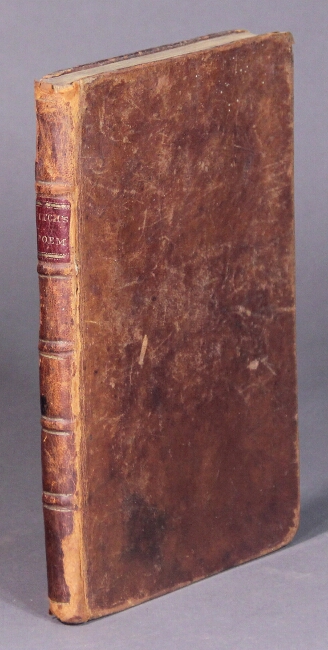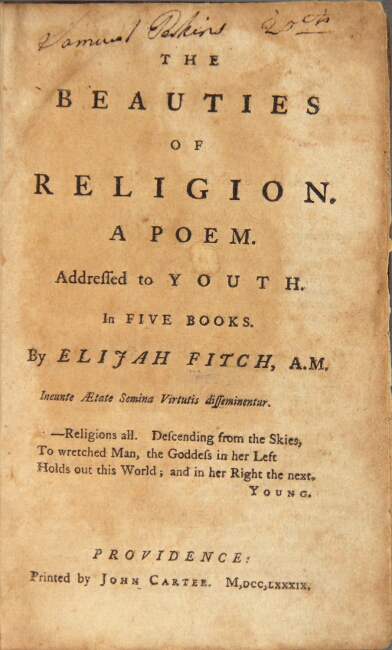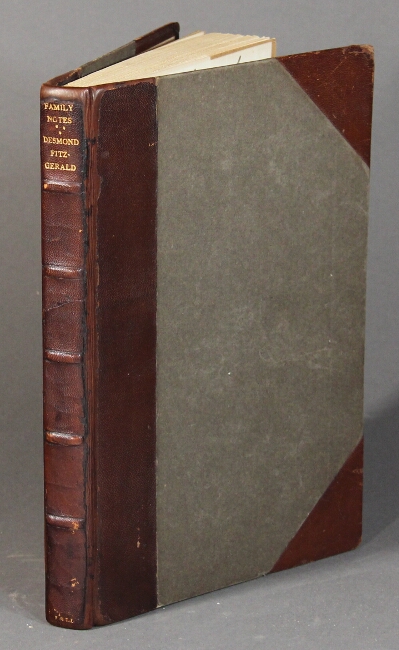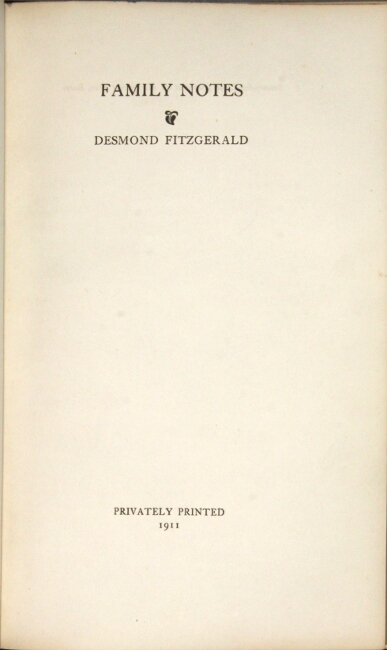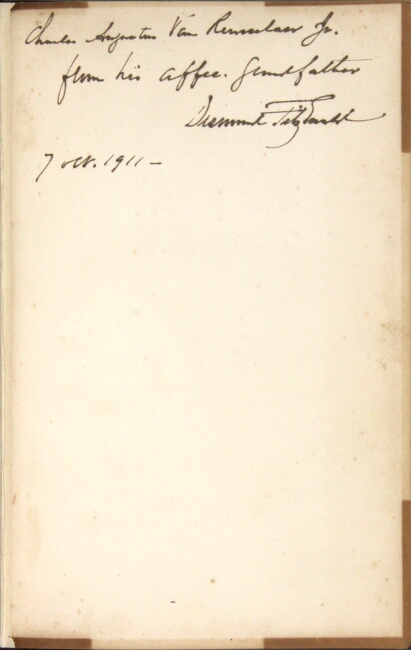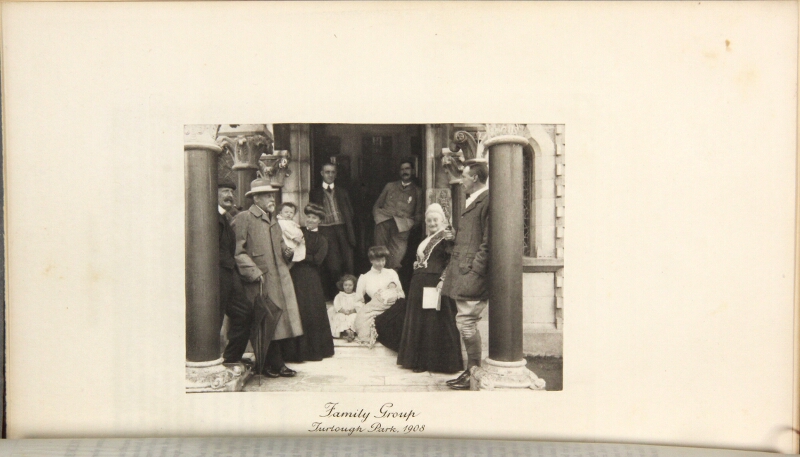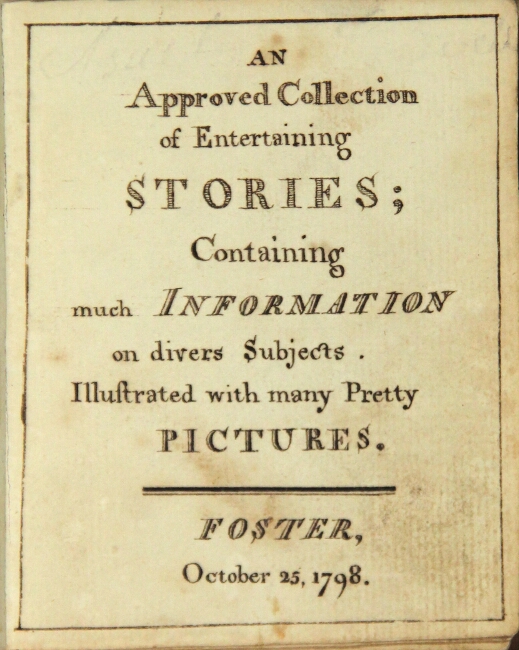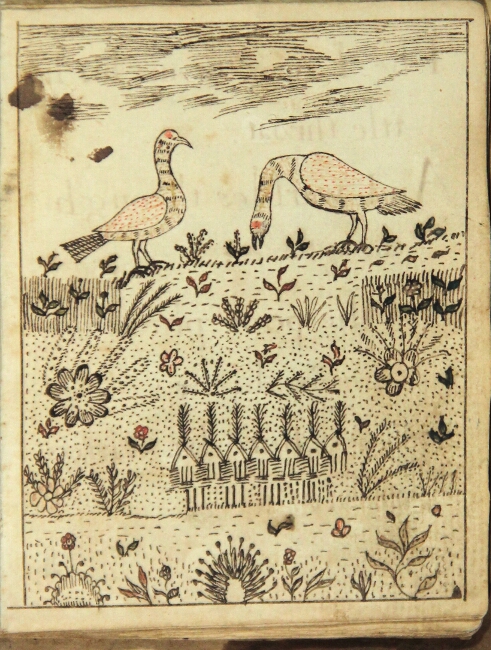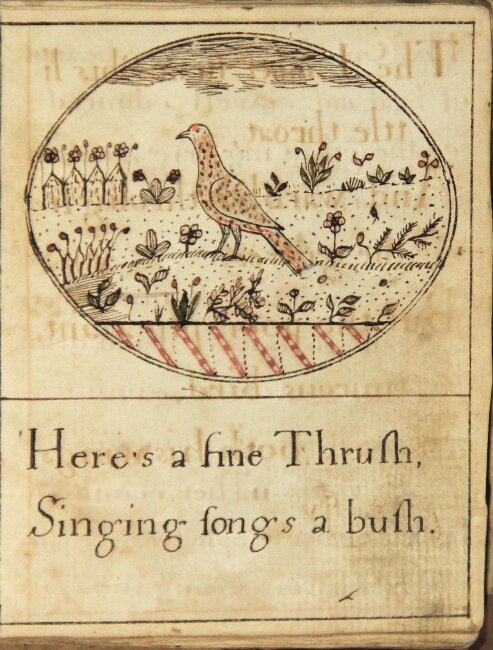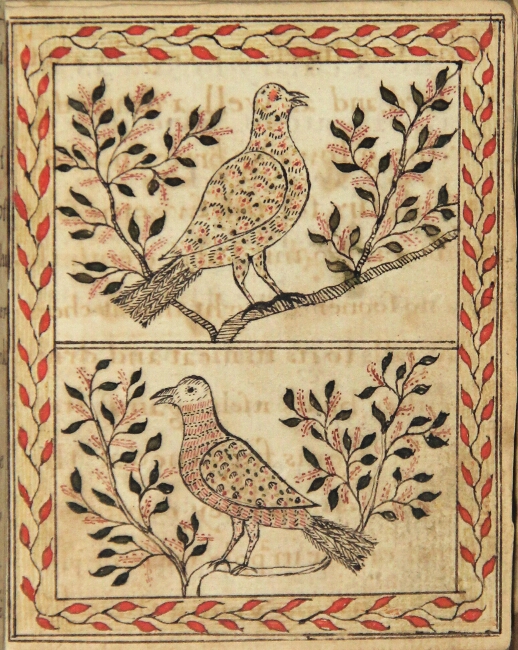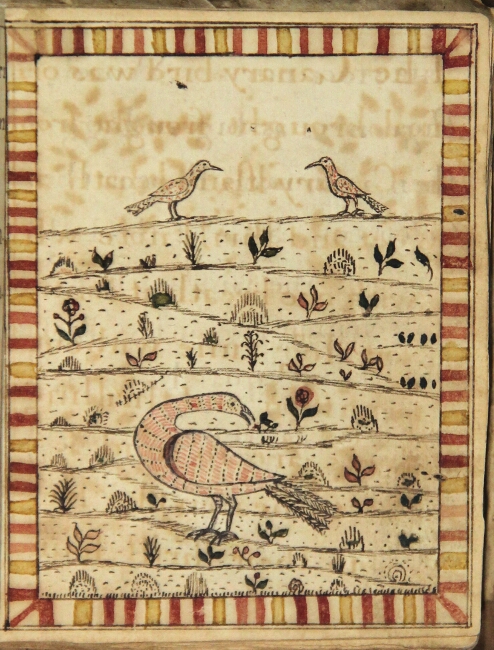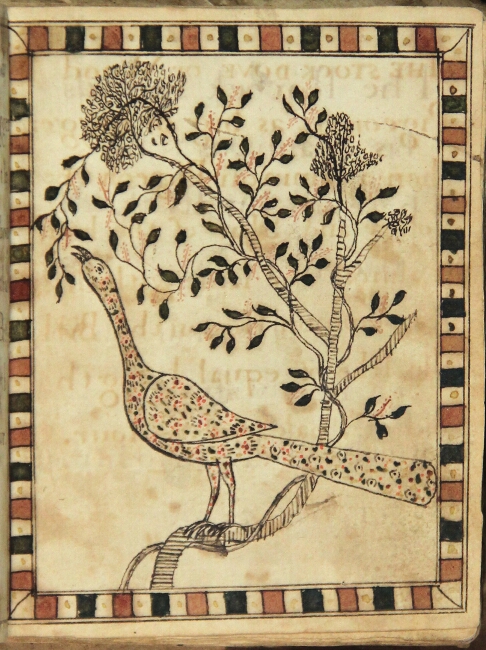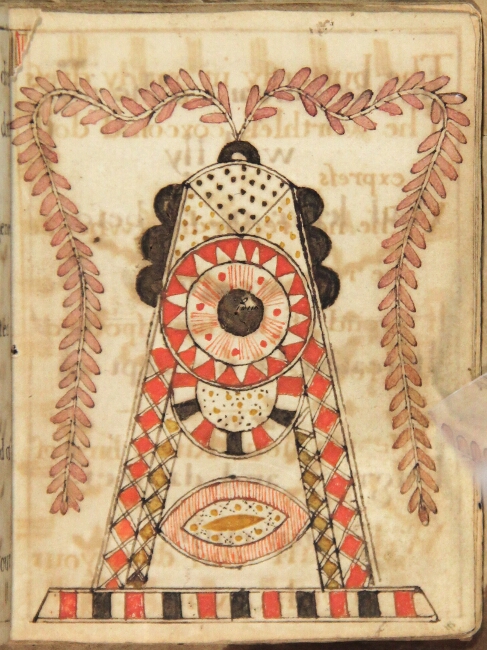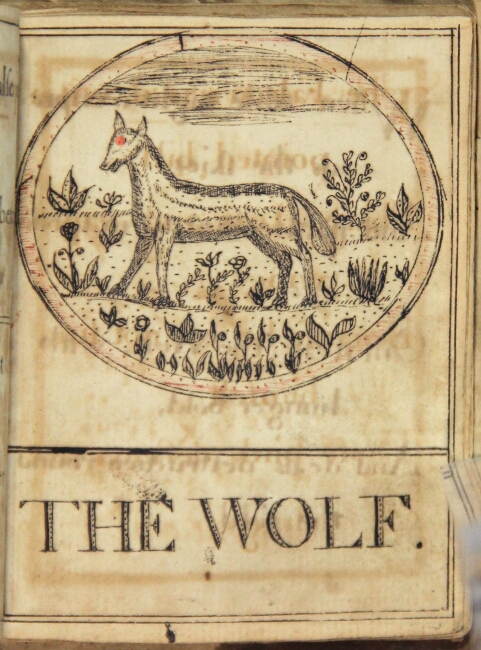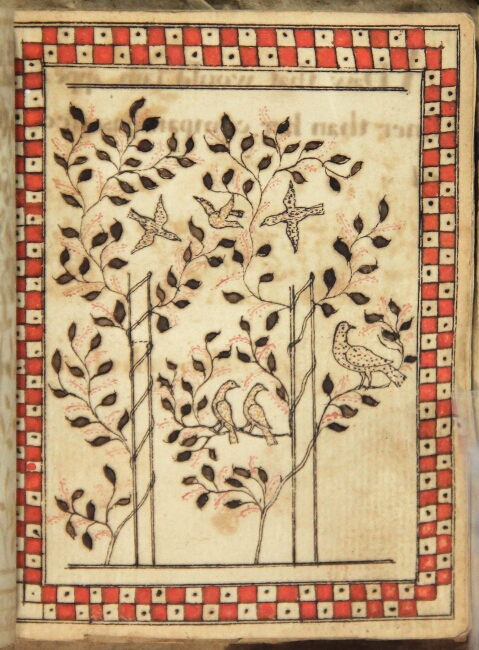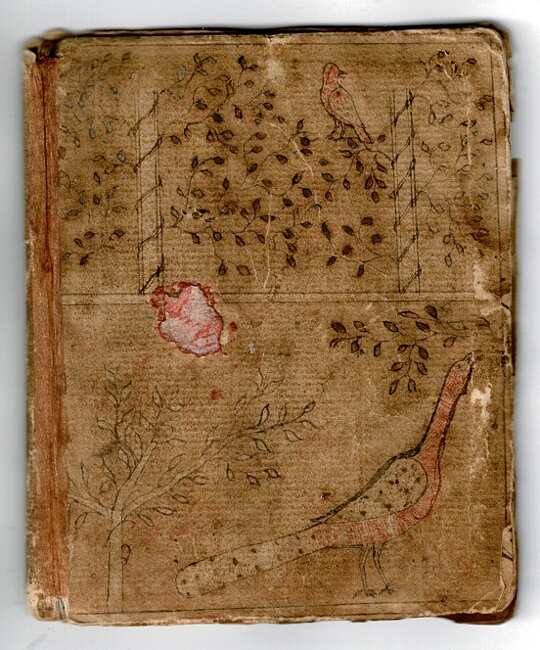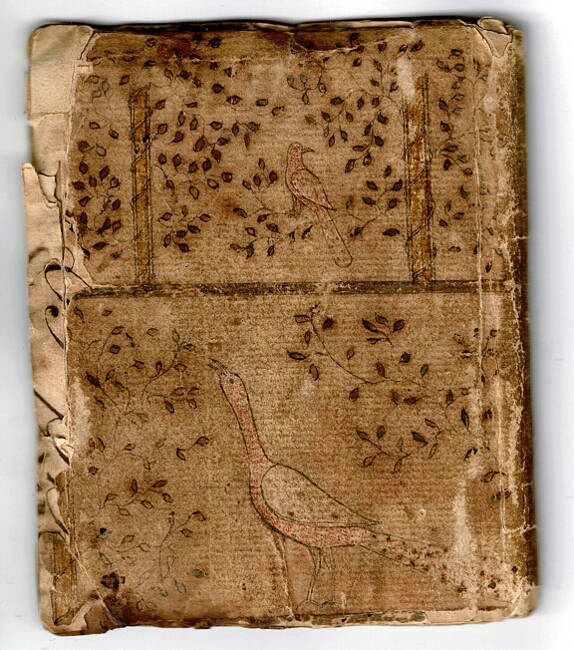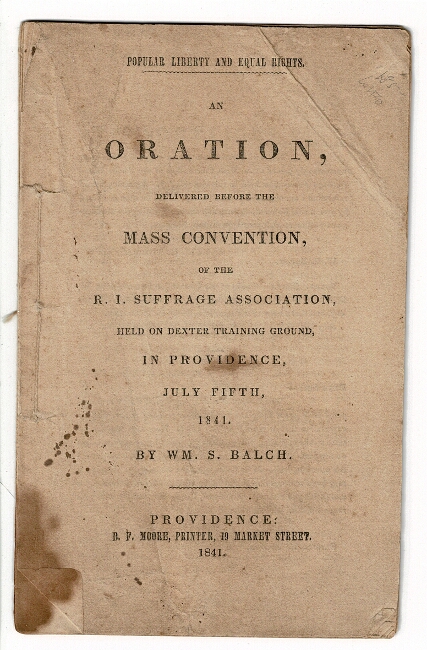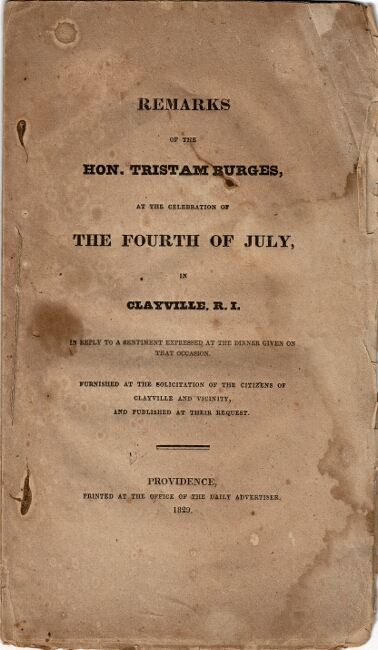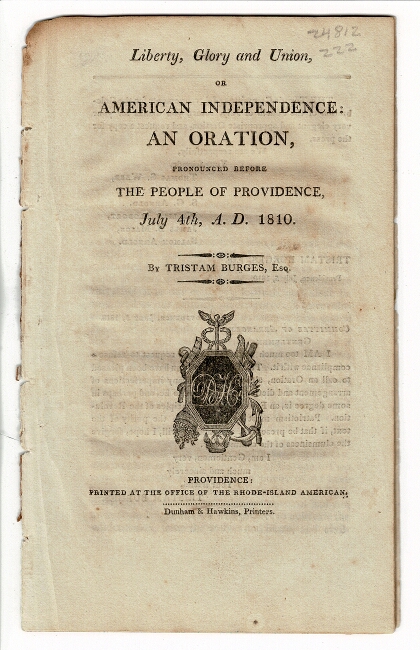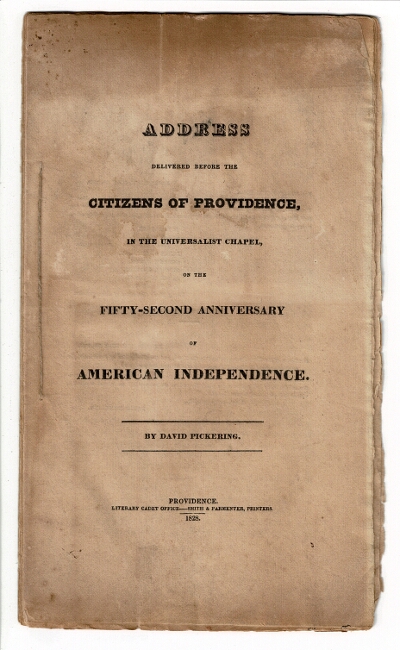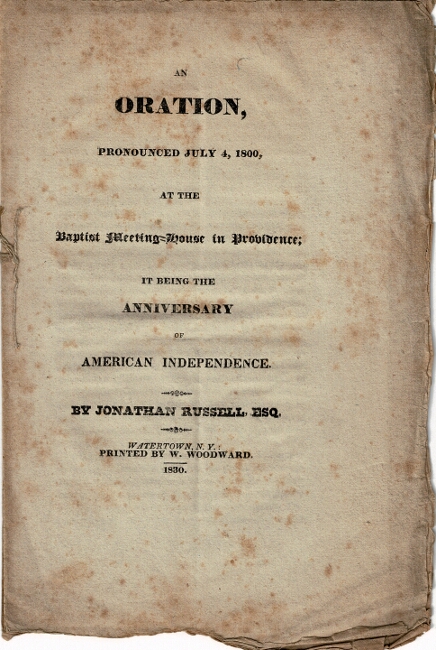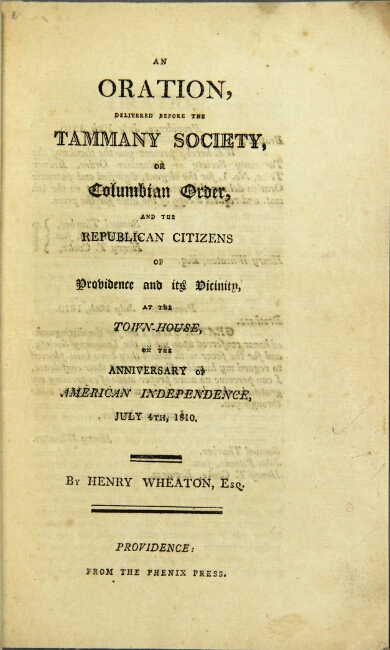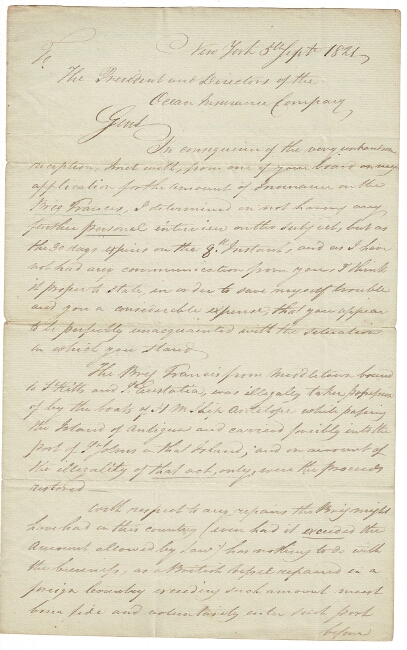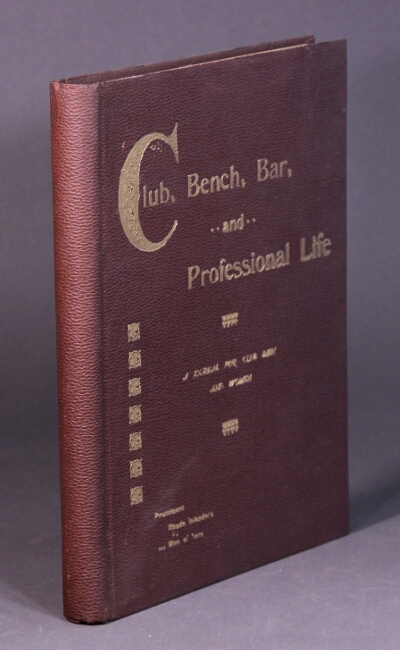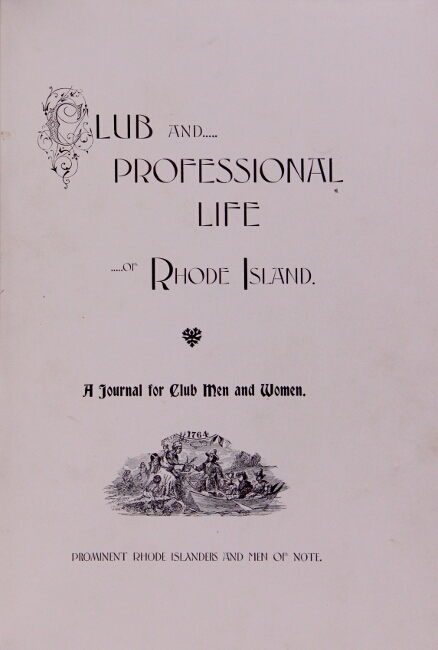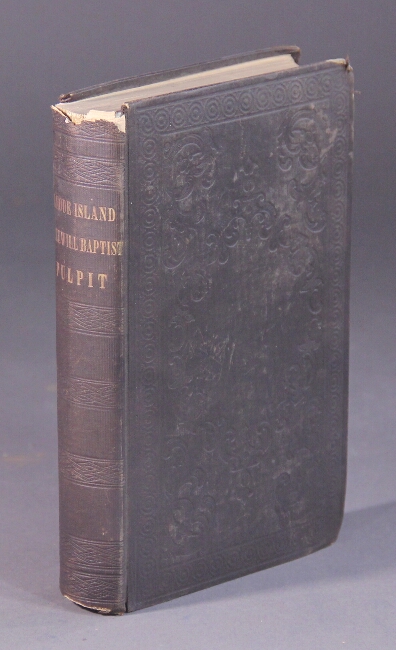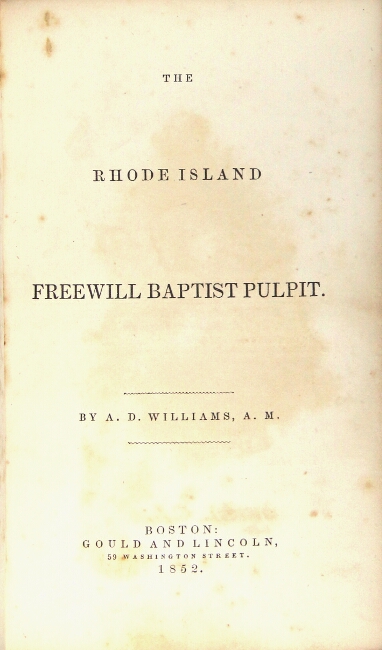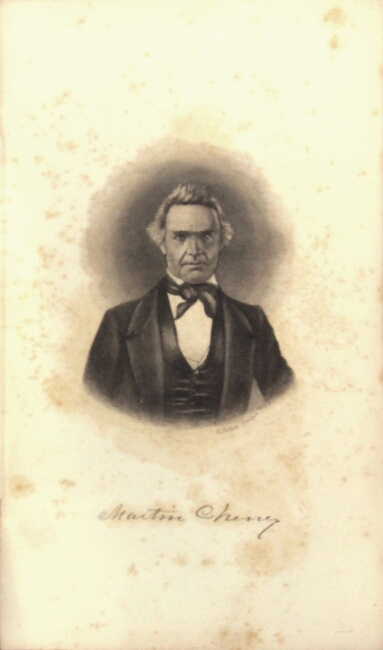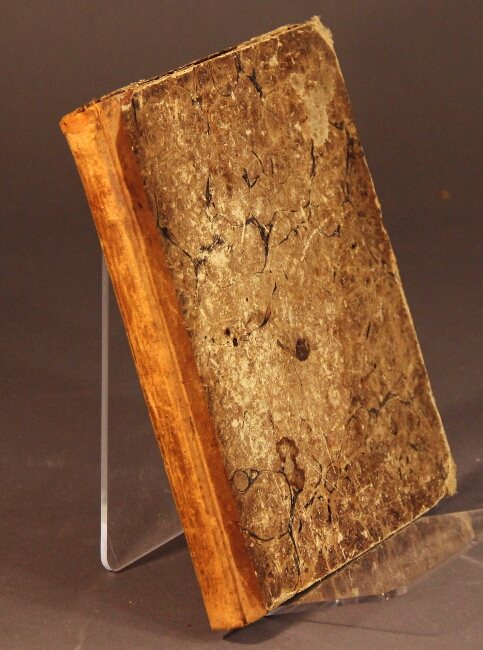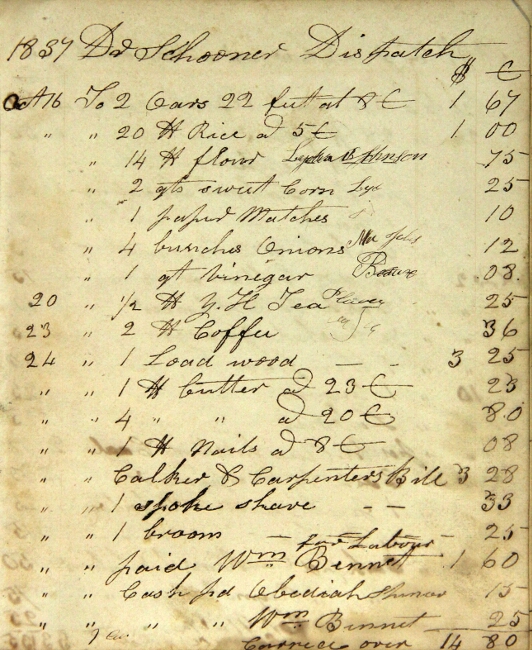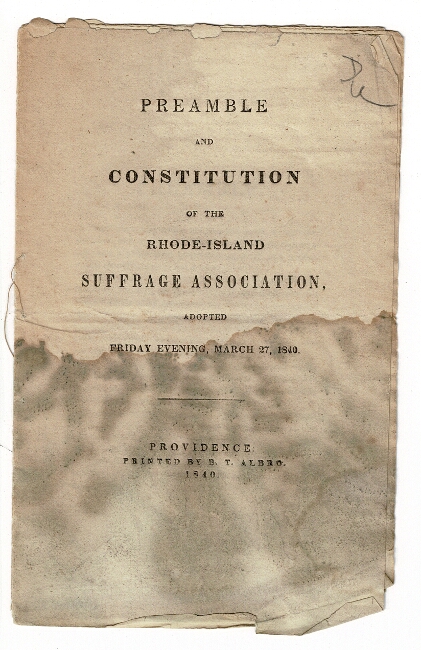301. [Dorr Rebellion.] Roll of members of the convention to frame a constitution, assembled at Newport, September, 1842. Hon. James Fenner, president: Hon. Henry Y. Cranston, vice-president. [Newport?: publisher not identified, 1842.].
SOLD
Broadside (approx. 13" x 8"), old folds, browned along one fold with a few spots of foxing, otherwise very good with good margins.
With a list of 75 names in double column beneath the running head, with blank spaces to mark either "Aye" or "No" beside each name. This assembly promulgated a constitution that was ratified by a public referendum in November of 1842, becoming the first Rhode Island constitution.
DeSimone & Schofield, 129 (R.I. Historical only). Not found in American Imprints, nor in OCLC.
302. [Dorr Rebellion.] Speech of the Hon. C. B. Smith, of Indiana, on the memorial of the "Democratic members" of the Legislature of Rhode Island. Delivered in the House of Representatives of the United States March 14, 1844. Washington, [D.C.]: printed at the office of the Whig Standard, 1844.
$75
First edition, 8vo, pp. 16; removed; quite toned and foxed; good.
"I ask you, Mr. Speaker, if principles so wild, so Jacobinical, so utterly destructive of all government, as those which are advocated by the Rhode Island insurrectionists, are encouraged, where will you find limits for their operation?"
American Imprints 5680; Sabin 82367.
303. [Dorr Rebellion.] State debt of the Dorrites! How is it to be paid? If Carpenter is elected, a land tax is inevitable!. [Providence?: publisher not identified, 1843.].
$500
Folio broadside (approx. 15¾" x 14"), printed in triple column beneath the running head; very good.
At issue was whether taxation was necessary, and if so, whether the land of farms or the stock holdings of wealthy residents of Providence should be taxed. Includes official certificates that state debts of the Dorr Rebellion have been paid; asserts that the Dorrites, if elected, will claim $500,000.00 in damages and expenses; and urges election of James Fenner for governor.
N.Y. Historical, Mass. Historical, and Brown in OCLC. DeSimone and Schofield 138 (adding the three copies at RI Historical, and the defective one at Newport Historical, plus 2 in private collections); not in American Imprints or Sabin.
304. [Dorr Rebellion.] [Circular letter:] Sir, - A numerous meeting of some of the most active and efficient friends of Law and Order, was held in this city, on Monday evening, the 11th inst. Providence: December 14, 1843.
$750
Folio bifolium (approx. 13¾" x 8¼"), printed on the first page only; near fine.
An anti-Dorrite text urging the election of the Law and Order ticket, and the steps needed to be made to ensure a successful outcome.
"The undersigned were appointed to correspond with active and influential friends of Law and Order, in every town in the state; and to urge upon them the necessity of commencing, immediately, that efficient organization, which cannot fail to secure, for the good cause in which we are engaged, another and yet more glorious triumph ... Defeat would cover us with deep shame, and it would bring upon us irretrievable disasters."
OCLC locates the Brown University copy only. Not in American Imprints, Bartlett, or Sabin. DeSimone & Schofield 230 adding R.I. Historical.
305. [Dorr Rebellion.] To the Democrats of Rhode Island. [Providence: publisher not identified, 1843.].
$950
Folio broadside (approx. 13" x 10¾"), text in double column beneath the running head; unevenly trimmed at the bottom edge; generally very good.
Not in OCLC, American Imprints, Bartlett, or Sabin. DeSimone & Schofield, 180 (locating the R.I. Historical and Providence Public copies): "Claims duplicity of Dorrites in campaigning in southern and northern R.I."
306. [Dorr Rebellion.] The conspiracy to defeat the liberation of Gov. Dorr, or, the Hunkers and Algerines identified, and their policy unveiled. To which is added, a report of the case ex parte Dorr. New-York: printed and published by John Windt, 99 Reade Street, 1845.
$250
First edition, 8vo, pp. 47, [1]; original printed tan wrappers; wrappers chipped, hinges loosening, but in tact; all else very good.
Two (of five) OCLC records call for a portrait, not present here. Sabin does not call for a portrait in either of his two entries for the pamphlet.
"Treadwell and Samuel Fessenden were "counsel for sundry citizens of Rhode Island" interested in procuring Dorr's release, and Treadwell is supposed to have been the author" (Sabin).
American Imprints 6468; not in Bartlett; Sabin 96510.
307. [Dorr Rebellion.] A discourse preached on Thanksgiving Day, in the Beneficent Congregational Meeting-House, Providence, July 21, 1842. Providence: Benjamin F. Moore, 1842.
$150
First edition, 8vo, pp. 16; original printed salmon wrappers with ownership signature "Metcalf Esq." at the top; near fine.
Entirely devoted to expressing opposition to the acts of the Dorrites.
Not in American Imprints; Bartlett, p. 103; Sabin 97370.
308. [Dorr Rebellion.] United States troops in Rhode Island, &c. Message from the President of the United States in answer to a resolution of the House of Representatives relative to the employment of United States troops in Rhode Island, and transmitting documents in relation to the recent difficulties in that state [drop title]. [Washington, D.C.]: Blair & Reeves, printers, April 10, 1844.
$100
8vo, pp. 179, [1]; removed from binding, wrappers wanting; very good.
In this copy pp. 7-10 are duplicated at the back. Issued as House Document 225, 28th Congress, 1st Session. Numerous individual reports on matters relating to the Dorr Rebellion, and taken together as good a contemporary account as there is.
309. [Dorr Rebellion.] The affairs of Rhode Island. A discourse delivered in the meeting-house of the First Baptist Church, Providence, May 22, 1842. Boston: William D. Ticknor, 1842.
$200
First Boston edition, 8vo, pp. 32; original printed terracotta wrappers; lightly soiled, else near fine.
Wayland, a moral philosopher, was the president of Brown University who took a dim view of Dorr's efforts to broaden suffrage. The pamphlet was summarily reviewed by John Bolles in "The Affairs of Rhode Island," being a Review of President Wayland's "Discourse"; a Vindication of the Sovereignty of the People, and a Refutation of the Doctrines and Doctors of Despotism.
American Imprints 5062; Bartlett, p. 105 citing the second edition which was published in Providence.
310. [Dorr Rebellion.] The affairs of Rhode Island. A discourse delivered in the meeting-house of the First Baptist Church, Providence, May 22, 1842. Boston: William D. Ticknor, 1842.
$45
First Boston edition, 8vo, pp. 32; wanting wrappers; odd staining on first 3 leaves; good.
Wayland, a moral philosopher, was the president of Brown University who took a dim view of Dorr's efforts to broaden suffrage. The pamphlet was summarily reviewed by John Bolles in "The Affairs of Rhode Island", being a Review of President Wayland's "Discourse"; a Vindication of the Sovereignty of the People, and a Refutation of the Doctrines and Doctors of Despotism.
American Imprints 5062; Bartlett, p. 105 citing the second edition which was published in Providence.
311. [Dorr Rebellion.] The affairs of Rhode-Island. A discourse delivered in the meeting-house of the First Baptist Church, Providence, May 22, 1842. Providence: B. Cranston & Co. and H. H. Brown, 1842.
$200
First Providence edition, 8vo, pp. 32; original printed brown wrappers; back wrapper a little chipped and becoming loose; some soiling; very good.
Wayland, a moral philosopher, was the president of Brown University who took a dim view of Dorr's efforts to broaden suffrage. The pamphlet was summarily reviewed by John Bolles in "The Affairs of Rhode Island", being a Review of President Wayland's "Discourse"; a Vindication of the Sovereignty of the People, and a Refutation of the Doctrines and Doctors of Despotism.
Not in American Imprints which cites only the Boston edition of the same year. Bartlett, p. 105 citing the second edition which was also published in Providence.
312. [Dorr Rebellion.] The affairs of Rhode-Island. A discourse delivered in the meeting-house of the First Baptist Church, Providence, May 22, 1842. Second edition. Providence: B. Cranston & Co. and H. H. Brown, .
$125
Second Providence edition, 8vo, pp. 32; original printed brown wrappers; old library stamps on front wrapper and title page; front wrapper loosening; good.
Wayland, a moral philosopher, was the president of Brown University who took a dim view of Dorr's efforts to broaden suffrage. The pamphlet was summarily reviewed by John Bolles in "The Affairs of Rhode Island", being a Review of President Wayland's "Discourse"; a Vindication of the Sovereignty of the People, and a Refutation of the Doctrines and Doctors of Despotism.
Not in American Imprints which cites only the Boston edition of the same year; Bartlett, p. 105; not in Sabin.
313. [Dorr Rebellion.] The affairs of Rhode-Island. A discourse delivered in the meeting-house of the First Baptist Church, Providence, May 22, 1842. Third edition. Providence: B. Cranston & Co. and H. H. Brown, 1842.
$125
8vo, pp. 32; original printed brown wrappers; some soiling; very good.
Wayland, a moral philosopher, was the president of Brown University who took a dim view of Dorr's efforts to broaden suffrage. The pamphlet was summarily reviewed by John Bolles in "The Affairs of Rhode Island", being a Review of President Wayland's "Discourse"; a Vindication of the Sovereignty of the People, and a Refutation of the Doctrines and Doctors of Despotism.
Not in American Imprints which cites only the Boston edition of the same year. Bartlett, p. 105 citing the second edition which was also published in Providence; not in Sabin.
314. [Dorr Rebellion.] The affairs of Rhode-Island. A discourse delivered in the meeting-house of the First Baptist Church, Providence, May 22, 1842. Third edition. Providence: B. Cranston & Co. and H. H. Brown, 1842.
$100
8vo, pp. 32; original printed blue front wrapper, back wrapper wanting; very good.
Wayland, a moral philosopher, was the president of Brown University who took a dim view of Dorr's efforts to broaden suffrage. The pamphlet was summarily reviewed by John Bolles in "The Affairs of Rhode Island", being a Review of President Wayland's "Discourse"; a Vindication of the Sovereignty of the People, and a Refutation of the Doctrines and Doctors of Despotism.
Not in American Imprints which cites only the Boston edition of the same year. Bartlett, p. 105 citing the second edition which was also published in Providence.
315. [Dorr Rebellion.] Address of John Whipple to the people of Rhode Island, on the approaching election. Providence: Knowles and Vose, printers, 1843.
$75
First edition, 8vo, pp. 16; self-wrappers, stitched, as issued; uncut and unopened; title a little soiled and with a small piece torn away from the top margin (no loss of letterpress); good and sound, or better.
This address was also printed in at least two broadside versions. AAS notes: Attacks [the] People's Constitution and opposes the candidacy of T. F. Carpenter for governorship of Rhode Island.
Not found in American Imprints nor in Sabin. Bartlett, p. 273.
316. [Dorr Rebellion.] Speech of the Hon. Henry Williams, of Massachusetts, on vindication of the right of the people of Rhode Island to amend their form of government [drop title]. [N.p., n.d.: ca. 1845].
$350
8vo, pp.14, [2]; later marbled wrappers; very good.
With the ownership signature at the top of the first page of Henry C. Dorr, the younger brother of Thomas Wilson Dorr. He practiced law in New York City and was a researcher and writer on the early history of the Providence Plantations.
Henry Williams was an attorney from Taunton, Mass. and U.S. Representative whose house district was contiguous with Rhode Island. This speech received several contemporary printings with varying subtitles.
Two others (not this) are recorded by American Imprints (6921 and 6922); not in Sabin.
317. An address to the people of Rhode-Island, from the convention assembled at Providence, on the 22nd day of February, and again on the 12th day of March, 1834, to promote the establishment of a state constitution. Providence: Cranston & Hammond, 1834.
$850
First edition, 8vo, pp. 60; later cloth-backed boards, spine partially perished, light spotting; all else very good.
"The able contingent which had been directed to prepare a statement of party principles - Dorr, Angell, Rivers, William Smith, and attorney Christopher Robinson - presented its report, the famous Address to the People of Rhode Island. This document, sixty pages in final printed form, was composed principally by Dorr, with assistance from Angell and Smith....The Address eloquently concluded by urging the Assembly to call an equitably apportioned constitutional convention. It further exhorted the legislature to suspend the freehold qualification for native-born citizens in the election of delegates 'for the single purpose of facilitating the exercise by the People of the great, original Right of Sovereignty" (Conley, Democracy in Decline, pp. 255-58).
"The historical portion of this address was contributed by Joseph K. Angell, Esq., the statistics by William H. Smith, Secretary of State under the People's Constitution," and the remainder, including all the argumentative part, by Thomas W. Dorr" (Bartlett).
American Imprints 26527; Bartlett, p. 82; Sabin 70537.
318. [Dorr, Thomas Wilson.] The Dorriad, and the great Slocum dinner; with introductory remarks and annotations. Providence: Sidney S. Rider & Brother, 1870.
$75
8vo, pp. 53, [1]; contemporary blue calf-backed marbled boards, gilt lettered spine; lightly rubbed, else near fine.
A "The Dorriad" by H. B. Anthony was first published Boston 1842, but it is distinct from "The Dorriad" published here. "The Great Slocum Dinner" was written by Samuel Ames, George Rivers, Thomas A. Jenckes, William P. Blodget, and Henry B. Anthony, a burlesque account of an imaginary dinner with Mr. Slocum in Providence. An old pencil note on the free endpaper notes that only 75 copies were printed.
Rider was a leading Providence bookseller, publisher and antiquarian who had amassed a collection of manuscript and printed materials documenting the history and print culture of Rhode Island from the 17th through the early 20th centuries, a collection now at Brown University.
319. [Dorr, Thomas Wilson.] Letter from Hon. Lemuel H. Arnold, in reply to the letter of John Whipple, Esq. [Providence?: publisher not identified, 1845.].
$1,250
Folio broadside (approx. 20½" x 12½"), text in quadruple column under the running head; some creasing but generally near fine. Dated South Kingston, May 1, 1845 at the end.
Letter to the editor of the Providence Journal responding to an article defending Arnold's vote for Charles Jackson over Governor Fenner, and the liberation of Thomas Wilson Dorr. For his part, Whipple actively opposed the liberation ticket, and any pardon for Dorr and his supporters. Dorr was released from prison the following month.
Brown and Harvard in OCLC. DeSimone & Schofield 84; American Imprints 284 (Harvard only); not in Bartlett; Sabin 2075.
320. [Dorr, Thomas Wilson.] Report of the trial of Thomas Wilson Dorr, for treason: including the testimony at length, arguments of counsel - the charge of the Chief Justice - the motions and arguments on the questions of a new trial and in arrest of judgment: together with the sentence of the court, and the speech of Mr. Dorr, before sentence. From notes taken at the trial. Providence: B. F. Moore, 1844.
SOLD
First edition, 8vo, pp. 115, [1]; text largely in double column; original tan printed wrappers; a few short splits at the joints but otherwise very good.
Most of this report was published earlier in the Republican Herald according to the Preface which is signed: George Turner [and] W. S. Burges.
American Imprints 2044; Bartlett, p. 111; Cohen 14138; Sabin 20650.
321. [Dorr, Thomas Wilson.] Rhode Island - Interference of the Executive in the affairs of. Report of the select committee ... to institute an enquiry into ... the adoption of a constitution by the people of Rhode Island in December, 1841, and its suppression by the then existing authorities of that State, through the interference and assistance of the President of the United States ... with the documents accompanying [drop title]. [Washington, D.C.]: Blair & Rives, printers, 1845.
$750
28th Congress, 1st Session, House Report 546; 8vo, pp. 1075, [1]; 2 engraved portrait frontispieces (Burke and Dorr); contemporary quarter black goat, gilt-paneled spine in 5 compartments, gilt-lettered direct in 2; old faint rubberstamp on first leaf; very good.
"The Dorr Rebellion profoundly shaped northern politics, along with playing a crucial role in the destruction of the Second Party System and the nation’s inexorable movement towards a new period of sectional crisis and ultimately disunion. No “tempest in a teapot,” the rebellion eventually involved the president, both houses of Congress, the Supreme Court, and the lower federal judiciary: all had to pass judgment on the tempest that erupted over Thomas Dorr’s People’s Constitution" (Eric Chaput in "The Rhode Island Questions" as published in Rhode Island History, volume 68, no. 2)
This summary text assembled by the U. S. Representative from New Hampshire, Edmund Burke, contains 212 supporting "papers", including the "Journal of the Select Committee on the Rhode Island memorial," "Schedule of papers forming the appendix to the report," "Constitution of the State of Rhode Island and Providence Plantations, as adopted by the convention assembled at Providence, November, 1841," "Proposed Constitution of the State of Rhode Island and Providence Plantations, as finally adopted by the people's convention, assembled at Providence on the 18th day of November, 1841," "The Constitution of the State of Rhode Island and Providence Plantations, adopted November, 1842," "Charter of 1623," "Speech of Thomas W. Dorr, on the right of the people of Rhode Island to form a constitution: delivered in the people's convention on the 18th day of November, 1841," "Report of the trial of Thomas W. Dorr, Governor of the State of Rhode Island under the people's constitution, on the charge of treason."
Not in American Imprints; Bartlett, p. 85; Sabin 70725.
322. [Dorr, Thomas Wilson.] Annual reports made to the General Assembly of Rhode-Island, at their October session, 1844, by the inspectors, warden & physician of the Rhode-Island state prison. Providence: Knowles and Vose, printers, 1844.
$350
8vo, pp. 38, [2]; original printed yellow wrappers; old ownership signature at the top of the front wrapper; generally very good.
The sixth annual report of the prison, with rules and regulations, and accounts of the prisoners, although not by name. Dorr had been incarcerated for a few months when this report was issued, and he is clearly the last listed inmate. Thirty-eight years old, committed on June 27, 1844, for life, for "Treason," makes Dorr readily identifiable.
Forward-looking penal philosophy of the warden, Thomas Cleveland: "It is, as I believe, the right of society to take the life of an offender if necessary, but not to take his mind, or to subject him to any process of infliction of which mental derangement shall be an ordinary, and not an unusual and unexpected result."
American Imprints 5299; not in Bartlett.
323. Dorr returned!!. [Providence(?): publisher not identified, 1843.].
$1,500
Folio broadside (approx. 22" x 16"), text in triple column under the running head; previous folds with neat professional repairs on verso, else near fine.
"This would-be Governor, the public enemy of Rhode Island, author and arch-leader of treason, sedition, and rebellion, whose bones were not left at Acote Hill, whose ambition has cost the state $100,000 in one year, has returned to our borders to superintend the election of his secret, legal advisor and fellow conspirator, Thomas F. Carpenter!!!" The anonymous author vehemently opposes the election of the Dorr Democrat Thomas Carpenter for Governor.
AAS, Brown and NY Historical in OCLC, to which we add RI Historical. Not in American Imprints; not in Sabin; DeSimone & Schofield, Broadsides of the Dorr Rebellion, 54.
324. [Dorr, Thomas Wilson.] Four-page manuscript essay mentioning Dorr. N.p.: Sept. 28, [1842?].
$175
Folio bifolium (approx. 15" x 12"), tears in the margins with some minor loss, previous folds; the text signed at the end "Marius."
A curious and mysterious essay that may be a satire by the editor of a literary magazine. This first person narrative describes "a ramble through the neighboring fields to enjoy the beauty of the hour" and how the writer observed "a person bounding and jumping over the hills and rocks like a maniac...the cause of his agitations: he informed us all soon that he was a Casket and had got composition to write that week, and that he had been pursuing an idea that started up in the bushes two or three miles distant."
The pursuit of the idea continues into an old barn "now quite evident that the idea had secreted itself...some wanted to try one way and others another: and some would like to send for Dorr, but that would not do for he had proved himself a coward and a rebel too." Dorr is no doubt Thomas Wilson Dorr, who had escaped Rhode Island into New York to raise a small militia there in June of 1842.
Writes Russ DeSimone, a top Rhode Island Dorr expert: "I am of the opinion that it is a general reference to Dorr as opposed to a specific event. In the months following the 'rebellion' Dorr was the butt of many quips, for example one poem referred to him as 'the hero of two flights' alluding to his two departures from Rhode Island in May and June 1842. Another stated 'he came, he saw, he scampered.' In general, the conservative press and Whigs specifically poked fun at Dorr often implying he was a coward. Your ms is from September 1842 when Dorr had been in exile just a short while. In that time he had been in New York City before he settled in New Hampshire... the 'War in Rhode Island' was discussed nationally in the summer and fall of 1842."
325. [Dorr, Thomas Wilson.] Letter to the Hon. James F. Simmons. By a Rhode-Island conservative. [Providence: publisher not identified, 1845.].
SOLD
8vo, pp. 8; removed from binding; self-wrappers; lightly chipped at the extremities, else very good.
Responding to a letter by Simmons, and written to the journalist Henry B. Anthony. The author, a member of the Law and Order Party, condemns Simmons, a Whig, for supporting the candidacy of Charles Jackson as governor of Rhode Island, in opposition to the reelection of James Fenner. A split in the ruling Whig / Law and Order coalition over the question of a pardon for Dorr lead to the election of the Know Nothing candidate Jackson in 1845 resulting in the release of Dorr from prison in June 1845.
An early owner, William H. Potter in 1894, has filled three margins of the title page here with manuscript notes concerning the election saying among other things that Simmons is guilty of treason and that Anthony, editor of the Law and Order Providence Journal is a traitor.
American Imprints 3853; not in Bartlett; Sabin 40481.
326. [Dorr, Thomas Wilson.] Important resolutions suppressed!! After all the gasconade at the meeting, last evening, against the liberation of Dorr, and all the abuse heaped upon the Whigs and upon James F. Simmons, by Messrs. Whipple, Ames, and others, they refuse to pass the following resolutions, which were introduced by Col. W. P. Blodget.... Providence: [publisher not identified], March 29, 1845.
$600
Broadside (approx. 10¼" x 7¼"), near fine.
Reflects a split in the Whig / Law & Order coalition with regard to the release of Thomas Dorr from prison. Here, the Whigs call upon the Law & Order faction to essentially put up or shut up. Blodget's proposed resolution, ostensibly offered on behalf of the Law & Order wing of the party, pledges to Rhode Island voters that there will be no more overtures made to Dorr, and that there will be no pardon of Dorr if Gov. Fenner is reelected.
But, "the chairman of the meeting would not allow the resolutions to be published in the [Providence] Journal as part of the proceedings of the meeting. The time is short - read and ponder." The split in the Whig / Law & Order Party over the question of a pardon for Dorr led to the election of the Know-Nothing candidate, Charles Jackson, in May of 1845.
Dorr was released from prison on June 27, 1845.
Not in American Imprints, Bartlett, Sabin, or OCLC. DeSimone & Schofield 77.
327. [Dorr, Thomas Wilson.] The life and times of Thomas Wilson Dorr, with outlines of political history of Rhode Island. Boston: published by the author, 1859.
$85
First edition, 12mo, pp. 368; engraved portrait frontispiece of Dorr (a bit foxed), original brown blindstamped cloth, gilt stamped spine; spine ends chipped; a good, reasonably sound copy.
The first comprehensive account of Dorr and still one of the best histories of the Dorr Rebellion.
Not in Bartlett. Parks 579; Sabin 37790.
328. [Dorr, Thomas Wilson.] Report of the trial of Thomas Wilson Dorr, for treason against the state of Rhode Island, containing the arguments of counsel, and the charge of Chief Justice Durfee. Boston: published by Tappan & Dennett, 1844.
SOLD
First edition, 8vo, pp. 131, [1] index and errata; original printed front wrapper present, but loose; all else very good.
This copy inscribed "Fenner Brown Esq. with the respects of the reporter."
The only state without a written constitution, Rhode Island still governed itself under its colonial charter granted by Charles II, which effectively barred about half the adult males from suffrage. Dorr led the effort to change Rhode Island's political system which became known as the Dorr Rebellion or Dorr War. Rebuffed, he and his People's Party set up a competing government. While he did not attempt to seize the State House or governmental institutions, a few armed clashes did occur. Governor King declared martial law, arrested Dorr, and indicted him for treason. This is the record of the trial, "prepared from notes taken in full by the reporter and from the notes of one of the judges who sat during the trial" (Preface).
American Imprints 4970; Cohen 14137; Sabin 20649.
329. [Dorr, Thomas Wilson.] Speech of Mr. Simmons. [Providence?: publisher not identified, 1845.].
$1,500
Folio broadside (approx. 22" x 16"), text in quadruple column under a running head; a bit of edgewear, previous folds, very good.
The speech, although undated, is known to have been given in 1845. At head of the text: "The following speech was delivered by Senator Simmons, to one of the largest and most enthusiastic Whig meetings held in the City of Providence since 1840. The Whigs of Providence, the friends of James F. Simmons, ask your candid and earnest attention to his remarks." Simmons attacks Governor Fenner and urges election of Charles Jackson as governor in order to achieve the liberation of T.W. Dorr.
OCLC locates only the Mass. Historical and Brown copies; not in American Imprints; not in Bartlett; not in Sabin; DeSimone & Schofield 136.
330. [Dorr, Thomas Wilson.] To Henry B. Anthony, Esq. Sir - A writer in the Transcript has thought fit to bring my name before the public.... [Providence?: publisher not identified, 1845.].
$1,250
Folio broadside (approx. 22" x 16"), text in quadruple column; slight edge wear, 2 small ink burns in the middle obscuring several letters (sense remains clear); all else very good or better.
At the bottom of the last column in ink: "Spring of 1845 when Charles Jackson was a candidate for governor." Anthony responds to an article in the Transcript and expresses a preference for Charles Jackson over Governor Fenner, and urges the liberation of Dorr.
OCLC locates the Mass. Historical, Brown, AAS, and NY Historical copies. Not in American Imprints; not in Bartlett; not in Sabin; DeSimone & Schofield 176.
331. Speech of Gov. Dorr, in answer to the question by the court, why sentence should not be pronounced against him. Providence: A. H. Stillwell, 1844.
$500
Folio broadside (approx. 17½" x 12½") on linen, printed in black in triple column beneath the running head, all within a typographic border; somewhat faded (or lightly inked?), and with some miscreasing, but generally clean and attractive. At the head of the text: "Newport, Tuesday, June 25th, 1844."
At least 2 other editions are known, and one of these was also issued on silk. This is the speech given to the court by Thomas Dorr in Newport on June 25th, 1844. The sentence pronounced by Chief Justice Durfee is given at end.
Not in American Imprints or Sabin. Difficult to get a good count from the OCLC records. DeSimone & Schofield 135 (noting 4 locations: RI Historical, Newport Historical, Providence Public, and Brown).
332. Speech of Gov. Dorr, in answer to the question by the court, why sentence should not be pronounced against him. Providence: A. H. Stillwell, 1844.
$750
Folio broadside (approx. 16" x 12"), printed in gold on dark blue paper, text in triple column, all within an ornamental border, with American eagles at the corners; at the head of the title, "1776"; and at the head of the text: "Newport, Tuesday, June 25th, 1844." Previous folds, edge wear and short marginal tears and creasing; a good example.
At least 2 other editions are known, and one of these was issued on silk. This is the speech given to the court by Thomas Dorr in Newport on June 25th, 1844. The sentence pronounced by Chief Justice Durfee is given at end.
Not in American Imprints or Sabin. Difficult to get a good count from the OCLC records. DeSimone & Schofield 135 (noting 4 locations: R.I. Historical, Newport Historical, Providence Public, and Brown).
333. Speech of Gov. Dorr, in answer to the question by the court, why sentence should not be pronounced against him. Newport, Tuesday, June 25, 1844. Providence: A. H. Stillwell, No. 1 Market Square, [1844].
$750
Folio broadside approx, 15" x 11". text in triple column beneath the running head, typographic filigree borders; slight chipping in the margins, the whole toned, and mounted; good.
Several versions of Dorr's speech at his trial in Newport are known, one published by William Simons, Jr. (on silk and on blue paper), another by the Republican Herald Office (on silk and on blue paper), and another by A. H. Stillwell, also apparently in at least two versions (on white paper and blue paper). This version not recorded in OCLC or American Imprints. This is likely DeSimone & Schofield 135 (on white paper) and apparently trimmed to the border.
The trial, held in Newport, was a travesty and an embarrassment. Dorr points out that all the jurors selected, and 147 out of 148 empaneled, were politically opposed to him. The decision and the judgment of the court, life imprisonment at hard labor, contained the seeds of its own defeat, brought about swiftly by public opinion. Within a year Dorr was released from prison, and in 1851 his civil rights were restored.
334. T. W. Dorr. Inaugurated Governor of Rhode Island, May 3d. 1842. "The process of this Court does not reach the man within. The Court cannot shake the convictions of the mind, nor the fixed purpose which is sustained by integrity of heart. From this sentence of the Court I appeal to the people of our State and of our Country. They shall decide between us." Ext. from Dorr's speech, Newport, R.I. June 25, 1844. New York: Lithd. and pubd. by J. Baillie, 118 Nassau St., [1845].
SOLD
Hand-colored lithograph portrait of Thomas Wilson Dorr, a liberal politician who drafted a new constitution for the state of Rhode Island and was elected under this constitution, but was soon after forced to leave the state. Approx. 13¾" x 10"; mild dampstaining, shallow chips in the margins; all else very good.
The subject, visible from the waist up, sits in an armchair in front of a heavy green curtain. The curtain is lifted at the left with two gold tassels to reveal the base of a column. In his right hand he holds his "Peoples Constitution," and the crown of the chair in which he sits bears an image of Rhode Island's state seal.
Michigan and AAS only in OCLC.

335. Thomas W. Dorr, elected Govenor [sic] of Rhode Island, under the People's Constitution. N.p., n.d.: .
$250
Lithograph portrait of Thomas W. Dorr sitting at a desk resting his hand on a table with a rolled piece of paper, a curtain slightly lifted to reveal a landscape on the right. Approx. 10¾" x 7½" overall, image size 7¼" x 5¾"; lightly soiled; very good.
AAS has a copy of a larger version with an additional line in the caption, but this not in AAS or OCLC.
336. Thomas W. Dorr, elected Govenor [sic] of Rhode Island, under the People's Constitution. "The People are Sovereign, and I cannot, shall not compromise their rights.". N.p., n.d.: .
$1,500
Hand-colored lithograph portrait of Thomas W. Dorr sitting at a desk resting his hand on a table with a rolled piece of paper, a green curtain slightly lifted to reveal a landscape on the right. Approx. 14" x 9¾"; lightly soiled and spotted in the margins; very good.
AAS only in OCLC, their copy not hand-colored.
337. [Dorr, Thomas Wilson.] Thomas W. Dorr. Elected Gov. of Rhode Island april (sic) A.D. 1842 under a constitution adopted by the people of the state in Dec. 1841. Philadelphia: V. F & M. F. Harrison, no. 27 South Eighth Street, 1845.
$1,250
Bust-length mezzotint portrait (approx. 22½" x 16½" overall; image size: 12" x 9¾") taken from a daguerreotype; lightly foxed, several short creases and breaks in the margins; all else very good. Includes a facsimile of his signature.
"Copies were sold in Providence by Abraham Stillwell, a local bookseller. Stillwell began advertising the sale of the likeness of Dorr beginning with the June 20, 1842 issue of the Providence Daily Express. Stillwell's ad read 'GOV. DORR, Just published and for sale at No. 1 Market square, a Portrait of Thomas W. Dorr, elected Governor of the State of Rhode Island under the People's Constitution'." (Phillips Memorial Library, Providence College).
AAS only in OCLC.
338. [Dorr, Thomas Wilson.] Letter from Hon. William Woodbridge, United States Senator from the State of Michigan. [Providence?: publisher not identified, 1846].
$1,500
Folio broadside (approx. 18½' x 12½"), text in triple column under the running head; moderate foxing and dampstaining, a handful of small holes in the blank areas, good or better.
The letter is to Edward H. Hazard, dated, March 24, 1846, and signed, Wm. Woodbridge, relative to matters growing out of the Dorr Rebellion, Mr. Dorr's liberty, and Governor Fenner.
Not in OCLC, American Imprints, Bartlett, Sabin, or DeSimone and Schofield.
339. Report of the case John Dorrance against Arthur Fenner tried at the December term of the Court of Common Pleas, in the county of Providence, A.D. 1801. To which are added, the proceedings in the case Arthur Fenner vs. John Dorrance. Carefully compiled from notes correctly taken by several gentlemen who were present during the whole course of the trial. Providence: printed by Bennett Wheler, 1802.
$750
First edition, 8vo, pp. iv, 116; 20th-century three-quarter maroon goat, spine in 3 compartments, unadorned; lightly rubbed, very good.
This copy with the ownership signature and copious annotations of Benjamin Crocker Clough (1889-1975), professor of English and classics at Brown University (on p. 1, p. 50, the verso of the final leaf, and 4 rear flyleaves) largely related to corpses, anatomy, and dissection, as well as notes on some of the characters in this whacky case (including the printer, Bennett Wheeler, a Nova Scotian) which involved the sale of the corpse of a suicide victim in exchange for a beaver-skin hat, and the subsequent dissection of the cadaver. Clough in 1947 published The American Imagination at Work, an anthology of folk tales; and Tall Tales and Folk Tales.
American Imprints 2156; Cohen 11968; Sabin 20652.
Offered together with: [from the typed label on the upper cover:] Dorrance vs. Fenner. Sidney S. Rider's Study of the Case in its Unexpurgated Form. Prov. Journal, Dec. 21, 1872. Purchased for $1 from J. H. L. 1936. And with the added note in manuscript: "With some MS additions culled from various sources, by B. C. Clough." Small 8vo, 28 leaves onto which have been pasted a series of Rider's articles in the Providence Journal, with many manuscript and typed annotations by Clough in the margins, on the flyleaves and several individual pages. Also, with 2 legal-size sheets with notes in ink about the case on both sides of the sheets. Contemporary red cloth, paper label on upper cover; very good.
340. An oration, delivered in the first Baptist meeting-house in Providence, at the celebration, February 23, A. D. 1824, in commemoration of the birth-day of Washington, and in the cause of the Greeks. [Providence]: Brown & Danforth, 1824.
SOLD
First edition, 8vo, pp. 24; uncut, without wrappers as issued; near fine.
Solomon Drowne was born in Providence in 1753 and graduated from Brown University in 1773. "After visiting Europe he returned to Providence and entered upon the practice of medicine. For several years he was a surgeon in the army of the Revolution. Ill health obliged him to move to the West, where he labored in his profession, in Ohio and western Pennsylvania for nine years. In 1801 he returned to his native state, and settled in the town of Foster, where he passed the remainder of his life in professional and agricultural pursuits. In 1811 Dr. Drowne was appointed Professor of Materia Medica and Botany in Brown University. Botany was his favorite study, and, besides lecturing to the students, he had private classes of citizens. He died in 1834, at the age of 81 years" (Bartlett).
American Imprints 16004; Sabin 20967, both listing the author as Drowne.
341. Compendium of agriculture or the farmer's guide, in the most essential parts of husbandry and gardening; compiled from the best American and European publications, and the unwritten opinions of experienced cultivators. Providence: printed by Field & Maxcy, 1824.
$125
First edition, 12mo, pp. 238; uncut; later red calf-backed marbled boards, joints cracked, spine scuffed and chipped; otherwise a good, sound copy.
American Imprints 16006; not in Bartlett; Rink 1305.
342. The Panidea: or, an omnipresent reason considered as the creative and sustaining logos. By Theoptes. Boston: Thomas H. Webb & Co., 1846.
$225
First edition, 8vo, pp. 176; original printed wrappers backed with red cloth at an early date, manuscript paper label on spine; wrappers lightly soiled and worn with minor loss to back wrap; a few corners creased and curled but text generally clean. A good, sound copy.
A work of Emersonian pantheism by the Chief Judge of the Rhode Island Supreme Court who presided over the Dorr trials. In an earlier work, The Influence of Scientific Discovery and Invention on Social and Political Progress (1843), Durfee believed that he had found in the advent of steam power a sign of divine intervention, indicating a "law of progress" in man's development. Panidea adumbrates this theme: all is eventually assimilated into the "Theanthropoid," Durfee's term for the Divine Mind.
See Schneider, History of American Philosophy. DAB offers a concise assessment: "a somewhat pretentious philosophical work which nobody read."
American Imprints 2262.
343. The complete works of the Hon. Job Durfee, L.L.D. late Chief Justice of Rhode Island: with a memoir of the author. Edited by his son. Providence: Gladding and Proud, 1849.
$150
First edition, 8vo, pp. xxvi, 523, [1]; contemporary half brown morocco over marbled boards; binding scuffed, ex-Brown University with an Ives Collection bookplate (withdrawn), call slip on the rear pastedown; no external markings; good and sound.
Durfee was the jurist who first called the Dorr Rebellion illegal and treasonable. Includes two lectures, "History of the Subjection and Extermination of the Narragansetts," and "The Idea of the Supernatural among the Indians."
Bartlett, p. 115
344. A discourse delivered before the association at the dedication of a new meeting house. August 9, 1791. Newport: printed and sold by John Mycall, 1792.
$250
8vo, pp. [5]-46; lacking half-title, title leaf and final leaf of text, the latter two leaves being replaced by manuscript transcriptions; first page of text with a header of elaborate ornamentation, textblock foxed and toned with occasional pencil marks, first page with a chip to fore-edge not affecting type.
Bound with: Dutch, E. A Discourse delivered at Bradford, January 25th, 1795. Haverhill: printed by Benjamin Edes, 1795. 8vo, pp. 31, [1]; uncut; half title toned with small chip to gutter, touching ornaments, and larger loss to bottom of the leaf, not affecting text, light spotting, good and sound. The half title reads, "Mr. Dutch's Discourse on occasion of the numerous deaths which took place among his people, in a very short space of time."
Bound with: Perry, Gardner B. History of Bradford, Mass., from the earliest period to the close of 1820. Haverhill: C. C. Morse & Son, 1872. 69, [3] (blank); nibbling all across the top of the textblock, the word "East" inserted in pencil on the title page, clean and sound.
Together, three titles bound in later 19th-century half leather over pebbled cloth, gilt title and rules on cover, spine partially perished, joints perished but hinges refreshed, cloth bubbling.
Two scarce pamphlets, with an accompanying later history giving a brief biography of Dutch, the author. According to Perry: "So far as books are concerned, I suppose though respectable, he had less learning than any of his predecessors. He was a man however of an active, ready mind... and could without preparation hold forth on any subject connected with his profession... "
Evans 24283 and 28605; not in Hammett.
345. A summer's travel to find a German home. Providence: Sidney S. Rider & Bro., 1864.
$200
First edition, 12mo, pp. xii, 245, [1]; original brown diaper-patterned cloth; spine sunned, light foxing, one central gathering starting; all else very good,
With a long contemporary inscription on the front free endpaper explaining the circumstances: "The story is told that Gov. Dyer submitted the manuscript of this book to Professor Diman and asked his opinion of it without telling him that he was the author. Diman read it and then told the Governor that it was very crude and utterly unfit for publication, but nevertheless Gov. Dyer published it. Subsequently it was suppressed by his family and the remainder of the edition sold for junk, but they were recovered from the junk dealer by Mr. Webb or a book dealer and so gradually distributed."
Not in Smith, American Travellers Abroad.
346. [Program for:] Newport Folk Festival July 22-25, 1965. New York: Newport Folk Art Foundation, 1965.
$2,500
4to, pp. 63, [1]; illustrated throughout; original pictorial wrappers a bit soiled, else very good.
Joan Baez, Donovan, Maybelle Carter, Peter, Paul & Mary, Mississippi John Hurt, but who cares. That Sunday night, July 25, Dylan took the stage with guitarist Mike Bloomfield and Barry Goldberg of the Paul Butterfield Blues Band (Dylan with a Fender Stratocaster) - a scene familiar to all from Martin Scorsese's documentary, No Direction Home - thereby changing the course of pop music forever.
That night at Newport, in an abbreviated performance, he opened with "Maggie's Farm," and followed that with "Like a Rolling Stone" (which had only been released five days earlier), and "It Takes a Lot to Laugh, It Takes a Train to Cry." He finished his performance that night with two acoustic songs, "Mr. Tambourine Man" and "It's All Over Now, Baby Blue." He never played at Newport again until 2002, when he played a headlining performance while wearing a wig and fake beard.
This issue of the program also prints a short story, of sorts, by Bob Dylan, "Off the Top of My Head," featuring off-the-top-of-his-head characters, Horseman, Photochick, Miss Flunk, and the Prez.
347. [East Greenwich.] History of the town of East Greenwich and adjacent territory from 1677 to 1877. Providence: J. A & R. A. Reid, printers and publishers, 1877.
$75
First edition, 8vo, pp. 263, [1] ads; wood-engraved frontispiece, 2 other wood-engraved plates; original crimson cloth stamped in gilt and black on upper cover, gilt only on spine; binding a bit soiled, snag at the top of the spine and the front hinge cracked; a good copy.
Parks 1581.
348. [East Greenwich.] The history of East Greenwich, Rhode Island 1677-1960 with related genealogy ... Illustrated by S. Jerome Hoxie. East Greenwich: East Greenwich Free Library Association, 1960.
$45
First edition, 8vo, pp. 300; folding plan and 23 drawings by Hoxie used as chapter headpieces; fine copy in original green cloth but a sunned and stained dust jacket.
349. [East Greenwich.] That there may be a permanent record of the two hundred and fiftieth anniversary celebration of the founding of the town of East Greenwich, Rhode Island, September 4th to 8th inclusive, 1927. Souvenir program 1677-1927. N.p.: [publisher not identified], 1927.
$25
4to, pp. 96; illustrated throughout; original pictorial wrappers; very good. The eighth oldest town in Rhode Island.
350. Yamoyden, a tale of the wars of King Philip: in six cantos. By the late Rev. James Wallis Eastburn, A.M. and his friend [i.e. Robert C. Sands]. New York: James Eastburn. Clayton & Kingsland, printers, 1820.
SOLD
12mo, pp. xii, 339, [1]; inserted engraved frontispiece and title page by A. B. Durand; contemporary full stained calf, gilt-lettered direct on blindstamped spine; edges worn, the upper cover neatly rehinged, mild spotting of the text; good and sound.
This copy inscribed by the publisher: "Rev. Benj. B. Smith, in token of the esteem in which he was held by the dear departed author, from his sincere friend, James Eastburn."
And with an additional inscription beneath it: "This volume retained nearly 60 years as a memorial of a very dear early friend is now presented to his grand-nephew Herbert Marshall Howe the present owner of Mount Hope, Easter, 1879."
American Imprints 1069; not in Bartlett; Sabin 21659; Wegelin 941.
351. The French spoliation claims and Rhode Island claimants, a paper read before the Rhode Island Historical Society, December 1, 1885. Providence: E. L. Freeman & Son, state printers, 1885.
$125
First separate edition, reprinted from the Narragansett Historical Register, January, 1886; 8vo, pp. 33, [1]; fine in original printed salmon wrappers.
Claims made by Rhode Islanders against France for vessels and cargo taken by privateers prior to September 30, 1800, which even by 1885 had not been resolved.
BnF only in OCLC.
352. One-page autograph letter signed to John Bailey, Esq. Department of State. N.p.: February 27, 1821.
$150
Quarto, wax seal and address on verso of integral leaf; break at the seal, previous folds, slightly toned; very good.
Samuel Eddy (1769-1839) was a U.S. Representative from Rhode Island, Secretary of State, and later Chief Justice of the R.I. Supreme Court. Here, he writes to John Bailey in the matter of "Mr. Lyman the son of Judge Lyman of N. Providence" asking for information on "the subject of the enclosed letter? What evidence is necessary? ... I have no personal acquaintance with him, but there is no question as to the facts stated in the enclosed letter. I would not trouble you with this but I am unwilling to leave the House during session."
Judge Lyman is no doubt Daniel Lyman (1756-1830) of Lymanville Manufacturing Company in North Providence. He had several sons to whom Eddy may be referring.
353. [Education - Census.] Total returns of the 1840 census for Rhode Island. Copy submitted from clerk's office, District Court, Providence, to Federal Government. April 20, 1841. John T. Pitman, clerk. Included with copy of report to Stephen Cahoone, General Treasurer, concerning numbers of public school children. From sub committee: Thos M. Burgess, Thos. W. Dorr, Moses B. Ives. Providence: April 22, 1841.
$1,250
Folio bifolium (approx. 17¼" x 10½"), 3 pages, in ink, with a docket on the verso of the integral leaf; previous folds, neat, professional repair at splits; all else very good.
Document concerning the financing of public schools in Providence. The fomenter of the Dorr Rebellion, Thomas W. Dorr, was part of a subcommittee on schools in Providence that sent this report to Stephen Cahoone, General Treasurer, based on the act of 1828 to establish public schools and to pay monies to the towns in proportion to their respective population of certain ages (i.e. school children).
The subcommittee produced numbers of white and colored males and females of certain age brackets in the state and in the city of Providence (all under the age of 24). For example, they reported 132 colored females in the city under the age of ten. "The City of Providence will therefore be entitled to" 7698th part of 38053 of the amount (to be) distributed.
The first school committee chosen under the reorganization of 1838 included Thomas W. Dorr and he was president of the school committee in 1841 to 1842. The first page tallies Free White Persons (male and female separately) and Free Colored Persons (male and female separately) for the then 31 towns in Rhode Island under fifteen years of age. The 1840 census must not have been completely enumerated when these figures were totaled since they are short of the actual census currently available. Curiously, Edwin Snow reported in 1867 that: "I have been unable to obtain the number of the colored population, by the census of 1840, except by counties and for a few towns, which are given in the table."
354. [Education.] Acts and resolves of the General Assembly relating to public schools in Rhode Island, since May session, 1869. With remarks. Prepared by the commissioner of public schools [wrapper title]. Providence: printed by the Providence Press Company, state printers, 1871.
$45
8vo, pp. 16; original printed gray wrappers; lightly soiled, else fine.
355. [Education.] Twenty-fifth annual report on public schools in Rhode Island, made to the General Assembly at the January session, A.D. 1870. Providence: Providence Press Company, printers to the state, 1870.
$100
8vo, pp. [2], 260; frontispiece, tables and several diagrams in the text; original printed gray wrappers; last leaf with tear entering from the fore-margin (no loss), spine ends lightly chipped; all else very good.
356. [Education.] Report to the City Council of Providence, presented June 1, 1846, by their committee, appointed September 3d, 1838, to superintend the erection of school houses, on the re-organization of the public schools. Providence: printed by Knowles and Vose, 1846.
$225
8vo, pp. 16;
Bound with: Report of the Superintendant of Public Schools, on the Public School Houses of Providence. Providence: printed by Knowles and Vose, 1846, pp. 28; 17 diagrams in the text (2 full-page);
Bound with: Report of the School Committee of the City of Providence, presented to the City Council, June 1, 1846. Providence: printed by Knowles and Vose, 1846, pp. 11, [1];
Bound with: By-Laws of the School Committee, and Regulations of the Public Schools, in the city of Providence. Providence: printed by Knowles and Vose, 1844, pp. 22, [2].
Nathan Bishop (1808–1880) was an American educator and philanthropist who served as the first superintendent of schools in Providence. Nathan Bishop School is named for him.
Together, four titles bound together, as issued, in original brown printed wrappers, chipped at extremities, front wrapper reattached, else very good.
American Imprints 46-5909; Sabin 66355; not in Bartlett.
357. [Education.] Acts relating to the public schools of Rhode Island, with remarks and forms. Published by order of the General Assembly . Providence: Providence Press Company, state printers, 1867.
$100
8vo, pp. xxix, [3], 161, [1]; largely unopened; original printed gray wrappers; small loss at the corner of the upper wrapper; all else very good.
358. [Education.] "To the City Council of the City of Providence." Manuscript petition to the Providence City Council concerning public schools. Providence: January 30, 1837, .
$1,250
4to (approx. 10" x 8), 5 leaves of ruled stationery, with manuscript in ink on rectos only, in a neat, secretarial hand, bound with blue silk ribbon; previous folds, very light staining, otherwise near fine.
Interesting chapter in the historical evolution of the Providence school system. The Providence Association of Mechanics and Manufacturers was politically involved in city affairs as early as 1799, when "the want of a better system of school instruction being deeply felt by the members, a memorial was prepared and presented to the General Assembly, urging the establishment of free schools throughout the State, and reminding that body that liberty and security under a republican form of government, depend on a general diffusion of knowledge amoug the people" (A History of Public Education in Rhode Island: from 1636 to 1876, byThomas B. Stockwell, 1876)
In 1837, the association under President George Baker and Samuel Tingley, Jr. Secretary, whose names appear on page four, presented the petition: "Your memorialists have been struck with one fact ... that the instruction of youth in the public schools is a heavy tax upon the middling classes, without an adequate return, as they do not participate in the benefit of this public instruction. This argument, which is evidently weighty in the present condition of these schools, would be destroyed if they were raised to the condition desired by your memorialists.
"Why is it that the middling classes do not become participants in this instruction? There is evidently but one reason. They perceive that the crowded state of the schools alone, would prevent proper attention to the pupil; and they are aware that with the small sum which the instructors receive, it is difficult to procure and retain the services of competent persons to fill the station. But let the schools be made so numerous that the scholars may receive as much attention as they do in the private schools, and let the salaries be so large as to induce men of equal ability to take charge of them, and that which is now considered as a tax, would then be viewed as an alleviation of one of the heaviest burdens put upon the middling classes.
"Your honorable body have, no doubt ... perceived how far we are behind our neighboring cities in this particular. Whilst they are constantly aiming at perfection in their free school system, we have been at a stand, or retrograding ... To remedy the defect in our present system, your memorialists would suggest that a grade of schools be established between the primary and writing schools, for reading, writing and arithmetic only, the design of which is to give a thorough instruction in these branches to those children whose parents need their services at as early an age as twelve or thirteen years, and who, under the present arrangement, are compelled to leave school with a very superficial knowledge of those branches which are so necessary for obtaining a livelihood in any business ... To effect an essential reform in our public school system, great expense must necessarily be incurred; and your memorialists, who represent a large portion of the heads of families of the city, would meet this increased expense with hearty encouragement."
The document is signed "George Baker, President. Samuel Tingley, Jr., Secretary."
Page 5 is entitled "Resolutions" and includes a list of seven statements relative to the Association's petition, beginning with "Resolved, that no subject can be of more importance to the inhabitants of this city than the education of the rising generation," and that "the members of this association were the pioneers in the establishment of the Public Schools..."
"This petition or memorial was referred to a committee who subsequently reported a plan for the improvement of the schools; but the provisions of it were deemed unsatisfactory. A second plan was presented, comprising twelve primary, eight intermediate, and four upper schools. With these modifications the bill was returned to the common council, who refused to concur. After frequent meetings and protracted debates, with no unity, the board of aldermen devised a plan embracing ten primary schools, six intermediate schools, two upper schools, and two schools for colored children. This, when presented to the common council, was voted down by a large majority, and without any final decision the municipal year closed. The feeling on the school question was now stronger than ever" [Stockwell].
359. [Education.] Tenth annual report of the Board of Control of the State and Home School located on Smith Street, Providence. Providence: E. L. Freeman & Son, state printers, 1871.
$45
8vo, pp. 14. [2]; self-wrappers, side-stapled, as issued; lightly soiled, very good.
360. Great guilt no obstacle to the pardon of the returning sinner. A sermon ... delivered about the year 1732. [Intended for gratuitous distribution.]. Providence: H. H. Brown, 25 Market Square, 1839.
$100
8vo, pp. 15, [1]; self-wrappers, stitched, as issued; very good.
Why this is being reprinted gratuitously in Providence in 1839 is somewhat of a mystery, but may certainly have had something to do with the suffrage question then in hot debate in Rhode Island.
361. [Elections.] 1810. The true American Union prox. No land taxes - no standing armies - no embargo. His Excellency James Fenner, Esq; Governour. The Honourable Simeon Martin, Esq; Lieut. Governour.... [Providence]: printed at the Gazette Office, [1810].
$375
Broadside (approx. 9" x 5¾"), light toning, a couple of short tears in the margins (no loss); all else very good.
Republican Party election proxy, which includes the names of ten candidates for the Senate (Moses Lippitt of Providence and William Reynolds of Bristol among them), and one name each for secretary, attorney-general, and treasurer.
Not in OCLC or American Imprints.
362. [Elections.] 1811. American Prox. The Honourable William Jones, Esq; Governor. The Honourable Simeon Martin, Esq; Lieutenant-Governor.... [Providence]: printed by J. Carter, [1811].
$400
Broadside (approx. 10" x 5½"), the text within a typographic border; some toning and several short breaks in the margins; all else very good.
Federal Party election proxy, which includes the names of ten candidates for the Senate (Nicholas Brown of Providence and William D'Wolf of Bristol among them), and one name each for secretary, attorney-general, and treasurer.
Not in OCLC or American Imprints.
363. [Elections.] 1811. Convention Prox. Republicanism, Union, and American Influence. His Excellency James Fenner, Esquire, Governour. His Honour Isaac Wilbour, Esquire, Lieut. Governour.... [Providence: printer not identified, 1811].
$325
Broadside (approx. 7½" x 4¼"), light toning; all else very good.
Republican Party election proxy, which includes the names of ten candidates for the Senate (Nathaniel Hazard of Newport and John D'Wolf of Bristol among them), and one name each for secretary, attorney-general, and treasurer.
Not in OCLC or American Imprints.
364. [Elections.] 1832. National Republican Prox. For Governor, Lemuel H. Arnold, of Providence. For Lieut. Governor, Charles Collins of Newport.... [Providence?]: [printer not identified], [1832].
SOLD
Broadside (approx. 6¾" x 5¾"), light toning; all else very good.
Republican Party election proxy, which includes the names of ten candidates for the Senate (Hezekiah Bosworth of Warren and Thomas Whipple of Coventry among them), and one name each for secretary, attorney-general, and treasurer.
Not in OCLC or American Imprints.
365. [Elections.] An address to the farmers of Rhode-Island, on the subject of the general election of officers, in April, 1828. By a Farmer. Providence: H. H. Brown, printer, 1828.
$150
First edition, 8vo, pp. 12; self-wrappers, stitched, as issued; uncut; a few spots on the title; very good.
Warns of the dangers of the "monied aristocracy" and urges voters "to give your undivided support to...the Landowner's Prox, by whatever name it may be called," and to support the State's current system of indirect taxation (on imported goods, luxury items, profits, levying license fees, &c.) as a way to lessen the direct tax upon land.
American Imprints 31893; Bartlett, p. 8; Sabin 70529.
366. [Elections.] Republican Ticket. 1883. For Governor, Augustus O. Bourn, of Bristol. For Lieutenant Governor, Oscar J. Rathbun, of Woonsocket. For Secretary of State, Joshua M. Addeman, of Providence. For Attorney General, Samuel P. Colt, of Bristol.... [Providence?]: [printer not identified], [1883].
$125
Broadside (approx. 5½" x 3½"), paper toned, all else very good.
Republican Party election proxy for the 1883 elections.
Not in OCLC.
367. [Elections.] To the electors of the Western District. Talent and integrity ought to be the first considerations in selecting men to fill important offices .... [Providence?: publisher not identified, 1849.].
$350
Folio broadside (approx. 17" x 10½"), text in triple column under the running head, signed in type at the end of the third column, John W. Richardson; previous folds, slight edge wear, small piece torn away from the top right corner (no loss of letterpress); all else very good.
Opposing the election of Sylvester G. Shearman as the representative from the Western District of Rhode Island to the U.S. Congress in 1849.
AAS, Mass. Historical and NY Historical only in OCLC. Not in Bartlett or Sabin.
368. [Elections.] Democratic ticket. For President, George B. McClellan, of New Jersey ... Election Nov. 8, 1864. [Providence, R.I. ?: neither printer or publisher identified], 1864.
SOLD
Broadside (approx. 7¾" x 4¾"), previous folds, very good.
Also promoting George H. Pendleton of Ohio for Vice-President, and giving the names of four presential electors, including Sidney Brooks, of Newport, and Ariel Ballou, of Cumberland. At the top the American flag in red, white and blue, and the quote "The Union at all Hazards," from McClellan's letter of acceptance.
Not found in OCLC.
369. [Elections.] The Truth: or a review of a circular addressed "To the electors of the Western Congressional District.". [Providence?: publisher not identified, n.d., 1847.].
$375
Folio broadside (approx. 16¼" x 11"); text in double column under the running head; near fine.
A pro-Dorrite broadside opposing Wilkins Updike and supporting Lauriston Hall in the congressional election of 1847.
DeSimone & Schofield 174; not in OCLC, Bartlett or Sabin.
370. [Commonplace book.]. Newport: 1854-66.
SOLD
Small 4to album as published by J. C. Riker in New York, with 8 steel engravings; black calf-backed boards, gilt spine; spine largely perished but the contents clean and legible.
Henrietta Abby Shaw Channing Ellery (1802-1888) was the granddaughter of William Ellery, the signer of the Declaration of Independence from Rhode Island.
Most of the pieces in the album are addressed to Henrietta in the form of letters and poetry, including a 2½-page letter from George Channing; a delightful full-page pencil sketch of Gay Head, Martha's Vineyard by J. P. Newell (i.e. John Perry Newell 1832-1898, "a Rhode Island born draftsman, artist, and lithographer well known for his popular marine scenes and views of towns in Rhode Island and Massachusetts"); a poem "For Henrietta," signed "D.H.W."; another "To Hattie," signed "Mary Lizzie"; also, "Trust in God," signed "A.E.G" and a 2-page poem in French signed "W. H. Murray," and another 1-page letter in French signed "Helen." At the back there are 2 or 3 pages in French in a juvenile hand.
371. John Elliott the story of an artist. Boston and New York: Houghton Mifflin Company, The Riverside Press, 1930.
$75
First edition, 8vo, pp. x, [4], 265, [1]; frontispiece portrait, and 39 illustrations on 34 plates; original green cloth stamped in gilt on upper cover and spine; near fine.
With a presentation on the recto of the front free endpaper: "To Carolyn Fahnstock in loving memory of a long friendship. Maud Howe Elliott, August 20, 1934."
John Elliott (1858-1925), an artist, illustrator and muralist who worked closely with John Singer Sargent producing murals for the Boston Public Library, was married to Maud Howe, the daughter of Julia Ward Howe, author of the "Battle Hymn of the Republic," and herself a Pulitzer-prize winning author.
The book has the bookplate of John Elliott, possibly put in subsequently by Maud Howe after his death.
372. Lord Byron's helmet ... With illustrations. Boston and New York: Houghton Mifflin Company, The Riverside Press, 1927.
$50
First edition, 12mo, pp. xii, 109, [1]; frontispiece portrait, and 3 plates; original green paper-covered boards, lettered in black on spine; very good.
Signed by Maud Howe Elliott on her late husband's John Elliott's bookplate which may possibly have been inserted after his death.
373. The triumph of truth. An account of the trial of Mr. Edward Elwall, before Judge Denton, at the Stafford Assizes, in the year 1726, for heresy and blasphemy, said to be contained in a book published by him in defence of the unity of God. First American edition, published by the Providence Auxiliary Unitarian Association. Providence: printed by Weeden and Cory, 1834.
$150
8vo, pp. 15, [1]; self-wrappers, stitched, as issued; small spot at the bottom of the title page which is lightly soiled, else very good.
Includes a 2-page preface to the American edition: "There are two unquestionable truths ... which we hope this publication will help to proclaim. First, that Unitarianism is not a modern production - and secondly, that it has never been without a list of bold, disinterested, persecuted, devoted confessors - its martyrs."
Wikipedia notes: Elwall’s trial and acquittal were frequently referred to by Unitarians throughout the eighteenth century, as an intimated legal precedent that might ward off their own arrest. Joseph Priestley, for example, published several editions of Elwall’s account of the trial, and added it as a supplement to his much-published Appeal to the Serious and Candid Professors of Christianity, [d]enying the Trinity was illegal. Priestley, along with anyone who avowed Unitarian beliefs remained liable to arrest and confiscation of property until the Toleration Act was extended to Unitarians by the Doctrine of the Trinity Act 1813.
Two in OCLC: NY Historical and AAS. American Imprints 24295.
374. [Embargo Act.] An embargo. Providence, Monday morning, six o'clock, Dec. 28, 1807. [Providence]: printed by John Carter, [1807].
$850
Narrow broadside (approx. 10¾" x 4½"), text in a single column; left and right margins erose, paper toned; all else very good.
Likely the first notice of the Embargo Act in Rhode Island, which was passed by Congress on December 22, 1807.
"The following highly important Act declaring an Embargo on all vessels within the Ports of the United States, was received last evening by a Packet from New York, and we hasten to lay it before our Readers."
For all its good intentions, the Act was a failure in the eyes of American merchants and traders. It undermined American unity and provoked bitter protests, especially in the commercial centers of New England, such as Providence.
Not in OCLC or American Imprints.
375. [Embargo Act.] Proceedings of the Town of Providence. The Resolutions...officially detailed below, were, after full discussion and mature deliberation, almost unanimously adopted by the most numerous Town-Meeting ever held in this town...The object of this meeting being to take into consideration the Alarming Situation of the Country, arising from the Embargo Laws... Providence: printed by J. Carter, [1809].
$1,250
Broadside (approx. 20½" x 12½"), text in quadruple column; uniformly toned, previous folds split, but with neat, professional repair on the verso; several words lost, old creasing; manuscript docket on verso, with the date February 25, 1809.
A cataloguing note to an electronic version recorded in OCLC contains the following: "Proceedings and resolutions of a meeting of the freemen of Providence, held on January 28, 1809, its object being to take into consideration the alarming situation of the country, arising from the several embargo laws, and especially the last, and to adopt such measures as may be thought proper for the security and safety of our rights and liberties." Signed [in type]: Nathan W. Jackson, town-clerk.
This is followed by the text of "An act to enforce and make more effectual an act, entitled An act laying an embargo on all ships and vessels in the ports and harbours of the United States, and the several acts supplementary thereto, passed January 9, 1809." Concludes with the following statement: "For the information of the public, it is thought expedient to state that at the Town-Meeting above mentioned, that venerable Friend and Patriot, Moses Brown Esq. (who is no party man) pronounced, with great emphasis and spirit, the last Embargo Act to be the most oppressive and tyrannical he had ever read; and that the man GILES, who brought forward the Act, was, from his own personal knowledge, the Enemy of Washington."
For all its good intentions, the Embargo Act of 1807 was a failure in the eyes of American merchants and traders. It undermined American unity and provoked bitter protests, especially in the commercial centers of New England, such as Providence. Replacement legislation for the ineffective embargo was enacted on March 1, 1809, just 4 days after the appearance of this broadside, in the last days of Jefferson's presidency. Tensions with Britain continued to grow nonetheless, and led to the War of 1812.
Not in Kress. American Imprints 18466 and OCLC locating the Brown University copy only; Sabin 66296.
376. [Empire Gas-Burner Co..] Articles of Agreement. [Providence?]: February 18, 1856.
$750
Large holograph document (approx. 17" x 14") signed and sealed on the verso by all five partners, and witnessed by Hezekiah Allen. Neat and professional repairs at previous folds; very good.
These are the articles of agreement between Amos H. Ray and Elliot P. Gleason, both of Providence (of the first part); and John West and William J. Miller, of Bristol, and George H. Vorman, of Newport (of the second part), the first part selling a one-third share of tools and materials for $1,500 to the second part of their gas-burner manufacturing business, the new business to be called the Empire Gas-Burner Co. in a co-partnership. Ray and Gleason, for their invention of this gas-burner are to split evenly the first $2,000 in profits, and thereafter the profits to be divided equally between all parties.
Amos Ray in June 1858 received a patent for an "improvement in gas-burners," more than two years after the formation of the company. Elliot P. Gleason also received a patent in August, 1865 for a "gas-fitter's hook blank." William J. Miller was the author of The Two Hundredth Anniversary of the Town of Bristol, Rhode Island (1880).
377. [Exhibition Catalogue.] Catalogue of original paintings by distinguished artists in Europe, and a few copies of celebrated pictures collected by Walter Manton. On exhibition in Westminster Hall, daily, from 10 A.M. to 5 P.M.. [Providence: Hammond, Angell & Co., book and job printers, no. 5 Washington Row, n.d., .
$150
8vo, pp. 14, [2]; self-wrappers, stitched, as issued; some wrinkling of the cover, several small tears in the fore-margin; good or better.
Nearly 80 artists were part of the exhibition, including Baumgartner, Breughel, Canalletto, Caravaggio, Ten Kate, Watteau, and the American Henry Lewis, then resident in Dusseldorf where he was also serving as the American Consolate. Three of his paintings were on display: Heidelburg; Lake Maggiore; and, The Seven Mountains (view on the Rhine).
Walter Manton, born in Providence in 1826 was a member and apparently one of the founders of the Providence Art Club.
Not in OCLC.
378. Journal kept by Lieut. Henry A. Bartlett, U.S. Marine Corps, U.S.S. Sacramento. 2nd rate. Commenced at Cape Town, S. Africa April 27, 1867. 1867-1887.
$12,500
4to, 353 pages of entries in a legible hand, approx. 65,000 words, plus an additional 80 pages of notes, lists of officers and ships, and tables of ships coordinates. Contemporary half sheep over cloth, chipping and wear to spine and edges, all page edges marbled. Bartlett's ink name and other notes on spine. Laid in are three silver albumen prints depicting Bartlett at various points in his career, a letter from the Secretary of the State in Schuylkill, Rodman Wister, as well as handwritten copies of correspondence between Willard Bartlett and W.C. Whitney, and three small broadsides of General Orders, likely printed aboard ship. A small oval photo of the U.S.S. Sacramento in March 1867 is laid down on the ms. title page. Three small hand-colored illustrations of natives from sketches by M. Hypolite Silvaf are laid in or laid down in the text.
Henry Bartlett was born in Rhode Island, son of John Russell Bartlett, an ethnologist and well known author of The Dictionary of Americanisms, published in 1848, who also served for many years as Rhode Island's Secretary of State. He was also the state's first bibliographer, having compiled A Bibliography of Rhode Island (Providence, 1864).
Henry Bartlett saw service in the Civil War, commissioned a second lieutenant in the Marine Corps in 1861. He was put in command of the Marine Guard aboard the iron-clad "New Ironsides," involved in actions in Charleston Harbor and later was part of the expedition to capture St. Augustine.
Bartlett used this journal over the course of two decades, during tours of duty as a U.S. Marine aboard the USS Sacramento from Cape Town to Ceylon, Pondicherry, Madras, etc. in 1867; aboard the US Flag Ship Contoocook bound for Havana from 1868-69; on the US Flag Ship Hartford on the Asiatic Station in China and Japan from 1872-75; and on the USS Trenton in China, Japan and Korea, 1883-86. He records in some detail life aboard ship and at the various ports he visited. During his time on the Asiatic Station he also acted as a Judge Advocate at on board court martials. Following the Civil War, the U.S. Navy, along with the Marine Corps was expanding its influence and its reach around the globe. Of particular note is Bartlett's tour with the USS Trenton just as the first US diplomats were making inroads in Korea.
By 1867, when this journal commences, he was aboard the USS Sacramento bound for India. In short, near daily entries (later less frequent), Bartlett records the weather; ports visited, interactions with other international ships in the harbors, etc. He mentions encountering a French Corvette bound for New Caledonia, with 200 convicts aboard, including twelve women. He notes the presence of two American whalers, and an outbreak of yellow fever at Mauritius. In Ceylon, he mentions meeting the American Consul, going hunting and sightseeing, and dining well on several kinds of curry.
The account ends somewhat abruptly when the ship runs aground. [Apparently while sailing en route from Madras to Calcutta, the Sacramento was stranded on an uncharted shoal. Makeshift rafts were constructed, and Bartlett boarded the last of these to leave the ship. Bartlett's raft suffered the misfortune of drifting miles away from the wreck, and for two days the small craft with it's 29 passengers was hopelessly lost at sea until rescued by the steamer Madras.]
Bartlett resumes his record in September 1868 with his new post aboard the US Flag Ship Contoocook, bound for Havana. Anchored in the harbor there by mid-November, Bartlett observes: "Havana is a strange looking place, a great number of old tumble down forts at the entrance to the harbor, mounting any number of guns. We found two large Spanish vessels in port, & one English Man-of-War the "Jason." The Governor General Lersundi still holds out for the Queen. He had sixteen thousands troops in the city of Havana for which reason this place is very quiet - the island is much excited. We hear of fighting near us."
In January he mentions that Captain General Dulce has little or no control over the Volunteers. "The force of Marines from the vessels lying here went on shore during the afternoon to try and keep quiet in the City. Cohner an American citizen was shot Sunday night while walking near his house." By June 1869 the Captain General Dulce had been driven from office and the city was under the control of an armed mob. Yellow fever and cholera were also constant threats to the health of locals and sailors. Despite the turmoil Bartlett managed to see a bull fight, buy cigars, and tour the sugar estate of the Arriettas known as "Flor de Cuba."
The journal recommences in September 1872, with Bartlett's next post aboard the US Flag Ship Hartford bound for Hong Kong, China, and Japan. By spring they were moving from port to port in the Far East, Singapore, Hong Kong, Shanghai, Chin Kiang, and Canton, the Temple of Longevity, Flowery Pagoda, the Temple of the Sleeping Buddha, etc. and dining on Birds Nest Soup, shark fins, and seaweed stew. He also mentions that a great crowd of American missionaries came on board to visit the ship while it was in port in Canton.
In early 1874, the Hartford was in Yokohama. He and some of his shipmates toured Osaka and Nagasaki. In August he records what he was told was the most severe typhoon ever to hit Nagasaki, with nearly every building in the city suffering some damage. In early 1875, he visited the Chinese Arsenal in Canton where he watched them making Remington and Spencer rifles "on a mammoth scale," 8-foot rifles requiring three men to fire them, plus the manufacture of gatling guns and torpedos.
While aboard the Hartford Bartlett received an appointment as a Judge Advocate and was often called upon to be one of the judges for the General Courts Martial which took place on board. The Hartford was ordered home in mid-1875. The ship stopped at Tripoli in August on its return trip, and the Consul came on board complaining of his ill treatment by a group of Egyptian sailors and demanding help. Bartlett says: "I think the whole matter will be quietly settled in a few days. Our Consul is a Frenchman from New Orleans, a quick fiery fellow and no doubt much to blame for the course he has pursued. He got himself in trouble only a year ago and stands in a very bad order with the Egyptian Government." Bartlett returned to the United States, married in November 1875, and took a stateside post in Washington, DC for a time. His wife Edith died in June 1877.
By 1883, he takes up his journal again to record a final overseas posting, this time aboard the USS Trenton. Bartlett records the ship's itinerary from Naples to Rome, through the Suez Canal, and on to Bombay, Formosa, and Nagasaki. In June 1884, the USS Trenton is in port in Seoul, Korea. The ship provided an escort for the US minister General Foote to visit Seoul at the invitation of the King of Korea. Although Bartlett was not a member of the escort detail, he did do some sightseeing around the city. He toured the grounds of the New Palace which had been partially destroyed by fire several years before, and where the local population felt superstitious about living. Bartlett also continued his service as a Judge Advocate though in at least one case, he was asked by a sailor to defend him in front of the courts martial
Laid in is the small broadside printing of the General Court-Martial Order No. 11, dated Yokohama, Japan, July 29, 1884, convincing Passed Asst. Paymaster James A. Ring of drunkenness. The sentence of the court found Ring suspended from rank and duty for two years, but allowed to retain his present number on the list of Passed Assistant Paymasters during that time. Evidently Bartlett did a good job defending Ring. The printed broadside notes "[t]he sentence is deemed by the Revising Authority as altogether inadequate to the offence, but is approved in order that the offender may not entirely escape punishment." Bartlett records in his private journal that Ring was very grateful to him and presented him with a "very handsome present" as payment, a Heizen Teapot, cup and saucer.
The USS Trenton was again called back to Seoul in December 1884. Both the Chinese and the Japanese were contending for influence in Korea. Early in December word had arrived of an insurrection in Seoul, with a number of the Japanese-backed Korean Cabinet killed by anti-government Chinese troops. The US minister General [Lucius] Foote sent word that he needed protection and assistance and the USS Trenton was dispatched to his aid.
Arriving in Chemul'po on Dec. 18, two officers and a detachment of ten men left the ship, armed with 2,000 rounds of cartridges and six days of rations to act as a guard for the US Consulate and escort Gen. and Mrs. Foote to safety. Rumors about the fate of some of the Korean government officials were abundant - Min Yong Ik was brutally attacked and there appeared to have been a slaughter of all Japanese found in the city. U.S. Naval Attache George Faulk was away in Fusan, but the sailors successfully got the General and his wife aboard ship. Tensions in the region continued for most of the rest of the USS Trenton's time on the Asia Station. The ship sailed for home in June 1886, arriving back in the United States in September.
Bartlett continued to serve in the Marine Corps, taking a post at the Naval Academy in Annapolis, Maryland in April 1887 in command of the Marine Corps Barracks there. He retired in 1898. He is buried at Arlington National Cemetery.
Bartlett also compiled some 80pp. of notes and lists at the back of the journal, including names of Americans he knew or met in Shanghai, China, Japan, and Hong Kong, lists of the "open ports" of Japan and China, lists of officers aboard the Hartford, the Contoocook, the Sacramento, plus the occasional recipe for curry or milk punch.
379. Providence doctor's account book. Providence: 1837-40.
SOLD
Folio ledger, approx. 179 pages, enumerating debits and credits for nearly 200 patients, with thousands of line items citing charges for cough drops, salves, tooth extractions, dressing of wounds, lancing abscesses, bitters, elixirs, N.Y. pills, castor oil, and many entries for "vis[it] and med[ication]," or "call & med."
Dr. Fabyan, who died in Providence is 1886, was a wealthy Methodist physician originally from Maine. He was elected to the R.I. Medical Society in 1847, and practiced at 29 S. Main St., Providence (according to the 1849 city directory), and later at 77 S. Main. Among the patients listed are Miss Eliza Osgood, Abraham Osgood, Daniels Lyman, Thomas Peckham, Mary Cutts, Louisa Ayer, Lucy Varnum, Augustus Battles, Amos Philbrick, Eliza Parsons, Benjamin Tuttle, Lucinda Greene, Alpheus Roby, Elizabeth Brackett, Mary Wiggin, Lydia Cotton, Hanna Glidden, Capt. Zebulon Doe, Jefferson Sawyer, Elizabeth Wentworth - oddly, a disproportional number of women.
Fabyan's accounts end at p. 179 of the ledger where there is a notice about David and Timothy Murray purchasing all the stock "in the boot and shoes business" from James B. Creighton and J. Y. Chapman, both patients of Dr. Fabyan, dated Feb. 10, 1853. This part of the ledger occupies approximately 115 pages of credits and debits for their shoe business, with numerous line entries for approximately 300 accounts. Many of the entries are for footwear, which include gaiters, rubbers, and slippers, but as time goes on, other products are introduced into their sales line: pants, apple sauce, wood, garters, and cutlery.
380. The Fales family of Bristol, Rhode Island. Ancestry of Haliburton Fales of New York. [Boston]: privately printed [by T. R. Marvin & Son, printers], 1919.
$250
Edition limited to 300 copies, 8vo, pp. [11], 10-332; gravure frontispiece portrait after a painting by Gilbert Stuart, and 12 other scenes and portraits throughout; original green cloth stamped in gilt on upper cover and spine, t.e.g.; fine.
381. Catalogue of the library of the late Alexander Farnum, Esq., of Providence, Rhode Island. New York: Geo. A. Leavitt & Co., auctioneers. June, 1884.
SOLD
8vo, pp. 321, [1]; frontispiece of the library; original printed pictorial wrappers; spine a bit cracked and browned, the binding fragile, but intact; all else very good.
McKay 3125.
382. The address of a farmer to the honest men of all parties in the state of Rhode-Island, and Providence Plantations. [Providence: publisher not identified, 1832?].
$175
8vo, pp. 16; self-wrappers, stitched, as issued; stained, short tear entering at the top of the title leaf, no loss; last leaf creased and torn, but also without loss; a rear wrapper has been added, and the title leaf has been infilled in the gutter margin; good.
Attributed to Burges by NUC and American Imprints, however, the Rhode Island Historical Society notes "Wrongly attributed to Tristam Burges." A pencil note on the AAS copy notes that the author was James Fenner. At any rate the author argues in favor of the campaign of Lemuel Arnold for governor, discussing the nefarious character of the anti-masons who the author describes as "political mauraders."
OCLC dates the pamphlet 1833. Lemuel Arnold was elected governor in 1831 having defeated James Fenner, and he was reelected in 1832. He was nominated again for reelection the following year but "there was no choice in the election that followed, and after three special elections had failed to produce a majority for governor, John Brown Francis was finally elected in January, 1833" (Mohr, Rhode Island Governors (1959), p. 210). It's possible this was printed prior to the January election of Francis in 1833, so it was more likely printed in 1832.
Not in Bartlett; American Imprints 18032; Sabin 70523.
383. [First Baptist Church.] The meeting-house of the First Baptist Church in Providence. A history of the fabric. Providence: May 28, 1925.
$35
First edition, 8vo, pp. xiii, [1], 33, [1]; frontispiece of the First Baptist Church and 13 architectural plates; original blue paper shelf-back over blue paper-covered boards; generally fine.
First account of this famous structure from an architectural point of view.
384. [First Congregational Church.] Discourses comprising a history of the First Congregational Church in Providence. Delivered June 19th, 1836. After the close of a century from the formation of the church . Providence: printed by Knowles, Vose & Co., 1836.
$50
First edition, 8vo, pp. [2], 62; original printed tan wrappers; small library sticker at the lower left corner of the front wrapper, some light soiling, small break in the front wrapper at the fore-edge; all else near fine.
Parks 3072 noting that the First Congregational Church became the First Unitarian Church.
385. The beauties of religion. A poem. Addressed to youth. In five books. Providence: printed by John Carter, 1789.
$375
8vo, pp. 129, [1]; full contemporary calf, red morocco label on gilt-paneled spine; wear to spine extremities, newspaper clippings pasted to front endpapers, scattered foxing.
Dedicated to Ezra Stiles, and published posthumously.
Alden 1146; Evans 21826; Stoddard-Whitesell 394; Wegelin 138.
386. Family notes. [Boston]: privately printed [at The Merrymount Press], 1911.
$350
Edition limited to 75 copies, 8vo, pp. iv, [2], 143, [1]; 9 engraved plates and portraits, folding genealogical tree; original three-quarter brown morocco, rebacked, original gilt-lettered spine laid down; all else near fine and sound.
This copy inscribed by the author: "Charles Augustus Van Renssalaer Jr. from his affec. grandfather Desmond Fitzgerald, 7 Oct., 1911."
A family directly descended from Roger Williams, including strains of the Wheeler, Thayer, Adams, and Brown families.
Smith-Bianchi, Merrymount Press, 360.
387. [Folk Art - Juveniles.] An approved collection of entertaining stories; containing much information on divers subjects. Illustrated with many pretty pictures. Foster: October 25, 1798.
SOLD
32mo (approx. 4" x 3¼"), pp. [56] (the last 24 pages blank), containing 14 full-page hand-colored pen-and-ink drawings, most within an elaborate decorated or floral border, and depicting a menagerie of birds and quadrupeds (linnet, goldfinch, canary, pigeon, butterfly, horse, robin, dove, wolf, etc.), interspersed with verse and prose explaining the charms and merits of each.
Certainly intended to instruct the child or student, but the penmanship and illustration are clearly those of a skilled artist who remains anonymous. The whole is bound in stiff paper wrappers illustrated in the same style; the wrappers are a bit rubbed and soiled, the front wrapper with a half-inch spot of red wax, and is neatly and professionally reattached; all else very good.
A sensational work of folk art made in Foster, Rhode Island at the end of the 18th century.
388. A few Lines from a School Master to his Schollars in Verse.... Cumberland, RI: 1763.
$2,750
Manuscript verse, 16mo, approx. 6½" x 4", 8 leaves, the penultimate one blank; hand-made paper wrappers worn and torn at the extremities, stitching loosening; nonetheless, a lovely survival. The recto of the 6th leaf carries the inscription: Dorcas Whipple her Book given to her by Joseph Follett School Master at a School kept at Peter Whipples in Cumberland February 26th A.D. 1763."
All is in the hand of Joseph Follett, so these must have been parting gifts of poetry from a teacher to his student, Dorcas Whipple. Indeed on p. 2 he writes: Now I have keept in Cumberland / to teach you all this art (i.e. writing and cyphering to which he alludes in the prior stanza) / Hope that you will use it right / I wish it from my heart / Now I am going far away / Shall leave you all behind / I leave you in the hands of god / who gracious is and kind."
Joseph Follett was born in Attleboro, Massachusetts, in 1739 of Abraham and Dorcas (Wise) Follett. Follett was a veteran of the French & Indian War, in which he marched on alarm in August of 1757, and served as a Sergeant in 1761. Joseph, along with Benjamin and Abraham Follett, appear in the 1774 Rhode Island census. Dorcas Whipple, his student, was born in Cumberland in 1750 of Daniel and Mary (Razee) Whipple. She was no doubt a relative of Peter Whipple, in whose home the school was kept.
Where Joseph was "going" in 1763 is uncertain as all of his six children were born in Rhode Island, the last in 1772. Perhaps he was simply leaving the post of school master, or perhaps the children were graduating. In any case, he left his student with a delightful book of original verse, sprinkled with religion and moral teachings, as a souvenir.
389. [Fort Wolcott.] Muster roll of the stewards, ward-masters, matrons, and nurses, employed in the hospital at Fort Wolcott, R.I., in the 2nd Military Department under the direction of William Turner, Fort Surgeon. [Newport]: June 30, 1820.
$350
Printed pro-forma document accomplished in ink, oblong folio (approx. 10" x 16"), docketed as duplicate; previous folds; near fine.
Signed by W. Turner and I. B. Crane, Major, Mustering Officer. May 1 to June 30, 1820. William Turner, U. S. Army surgeon, signed this muster roll of medical personnel while serving at Fort Wolcott in 1820. The names of three personnel include a steward, a matron and a nurse. Total payroll was $44.00 for the month. "We the subscribers, do hereby acknowledge to have received of Charles B. Tallmadge, Pay Master of the United States Light Artillery, the sum set opposite our names..."
From about 1819 until 1825 Fort Wolcott, a fortification on the small Goat Island in Newport Harbor, was commanded by Captain (Brevet Major) Ichabod B. Crane (c. 1789 - 1857). Crane was appointed commander the First Artillery Regiment in 1843 and would serve in that capacity until his death in 1857. Crane shared the name of the protagonist of the famous story "The Legend of Sleepy Hollow" published by Washington Irving in 1820. As Crane was commissioned from the state of New York, where Irving lived, it is "probable" that Irving borrowed Crane's name when he wrote the story.
In 1799, the town of Newport sold Goat Island to the federal government for $1,500 to build a military fort to defend the harbor. The fort was named Fort Wolcott, to commemorate the services of Rhode Island 's Revolutionary War governor, Oliver Wolcott. From 1794 until 1836 Fort Wolcott was usually garrisoned by a company of about 50 artillerymen and mounted about 30 cannon.
390. [Fourth of July Oration.] Popular liberty and equal rights. An oration, delivered before the mass convention, of the R. I. Suffrage Association, held on Dexter Training Ground, in Providence, July 5, 1841. Providence: B. F. Moore, printer, 19 Market Street, 1841.
$175
First edition, 12mo, pp. pp. 23, [1]; stitched, as issued, self-wrappers; last leaf holed in the blank margin causing a stain on p. 22; small stain in the gutter near the back; title page toned; all else very good.
Very much a pro-Dorr, pro-People's Constitution address delivered before a pro-Dorr convention.
American Imprints 336; Bartlett, p. 23; Sabin 2874.
391. [Fourth of July Oration.] Remarks...at the celebration of the Fourth of July, in Clayville, R.I. in reply to a sentiment expressed at the dinner given on that occasion. Published at the solicitation of the citizens of Clayville and vicinity, and published at their request. Providence: printed at the Office of the Daily Advertiser, 1829.
$125
8vo, pp. iv, [5]-31, [1]; uncut; stitched, as issued; toned, title leaf stained and chipped at the fore-edge.
Contrasts the "American system" of protection with the "English system" of free trade.
A former Chief Justice of Rhode Island, Burges was a staunch Federalist who was who elected five times (1825-1835) to Congress on an anti-Jackson platform.
Clayville is a census-designated place in the towns of Foster and Scituate.
American Imprints 37998; Bartlett, p. 67; see Sabin 9235; not in Kress.
392. [Fourth of July Oration.] Liberty, glory, and union, or, American independence: an oration, pronounced before the people of Providence, July 4th, A.D. 1810. Providence: printed at the Office of the Rhode Island American, Dunham & Hawkins, printers, [1810].
$75
First edition, 8vo, pp. 22; vignette printer's device on title page; removed from binding; lacking wrappers; very good.
Strongly anti-French. Burges served as Chief Justice of the Rhode Island Supreme Court, professor of belles lettres at Brown University, and as a U.S. Congressman.
American Imprints 19684; Bartlett, p. 66..
393. [Fourth of July Oration.] Address delivered before the citizens of Providence, in the Universalist Chapel, for the fifty-second anniversary of American independence. Providence: Literary Cadet Office - Smith & Parmenter, printers, 1828.
$200
First edition, 8vo, pp. 24; stitched, as issued; mild dampstaining, else near fine.
The appendix (pp. 21-24), contains extracts from Ezra Stiles Ely's The Duty of Christian Freemen to Elect Christian Rulers, and from publications of the American Sunday School Union concerning the relationship between church and state. Pickering attacks Ely's plan for organizing a Christian party in politics. Pickering feared the union of Church and State, and the unmerciful rigors of an ecclesiastical hierarchy.
The last 2 pages of the AAS copy are mutilated. Not in American Imprints; Bartlett, p. 204; Sabin 62625.
394. [Fourth of July Oration.] An oration, pronounced July 4, 1800, at the Baptist Meeting-House in Providence; it being the anniversary of American independence. Watertown, N.Y.: printed by W. Woodward, 1830.
$125
8vo, pp. 20; self-wrappers; uncut; stitched, as issued; lightly toned and spotted; very good.
Russell (1771-1832) graduated from Brown in 1791 and he served in the Madison administration as chargé d’affaires in Paris in 1810. The next year he was given the same position in London. From 1814 to 1818 he was United States minister to Sweden and Norway. He was one of the negotiators of the Treaty of Ghent, with John Quincy Adams, James A. Bayard, Henry Clay, and Albert Gallatin.
His Fourth of July oration of 1800 went through nearly 20 editions. However, William Giles Goddard wrote in a biographical notice in the American Quarterly Register, “Mr. Russell had no skill as a forensic or parliamentary speaker; but, as a writer, he possessed versatile and eminent gifts. He wrote, not only with facility, but with uncommon elegance and force – and, when the subject permitted, with a caustic severity not often surpassed.
American Imprints 3370; Bartlett, p. 235 (for the Providence edition of 1800); see Sabin 74356; see also Mitchell, Encyclopedia Brunoniana.
395. [Fourth of July Oration.] An oration delivered before the Tammany Society, or Columbian Order, and the Republican citizens of Providence and its vicinity, at the town house, on the anniversary of American Independence, July 4th, 1810. Providence: from the Phenix Press, [Jones & Wheeler, printers], 1810.
$125
First edition of Wheaton's first publication; 8vo, pp. 20; self-wrappers, stitched, as issued; very good.
Wheaton (1785-1848) graduated from Brown in 1802 and attended law school in France. Finding little work in Providence he removed to New York. "In 1816 he became Reporter of Decisions of the Supreme Court of the U.S., which office he held eleven years, and published 12 volumes of reports ... But the most important of Mr. Wheaton's writings is his Elements of International Law which has passed through seven editions, the last two, since his death, were edited and enlarged by W. Beach Lawrence" (Bartlett).
American Imprints 22031; Bartlett, p. 271; Sabin 103159.
396. One and one-half page autograph letter signed to the President and Directors of the Ocean Insurance Company. New York: September 5, 1821.
$225
Folio, on recto and verso of a single sheet, in ink.
Charles Francis was the owner of the Middletown, Rhode Island brig Francis, which had been seized by H.M.S. Antelope near Antigua in the West Indies, "and carried forcibly into the port of St. Johns in that Island." The insurance company was apparently reluctant to pay for repairs, and Francis advises that he has "placed the policy, and papers, in the hands of my Solicitor, with instructions to proceed against you, for the recovery of the amount, as well as the expenses incurred therein."
Even after the end of the War of 1812, it seems that the British were still taking prizes.
397. Club, bench, bar, and professional life. A journal for club men and women [cover title]. Club and... professional life ...of Rhode Island. A journal for club men and women. Prominent Rhode Islanders of note. [Providence: H. M. Frazier, publisher, ca. 1910.].
$100
4to, pp. [258]; numerous portraits throughout; original brown cloth stamped in gilt on the upper cover; fine.
Issued as Volume XXI, no. 21 of the Club Magazine. Directory of clubs, lists of officers, biographical sketches.
"The first part consists of a list of social and professional associations, with caption title "Club magazine," numbered vol. XXI, no. 21. In the two Brown University copies this section is invariant, as are the title page and preface. The bulk of the two copies thereafter, consisting of numerous biographical sketches and descriptions of businesses, differs completely. One copy includes a biography of William Gregory as lieutenant-governor of Rhode Island and Republican candidate for governor in 1900; other datable content of the volume also suggests 1900 as the approximate date of printing. The other copy, in different and clearly later typographic style, with later styles of clothing in portraits and illustrations of automobiles of later date, is conjecturally datable from an article on the American Brass Band and Orchestra, which includes quotes from reviews of the 1910 tour and a statement that the next national tour will commence on 15 May 1911" (OCLC).
398. [Free Baptists.] The Rhode Island Freewill Baptist pulpit. Boston: Gould and Lincoln, 1852.
$150
First edition, 12mo, pp. 398, [12] ads; engraved portrait frontispiece of Martin Cheny and 6 other engraved portraits of Rhode Island Freewill Baptist ministers; original brown cloth, gilt-lettered spine; spine ends chipped; good and sound.
"Rhode Island, from its sterling attitude on religious liberty, and from its early acceptance of Baptist principles, furnished fertile territory for the vigorous growth of Free Baptist interests" (Burgess & Ward, Free Baptists Cyclopaedia, 1889).
Not in Bartlett; Parks 1127.
399. [Freighter's Ledger.] Freighter's account book. East Greenwich: 1837-41.
SOLD
Small 4to, approx. 40 pages, numerous blank pages at the back; original calf-backed marbled boards; rubbed and worn, but sound.
Lydia B. (Place) Johnson, whose signature appears on the flyleaf, was born in Rhode Island in 1810. She married Isaac S. Johnson (1814/5-1890 - "Isaac S." is written on the front pastedown), a boatman and merchant operator of a local schooner out of East Greenwich. These accounts detail freight carried and sold between Providence, Newport, and other local destinations. On June 2, 1840, for example, clapboards and shingles were carried from Providence. Freight was widely varied and included nails, hogs, "shugar", gravestones, tea, raisons, window blinds, oil, cotton, stove pipe, molasses, etc. Large quantities of building materials were often carried such as 2000 shingles and 500 bricks.
Customers were mostly locals including John Brown, John H. Clark, Ezra Pollard, Christopher Hawkins, William Howland, Sprague & Dean Co. and United Manufacturing Co. William Bennett, Thomas, Fry and Samuel R. Rice were among their employees. Three to four pages are details of their own household expenses such as coffee, tea, butter, beans, apples, and nutmeg. Capt. Nathaniel Greene purchased almost one thousand pounds of hay in February of 1838 for $11.36. This Nathaniel Greene was either the sea captain (1789-1841) whose uncle was the famous general, or perhaps his son, Nathaniel, who was born in 1818.
400. Preamble and constitution of the Rhode-Island Suffrage Association, adopted Friday evening, March 27, 1840. Providence: printed by B.T. Albro, 1840.
$375
First edition, 12mo, pp. 11, [1]; bottom half of text dampstained throughout, stitching broken; good.
"The formation of this Association was the beginning of the great movement for the extension of suffrage and formation of a Constitution in Rhode Island. It was drawn up by Jacob Friese" (Sabin, quoting Bartlett).
At the time more than half of the adult males were denied the vote. The suffragists intended to test whether in fact the U.S. Constitution guaranteed to every State a republican form of government. The Association, in fact, determined to by-pass the General Assembly and to draft and ratify a written constitution for the state. See Patrick Conley's study of the Dorr Rebellion, contained in Democracy in Decline (1977). Thomas Dorr himself remained aloof from the Association until May 1841.
American Imprints 5751; Bartlett, p. 129; Sabin 70739. Three in OCLC: URI, RI Historical, and AAS.
